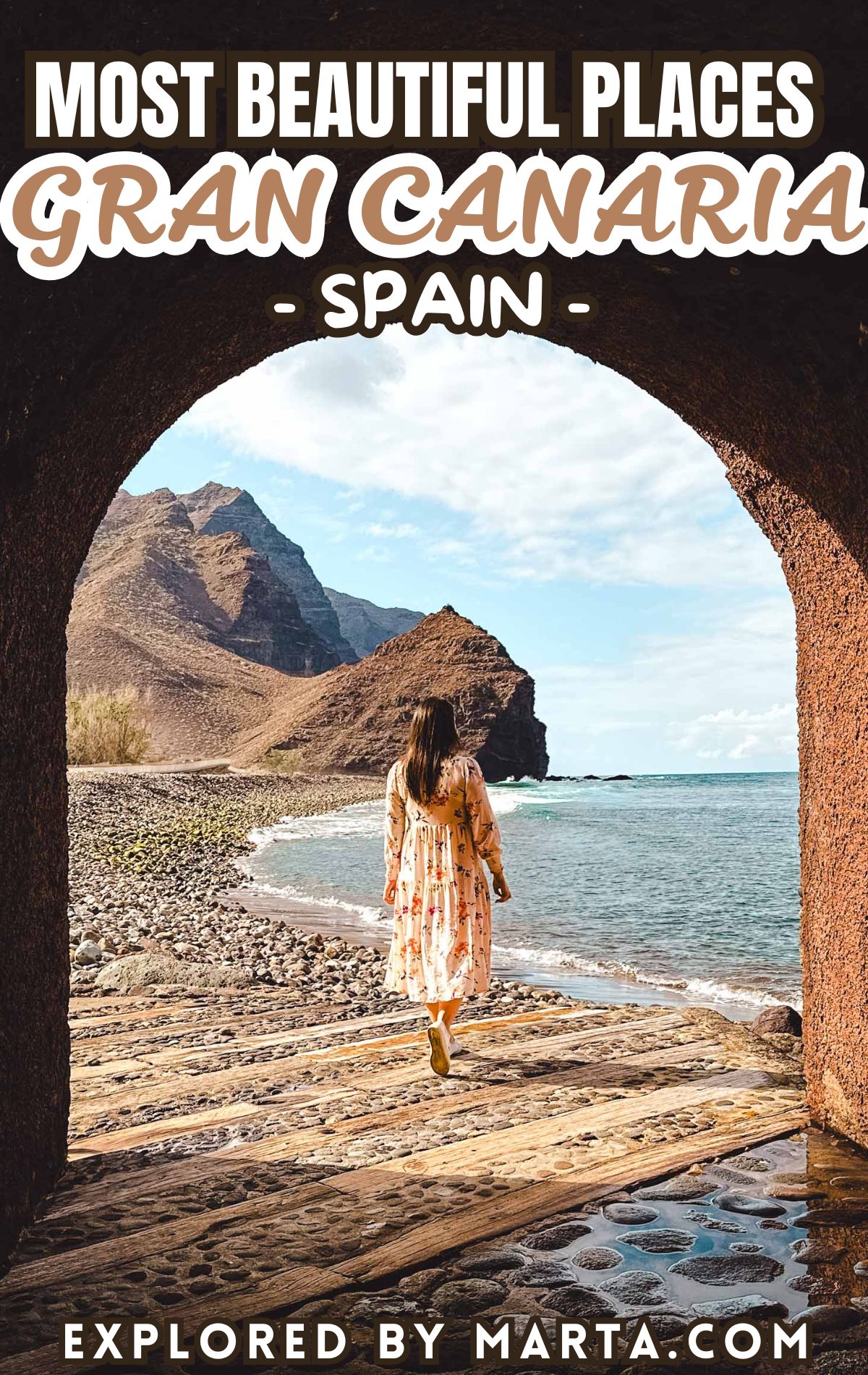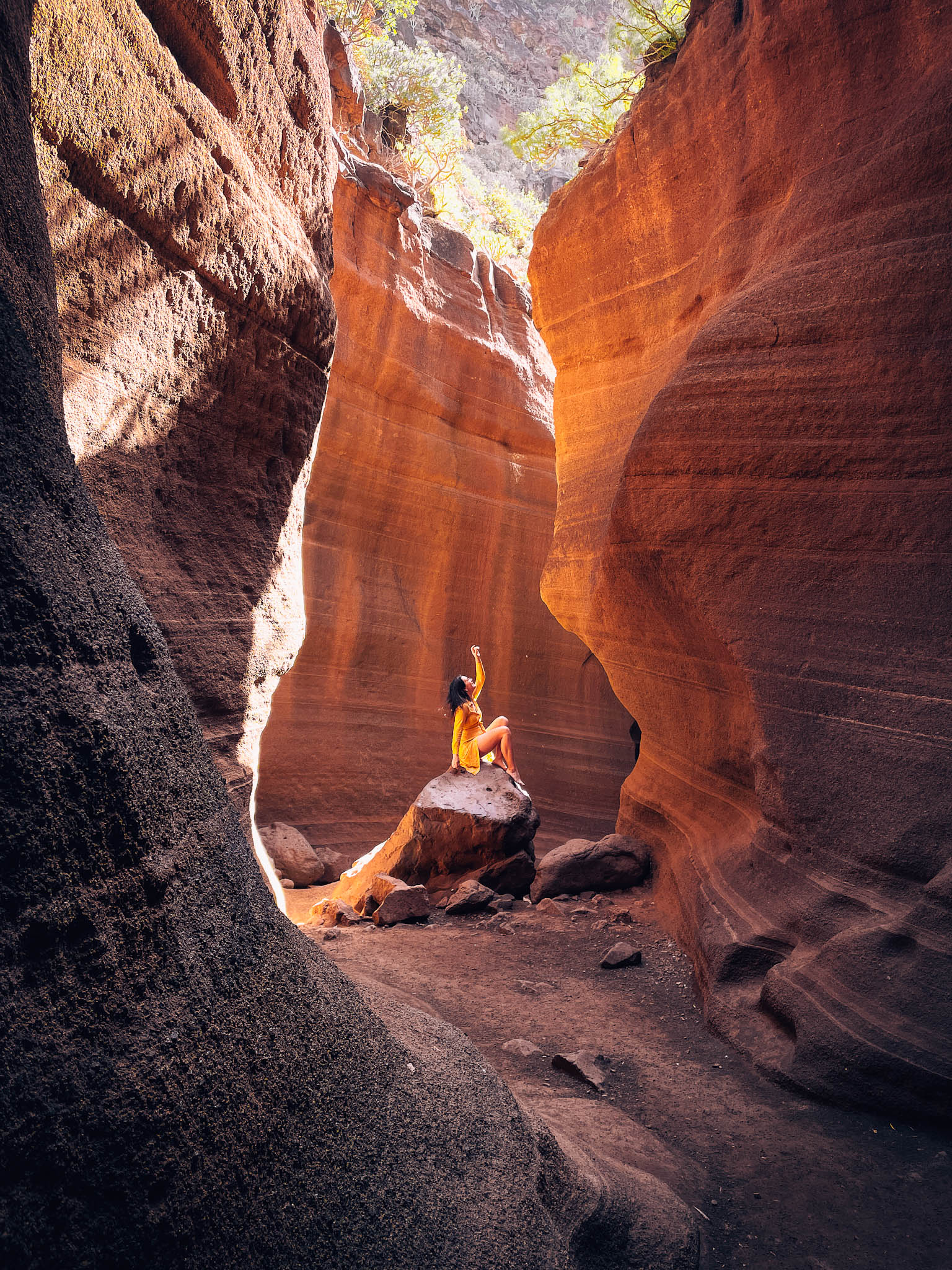21 most beautiful places in Gran Canaria, Spain
This post may contain affiliate links. If you use these links to buy something I may earn a small commission at no extra cost to you! Thank you for your support!
Let me share with you the most beautiful places in Gran Canaria, Spain! From panoramic viewpoints to charming villages, and natural wonders – I explored it all and included it in this list for you!
Gran Canaria is one of the eight inhabited Canary Islands—and definitely one of my favorites! It is often called a ‘miniature continent’ because you can find incredibly diverse landscapes and nature on this island.
After spending several months living in Gran Canaria, here’s my guide to the most beautiful places in Gran Canaria complete with detailed descriptions, photos, and Google Maps locations for each spot. I hope you enjoy this island as much as I did!
1. Rainbow Rocks: Los Azulejos de Veneguera


Los Azulejos de Veneguera, often referred to as Gran Canaria’s Rainbow Rocks, is one of the most unique and beautiful places in Gran Canaria, where you can admire a large multicolored mountain proudly displaying its vibrant colors.
This area is called ‘Fuente de los Azulejos,’ which translates to ‘Fountain of Tiles.’ For some, these colorful rocks resembled decorative ceramic tiles commonly used in Spanish, Portuguese, and Moorish design so the name of the place was born.
The rocks are located in the southwest of Gran Canaria, and you can easily reach this place by car or by bus. There are many parking places along the road where you can leave your car and go admire the rainbow rocks up close.
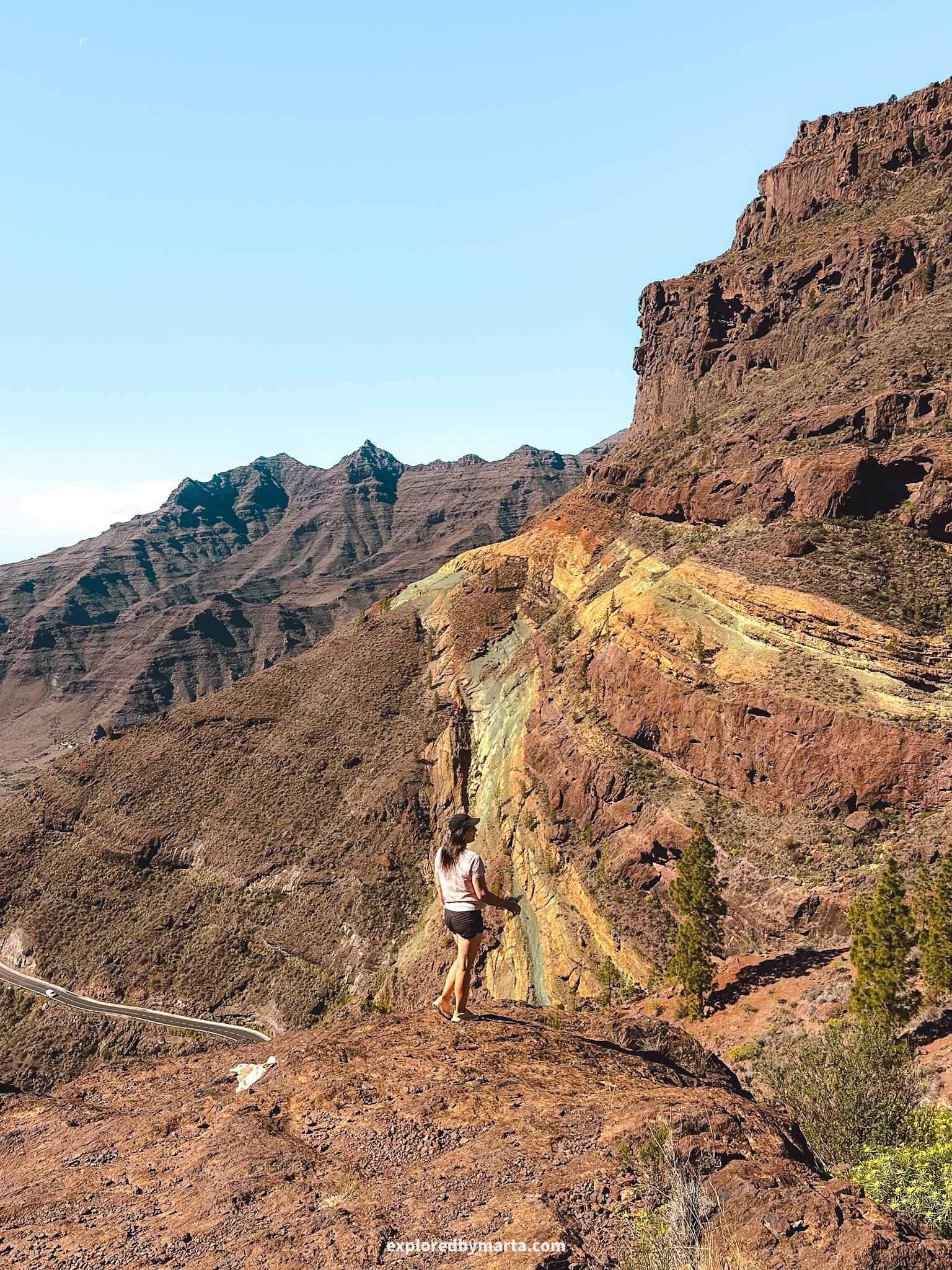
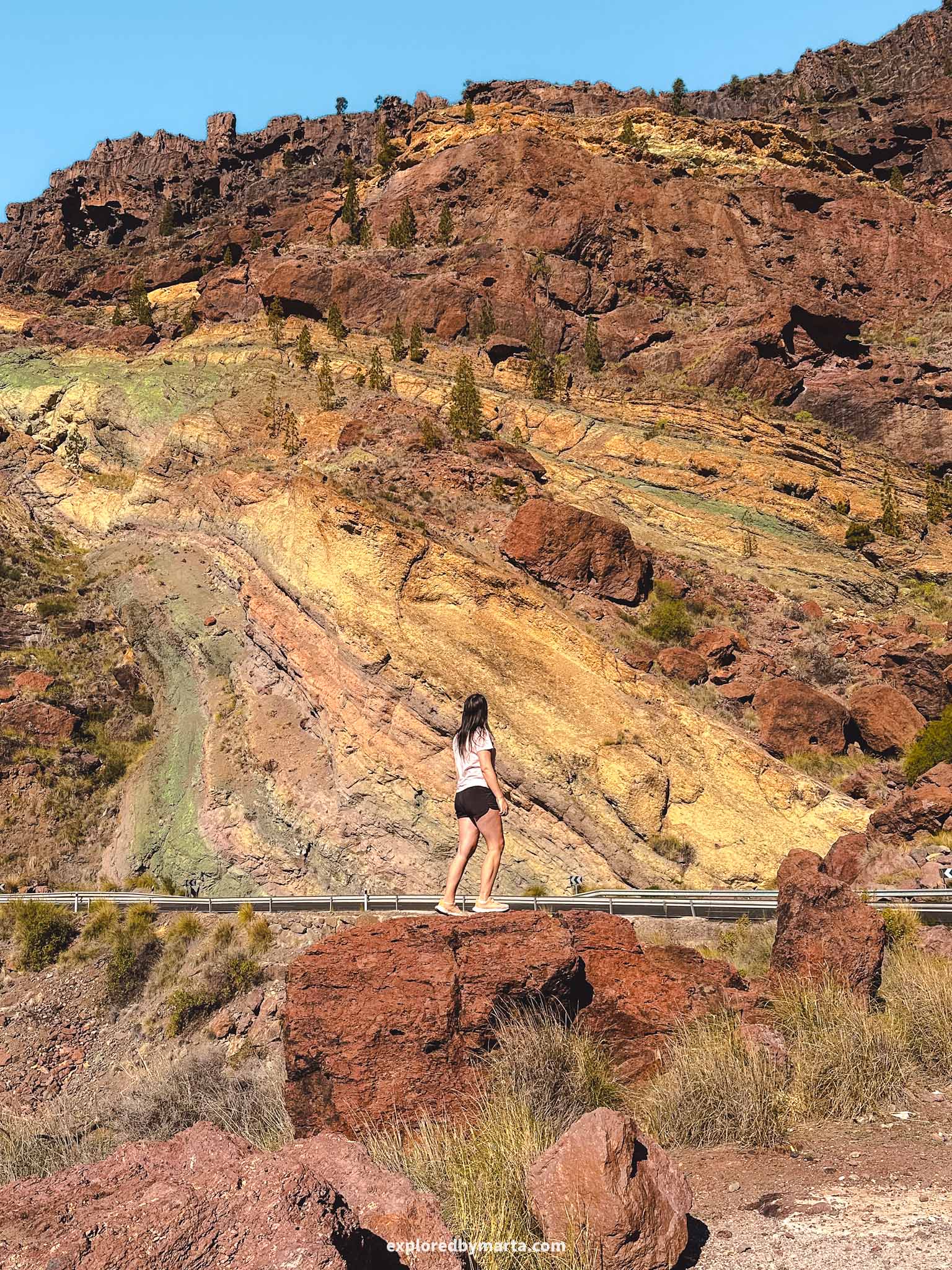
Personally, I really enjoyed the view of the rainbow rocks from a distance, where you can see the entire mountain, so we stopped by the road before reaching the rocks to take some cool photos.
But why are the rocks colorful? The mountains were formed millions of years ago during volcanic eruptions, and the area is composed of various minerals. As a result of oxidation and other chemical reactions, these minerals each have a different color.
If you feel up to it, there is a wonderful 7-kilometer hike in this area, taking you up to the top of the mountain, around the rocks, and then back down the mountain to the starting point near the rocks. Los Azulejos hike was one of my favorite ones we did in Gran Canaria!
Location: Los Azulejos de Veneguera
2. Little Venice Neighborhood in Puerto de Mogán
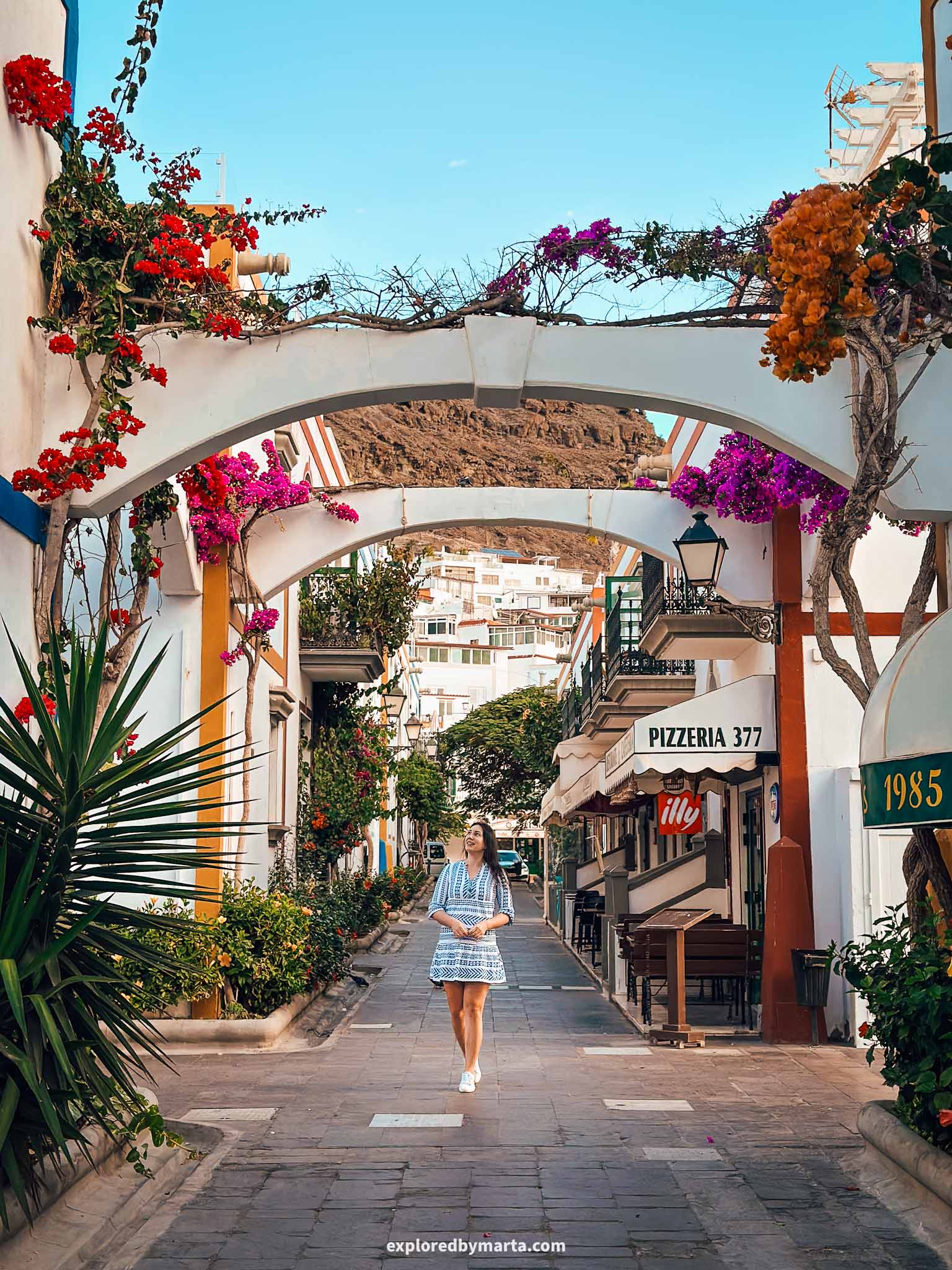

Puerto de Mogán is one of the most beautiful villages in Gran Canaria, especially its iconic port neighborhood, known for its canals, colorful buildings, and boats. That’s why it is called ‘Little Venice,’ as it resembles the famous city in Italy.
Puerto de Mogán was once a peaceful fishing village in the South of Gran Canaria but over the last decades, it has grown into a popular tourist resort town.
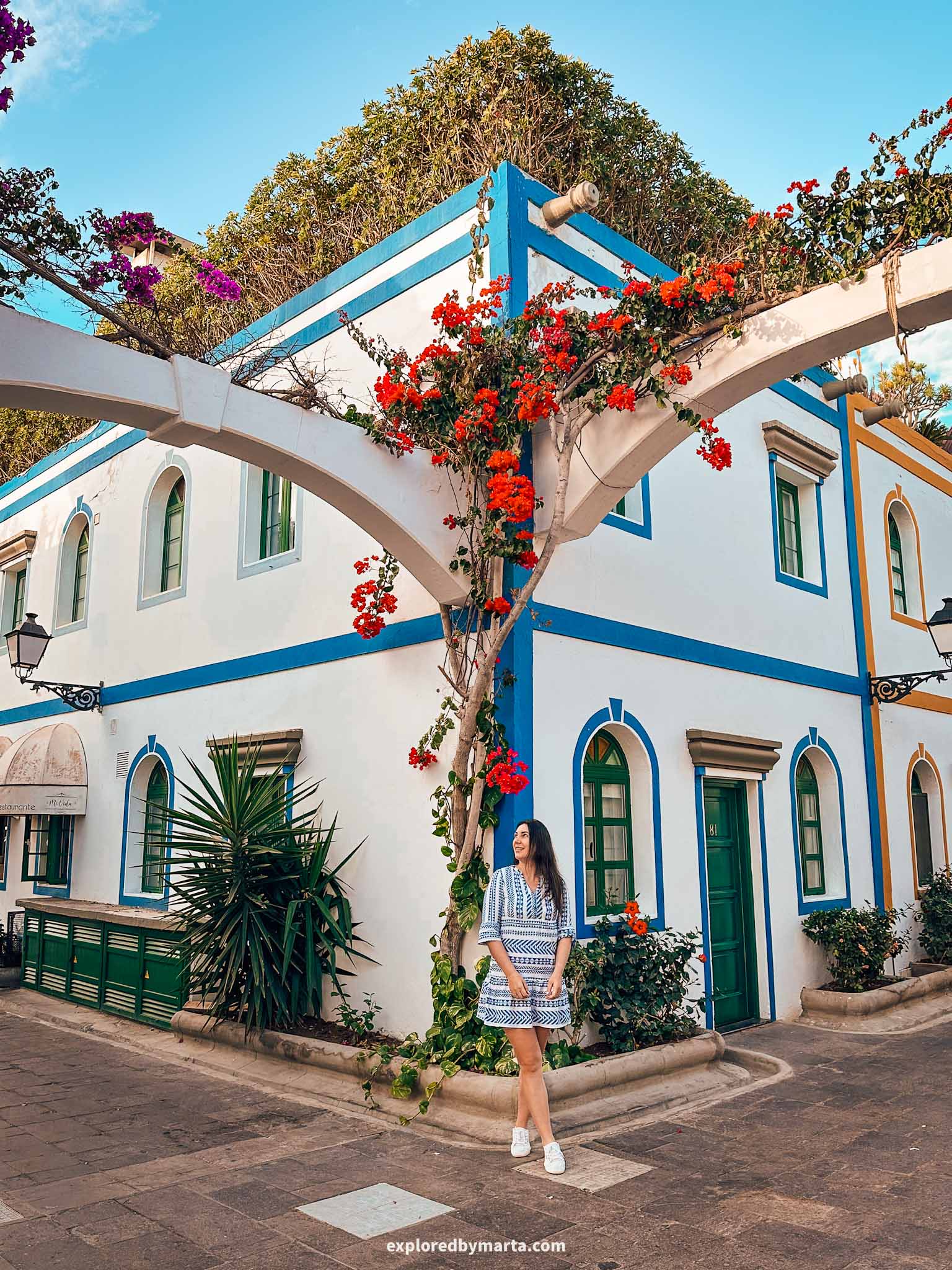

Even if you are not staying in Puerto de Mogán, visiting Little Venice should be on your Gran Canaria bucket list. I loved strolling through the narrow streets lined with whitewashed, colorful houses, all decorated with bougainvillea and potted plants!
The colorful streets adorned with flowers create the perfect photo spot in Gran Canaria. For the best photos, I recommend arriving earlier in the day to avoid the crowds. It gets very busy once the masses wake up and hit the streets.

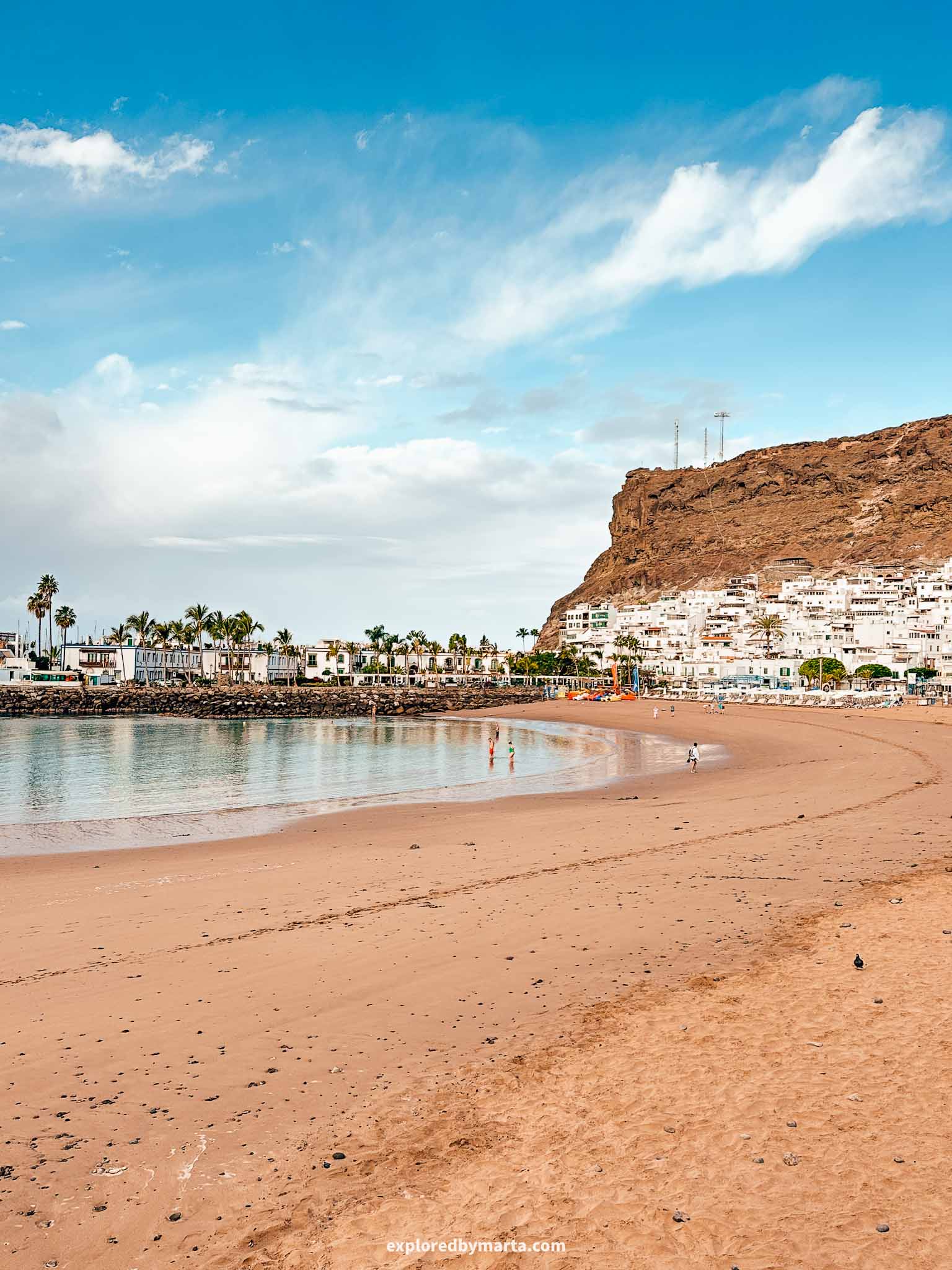
If you’re traveling by car, there is a paid parking lot right next to the entrance to Little Venice. However, the space is very limited, so the earlier you arrive, the better your chances of finding a parking spot and taking cute photos without the crowds!
Puerto de Mogán is also the perfect place to spend time at the beach—there’s a gorgeous golden-sand beach right in the heart of the town. Or you can enjoy a relaxing lunch by the waterfront. There are plenty of great restaurants in the port area by the water!
Location: Puerto de Mogán
3. Mirador del Balcón
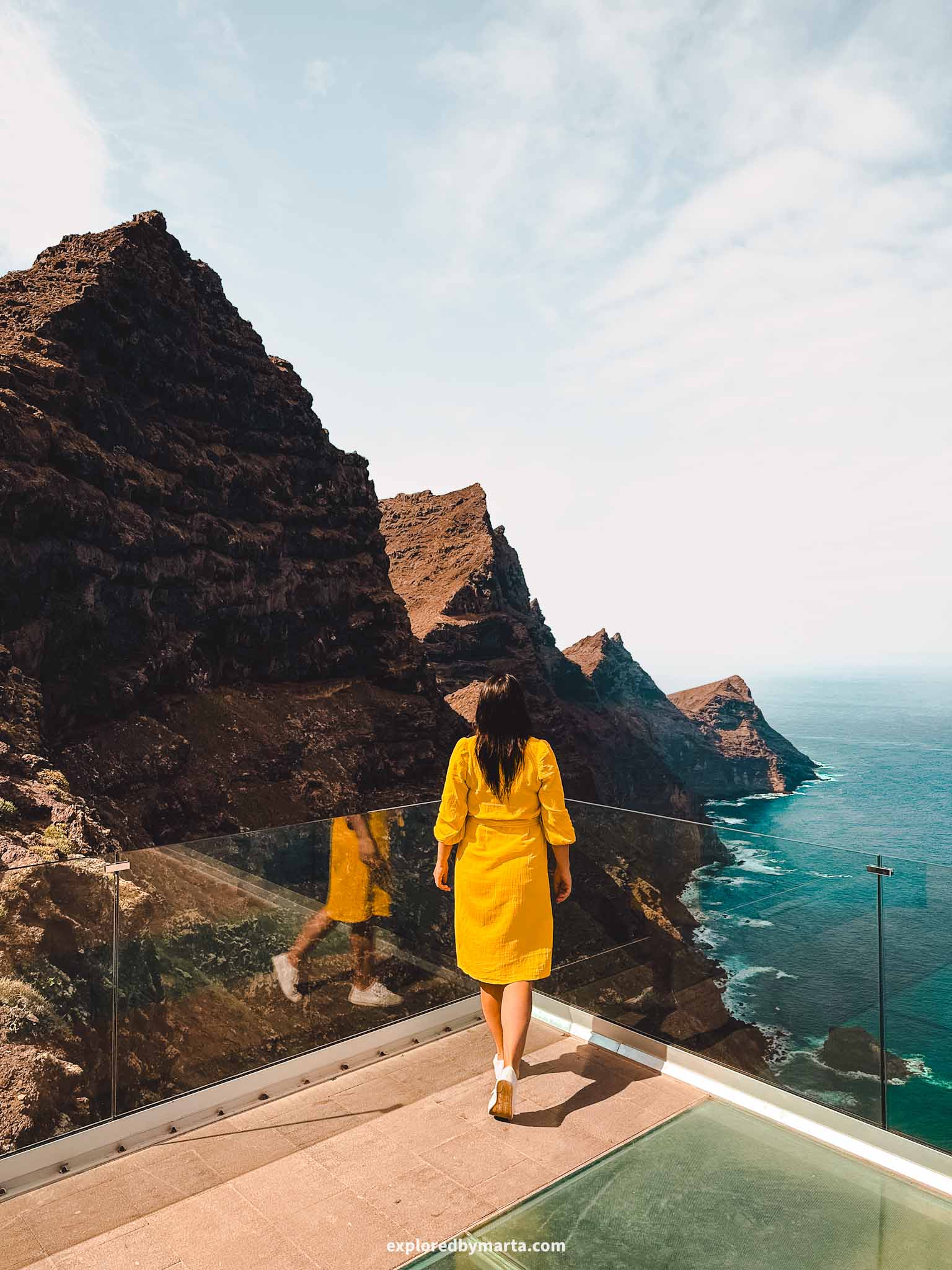
Mirador del Balcón is probably the most famous of all the viewpoints in Gran Canaria. Located on the West coast, the island’s most dramatic coastline, this viewpoint attracts many travelers with its iconic, breathtaking scenery.
The road to get there is slow and challenging, but that hasn’t stopped road-trippers and even tour buses from traveling to this scenic spot! Despite its popularity, we managed to catch a moment alone there.
So, what makes this place so unique? Mirador del Balcón is a man-made glass platform perched on a cliffside, hundreds of meters above sea level. But the real highlight is the view.
Mirador del Balcón offers you a view of the rugged coastline and the jagged rock formations known as the Dragon’s Tail, named for their resemblance to the spiked back of a dragon. This place is a must-visit in Gran Canaria!
Location: Mirador del Balcón
4. Dunas de Maspalomas

Dunes of Maspalomas is a vast area of golden sand dunes in Maspalomas town in the South of Gran Canaria. It is one of the island’s more iconic natural landmarks! If I had to guess, I’d say that almost every traveler to Gran Canaria visits this unique place!
I was truly surprised that such a desert-like landscape could be found on an island that was formed by volcanic eruptions. But nature is full of wonders!


The dunes is a protected area, a special nature reserve, so if you want to walk around the dunes, you should do so using the designated walking trails.
The best places to see the sand hills are two viewpoints inside Maspalomas at Mirador de las Dunas or Mirador Dunas Santa Mónica. The view will be especially spectacular at sunset when the sand is glowing in golden hues.
If you feel ready for a beach walk, then another option is to see the dunes from the beach. You can either walk from Playa del Inglés or from Playa de Maspalomas/Maspalomas Lighthouse until you reach the sand hills.
Location: Dunas de Maspalomas
5. Cathedral of Arucas

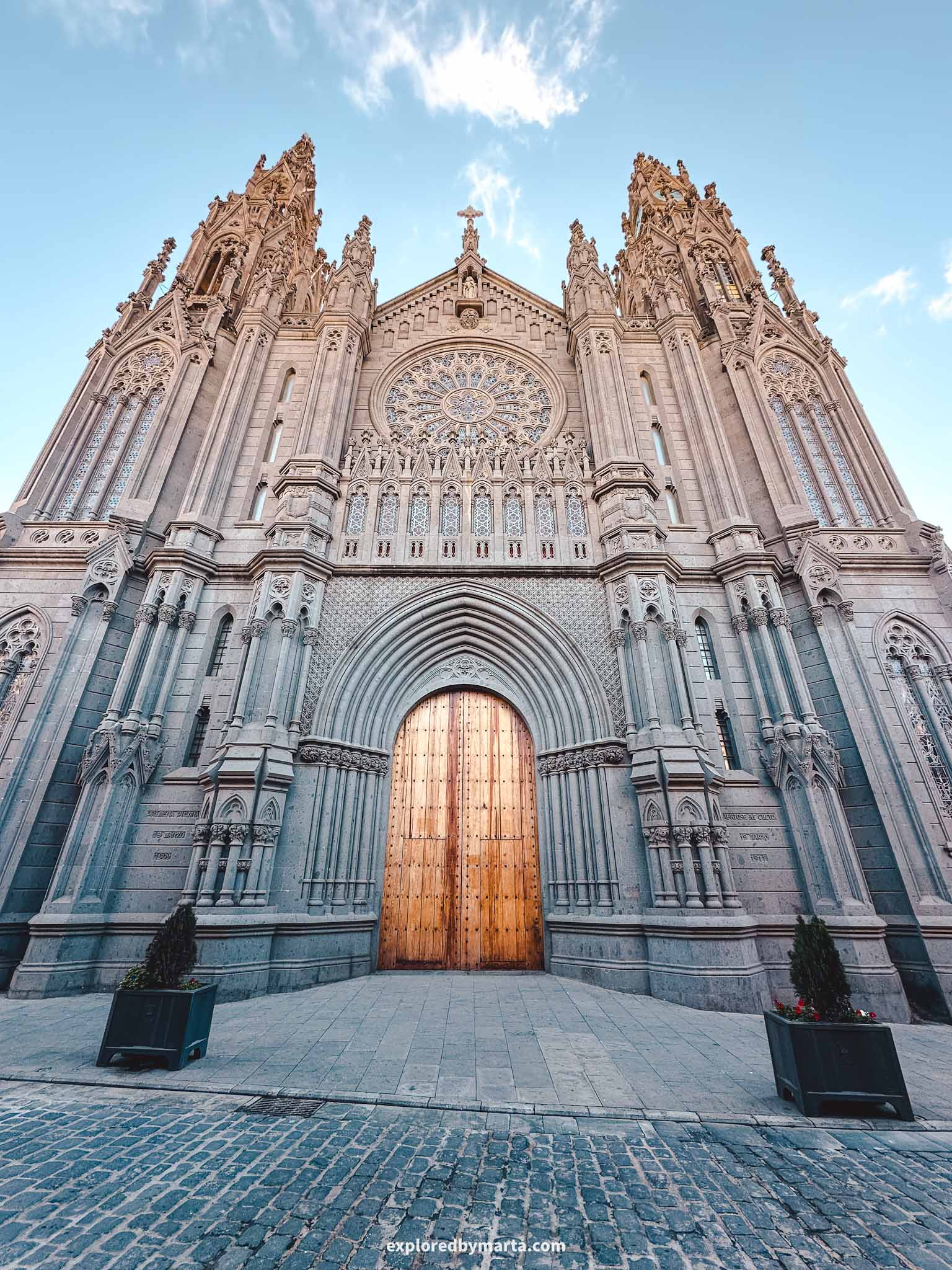
The gorgeous Church of San Juan Bautista in Arucas town is one of the most emblematic buildings you will find in Gran Canaria. It is amongst my favorite places we visited on the island!
Although it is a church, due to its majestic size and eccentric exterior, it is commonly referred to as the Cathedral of Arucas. I think this name describes the building much better, right?
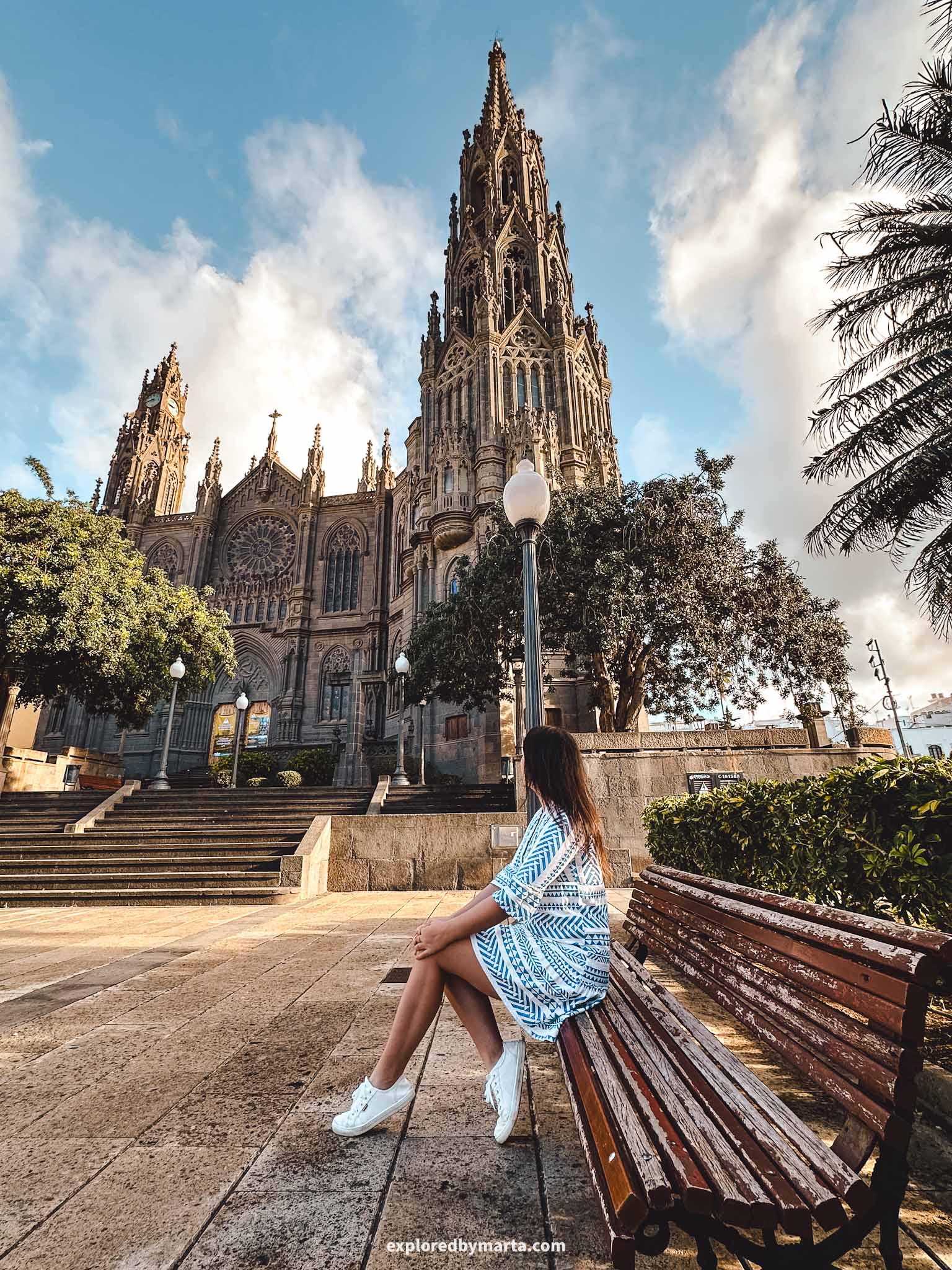
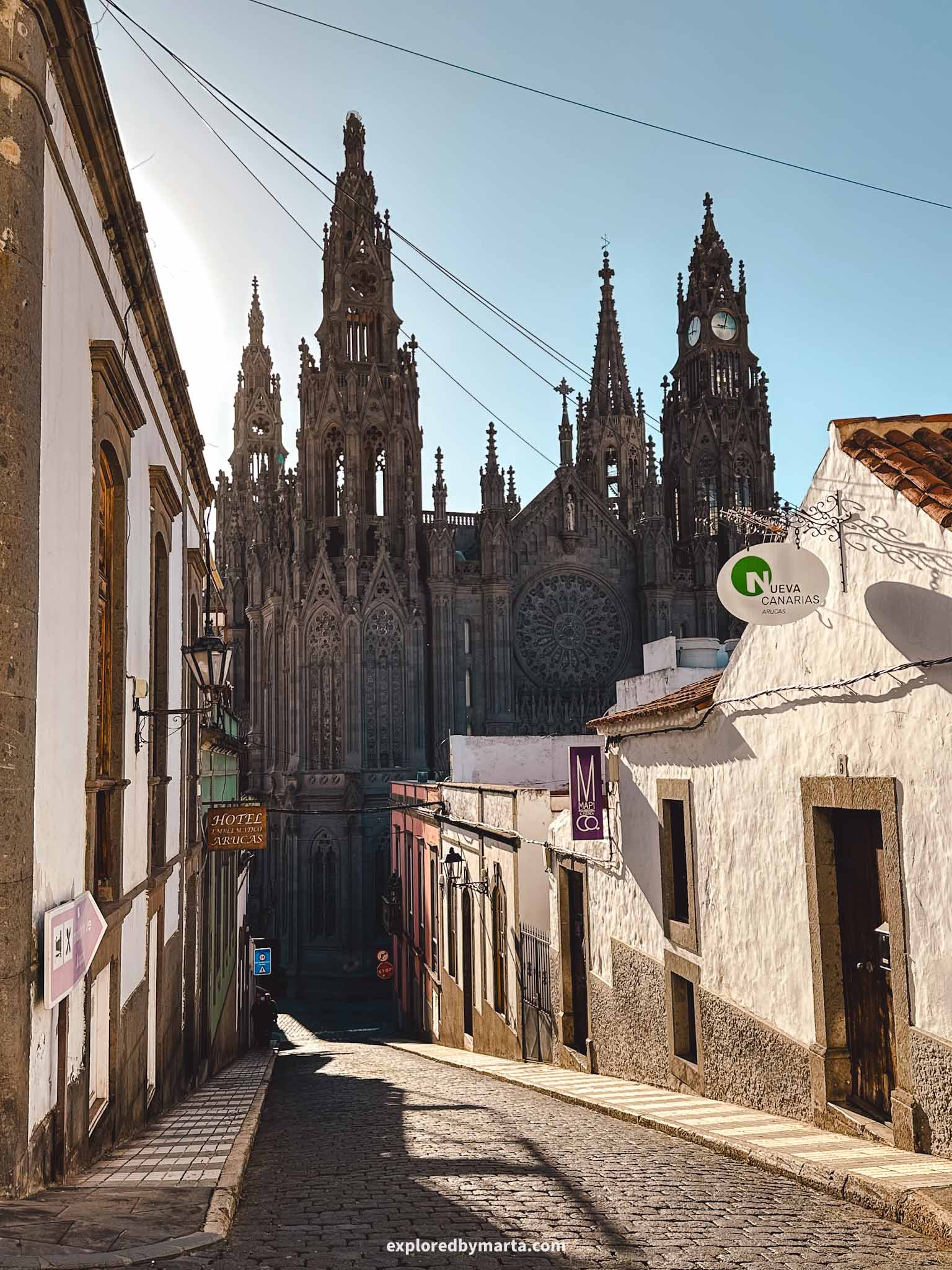
The stunning neo-Gothic church was built between 1909 and 1977 using local stones of volcanic origin. At first, I thought the church looked a bit ‘dirty’ but it’s the volcanic rocks that give it this tone.
I absolutely loved this charming town. There is a large parking lot right next to the church where you can leave your car and then easily walk around the historic center on foot.

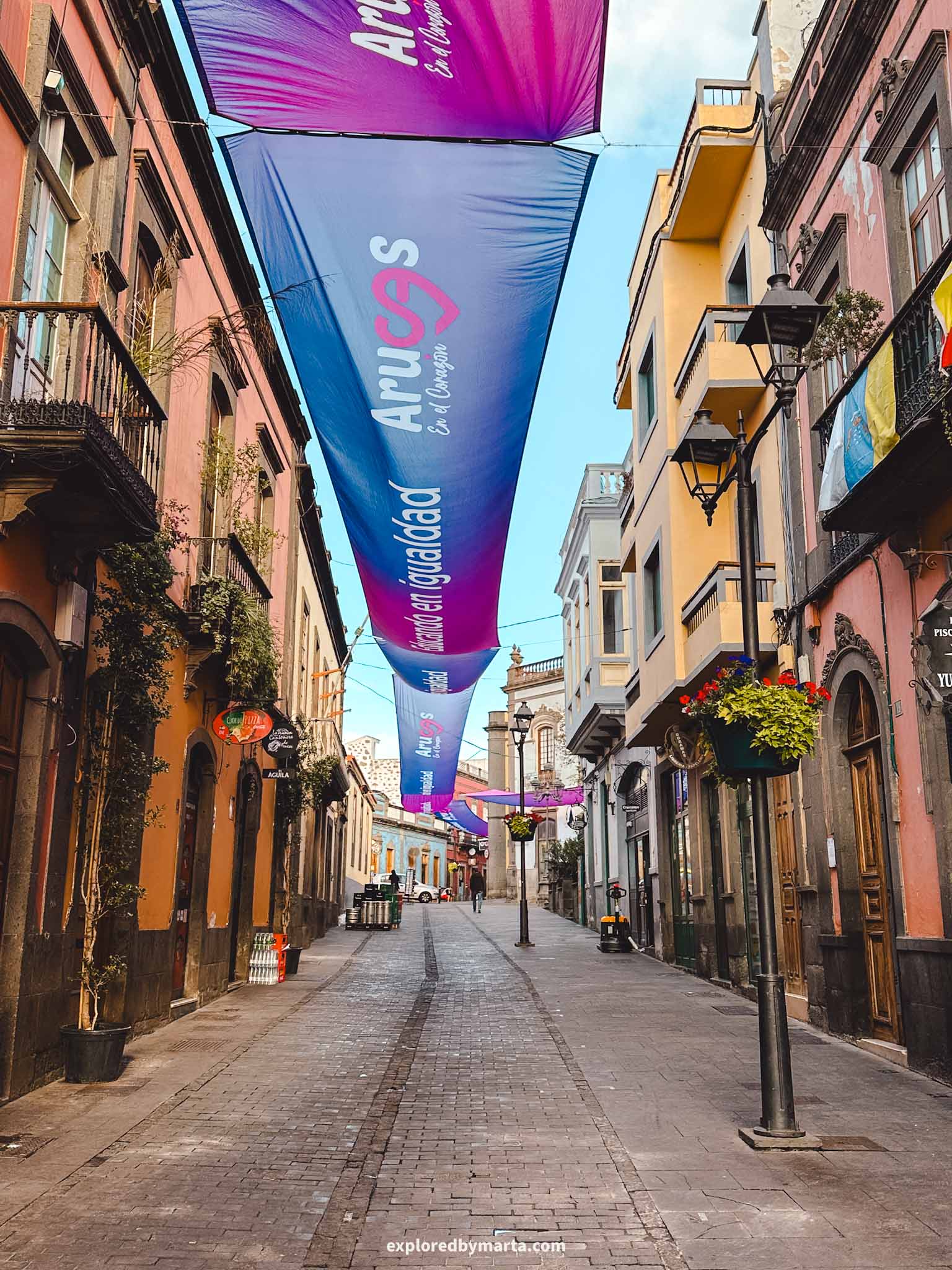
Arucas is known for its well-preserved colorful colonial-style streets and traditional architecture as well as its banana plantations and long-standing rum production industry.
Overall, I highly recommend including this charming town in your Gran Canaria road trip itinerary! Even if you can only stop for an hour or two, it’s enough to admire the church and soak in the special charm of a traditional Spanish colonial town.
Location: Parroquia de San Juan Bautista de Arucas
6. Puerto de La Aldea
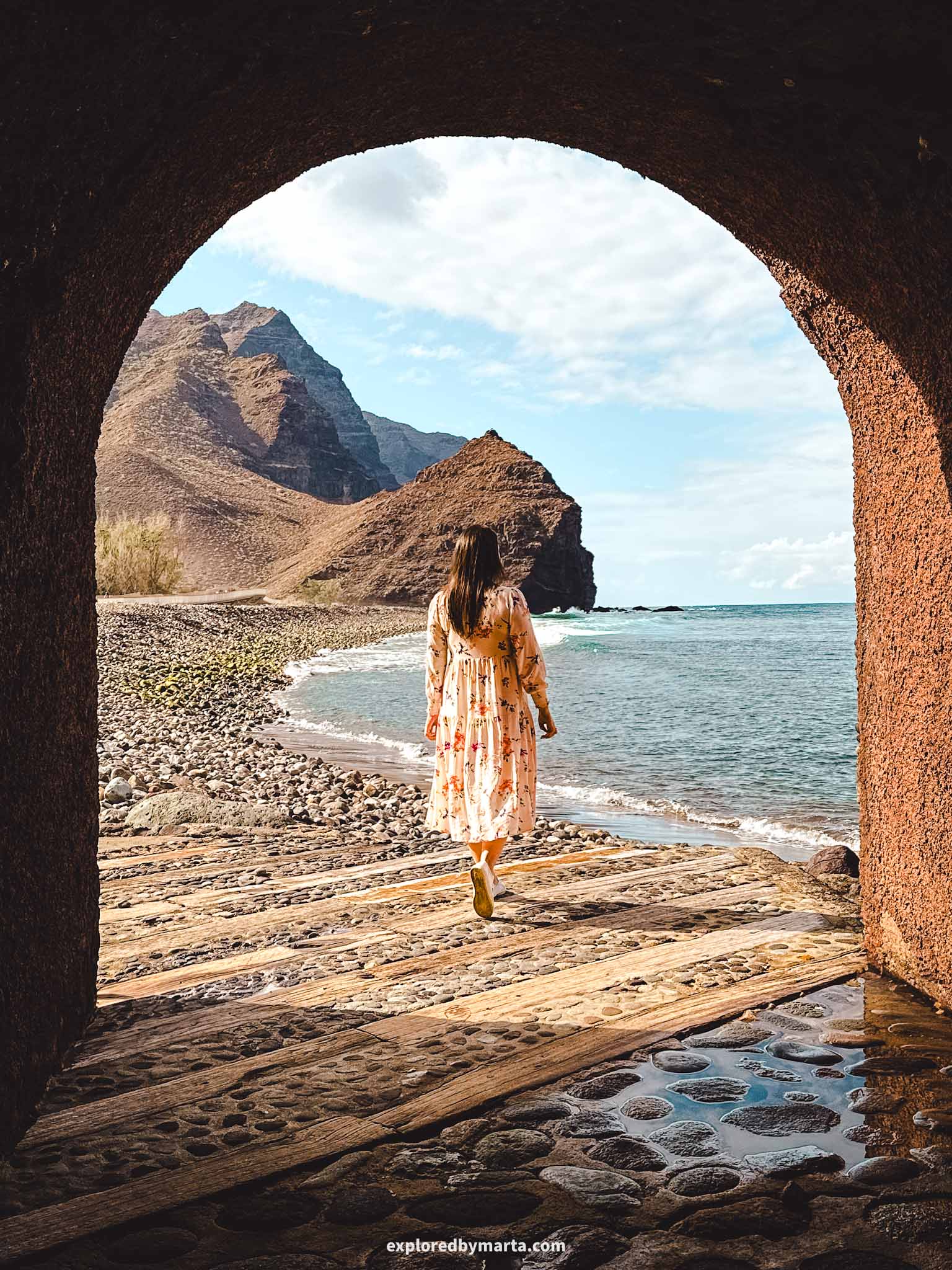
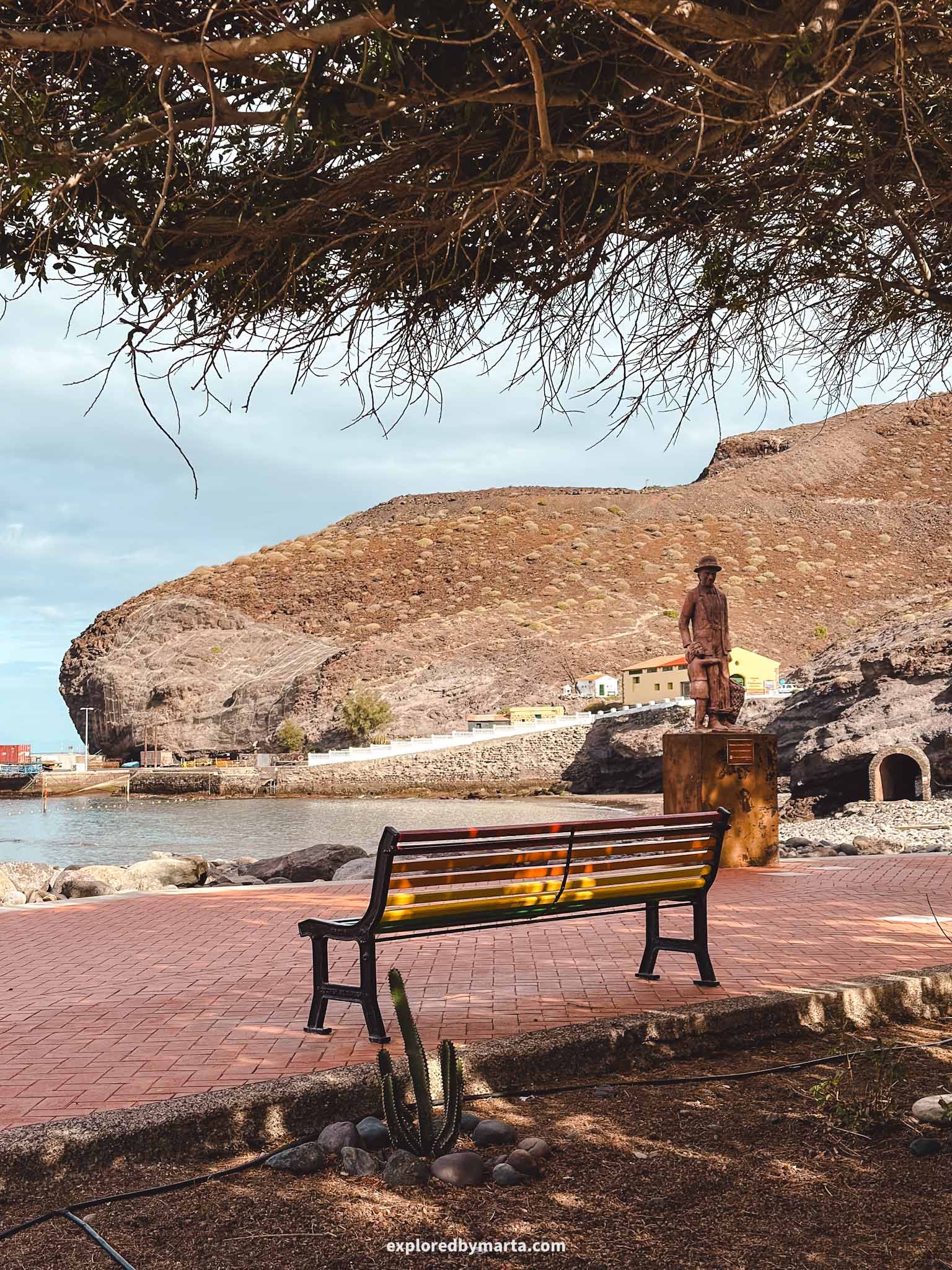
Puerto de la Aldea is a small, traditional fishing village on the west coast of Gran Canaria, known for its laid-back vibe and stunning coastal views.
The village features a wide pebble beach, a beautiful seaside promenade, a natural rock swimming pool called Charco de la Aldea, and a scenic fishing pier with views of the dramatic cliffs surrounding the beach.
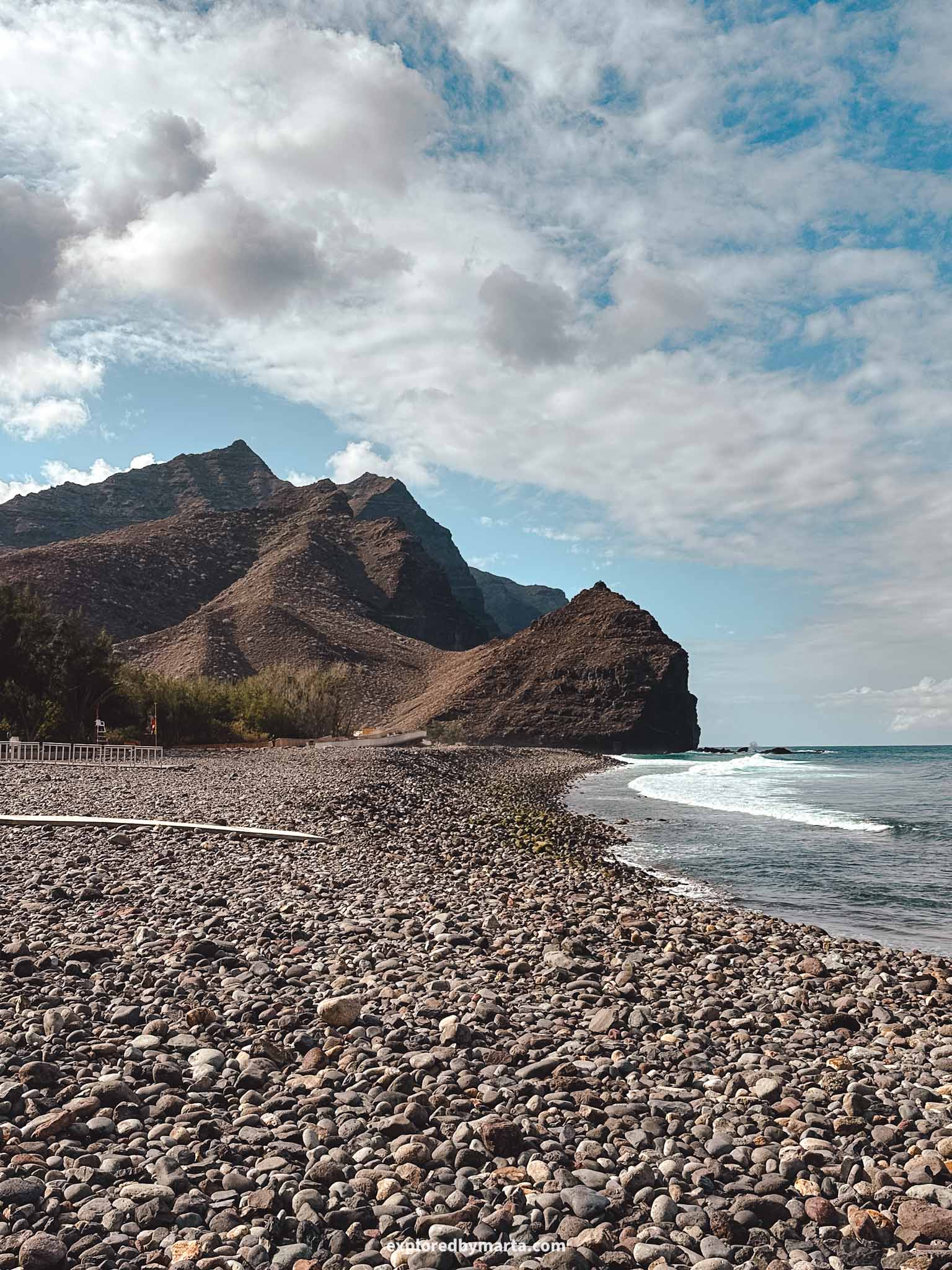
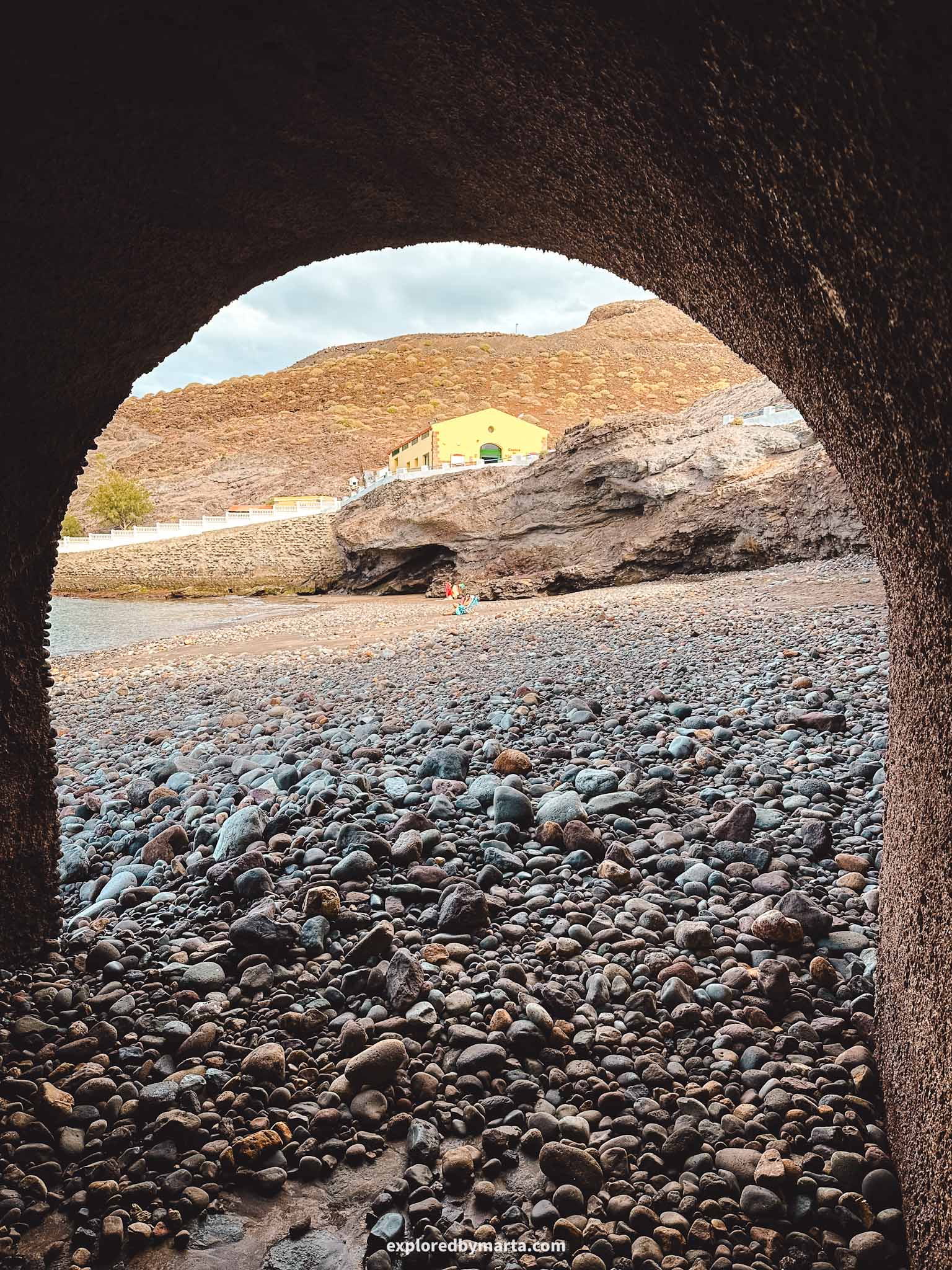
Puerto de la Aldea is one of my favorite hidden gems in Gran Canaria, and the fact that there isn’t much to do in the village makes me love it even more. It’s simply a peaceful escape, far removed from the touristy areas in the south.
There are two beaches in the village, separated by a large rock. To access both, a pedestrian tunnel has been built through the rock, creating a picture-perfect frame for the dramatic coastline views. The perfect photo spot, if you ask me!
Location: Puerto de La Aldea
7. Barranco de las Vacas
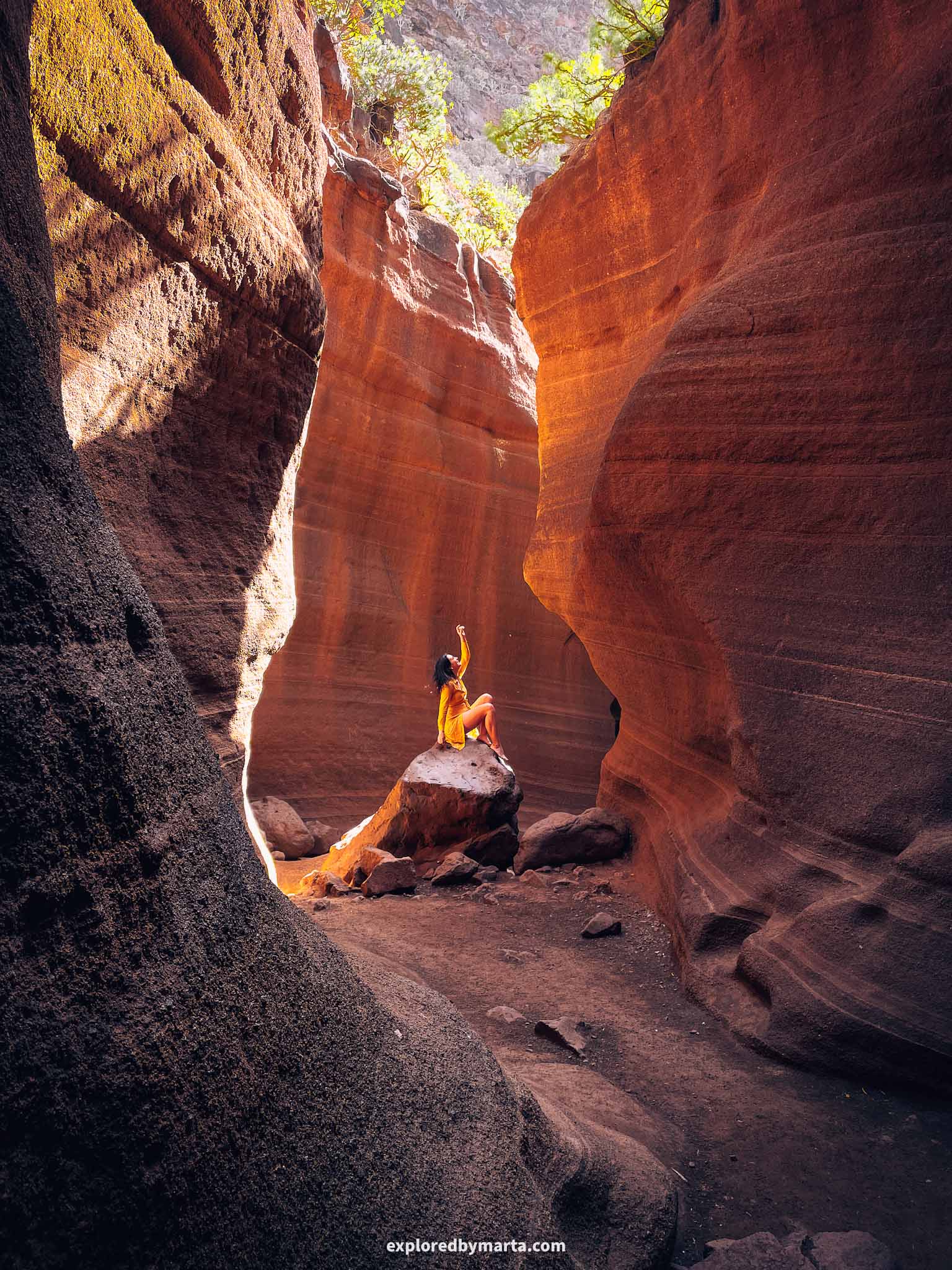
Barranco de las Vacas is one of the most unique and beautiful places in Gran Canaria. It is a narrow ravine with wave-like sandstone walls in golden and rust colors that resemble the famous Antelope Canyon in the United States.
Although Barranco de las Vacas slot canyon is really small and short (like 100 meters short!), it has become one of the most sought-after hidden gems in Gran Canaria.
Just like other canyons, Barranco de las Vacas was formed by erosion, wind, and rain over the period of thousands of years.
You can get to Barranco de las Vacas by car, leaving it at the side of the road. From there, you can either take a path leading directly into the valley from the parking area or you can walk along the road and then scramble down into the riverbed from the bridge.
If you’re traveling with kids or don’t have sturdy shoes, I recommend taking the path from the parking area, as it is not as steep as the walls next to the bridge.
After you reach the riverbed, you need to go through the tunnel under the bridge and follow the riverbed uphill. The photo-perfect place with the narrow part of the canyon is just 100 meters from the bridge, so it is a very short hike and quite easy to reach.
Overall, I absolutely love this unique place in Gran Canaria and highly recommend visiting it. Come in the morning for the most tranquil experience.
However, visitors come and go quickly throughout the day—it’s just a short stop! So, you can still find a moment without crowds inside the canyon during the day as well.
Location: Barranco de las Vacas
8. Roque Nublo
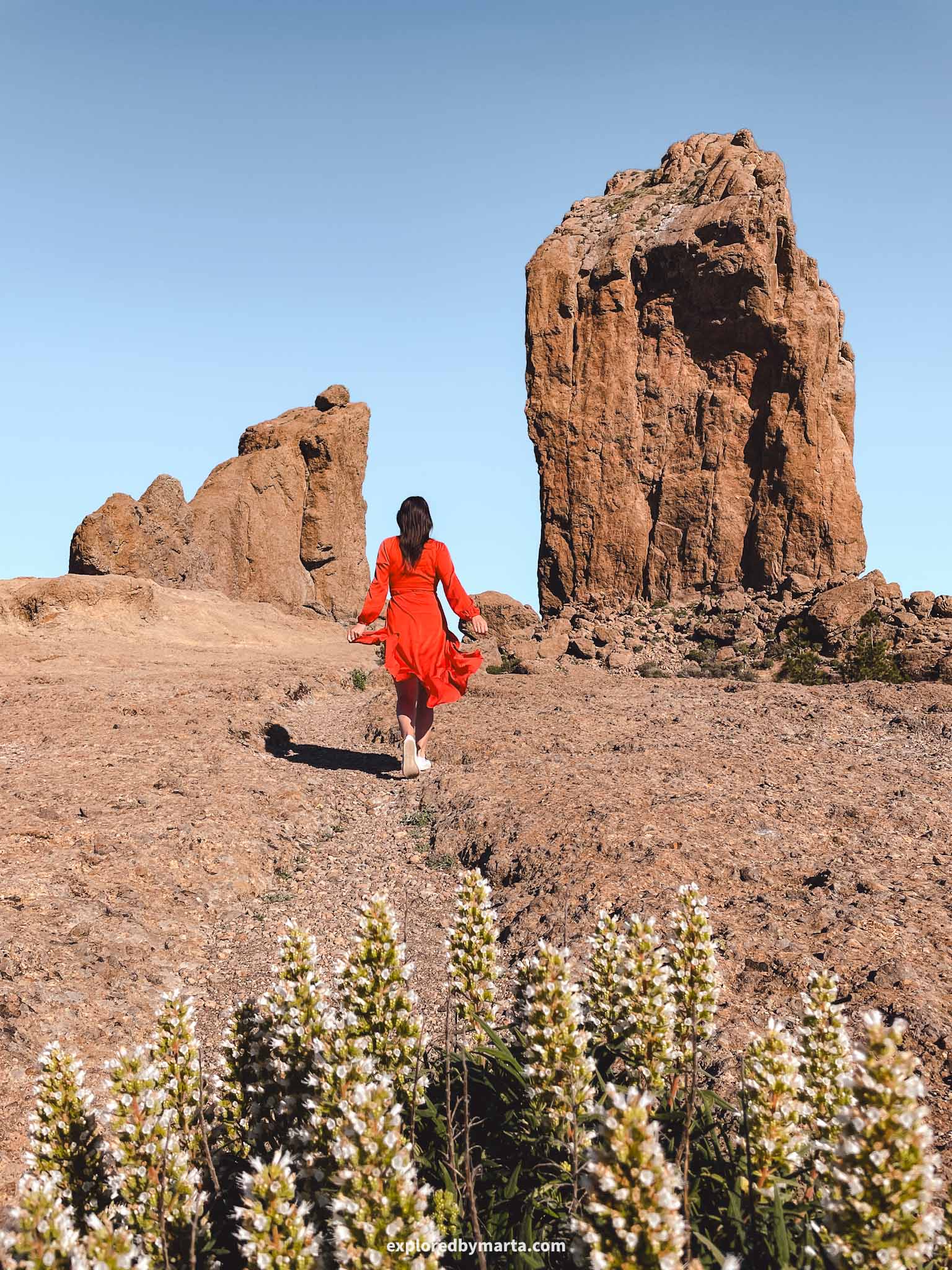
Roque Nublo is a massive volcanic rock formation in Gran Canaria that formed during an eruption millions of years ago. It is a symbol of the island and is easily one of the most beautiful places in Gran Canaria.
The name Roque Nublo translates to “Cloud Rock” in Spanish. The massive rock itself is 80 meters tall and sits at 1,803 meters above sea level, making it the third-highest peak in Gran Canaria. Trust me, it feels like the whole island is at your feet!
I have visited Roque Nublo many times— in the morning, during the day, and at sunset. Each time of day offers a unique perspective and view of Gran Canaria. On a clear day, you can even see Teide volcano on the island of Tenerife!


Getting to Roque Nublo requires a hike.
The shortest and most popular route (1.3 km one way) starts from Road GC-600 but you need to obtain a free permit to walk to Roque Nublo from this checkpoint during the day (from 9:00 to 17:00). No need for a permit outside these hours.
Also, you can’t park your car at the starting point. Instead, you can leave it at one of the nearby campsites (Bailico or Llanos de la Pez) and add a few extra kilometers to your hike, or take a public bus (see ‘Guaguas’), which will take you directly to the starting point.
For other hiking options to Roque Nublo, I recommend a 3-kilometer hike (one way) from Presa de Elba. There are a few parking spots next to the bus stop, and the trail takes you along the water reservoir and up to Roque Nublo.
Location: Roque Nublo
9. Paseo de Canarias in Firgas, the Village of Water

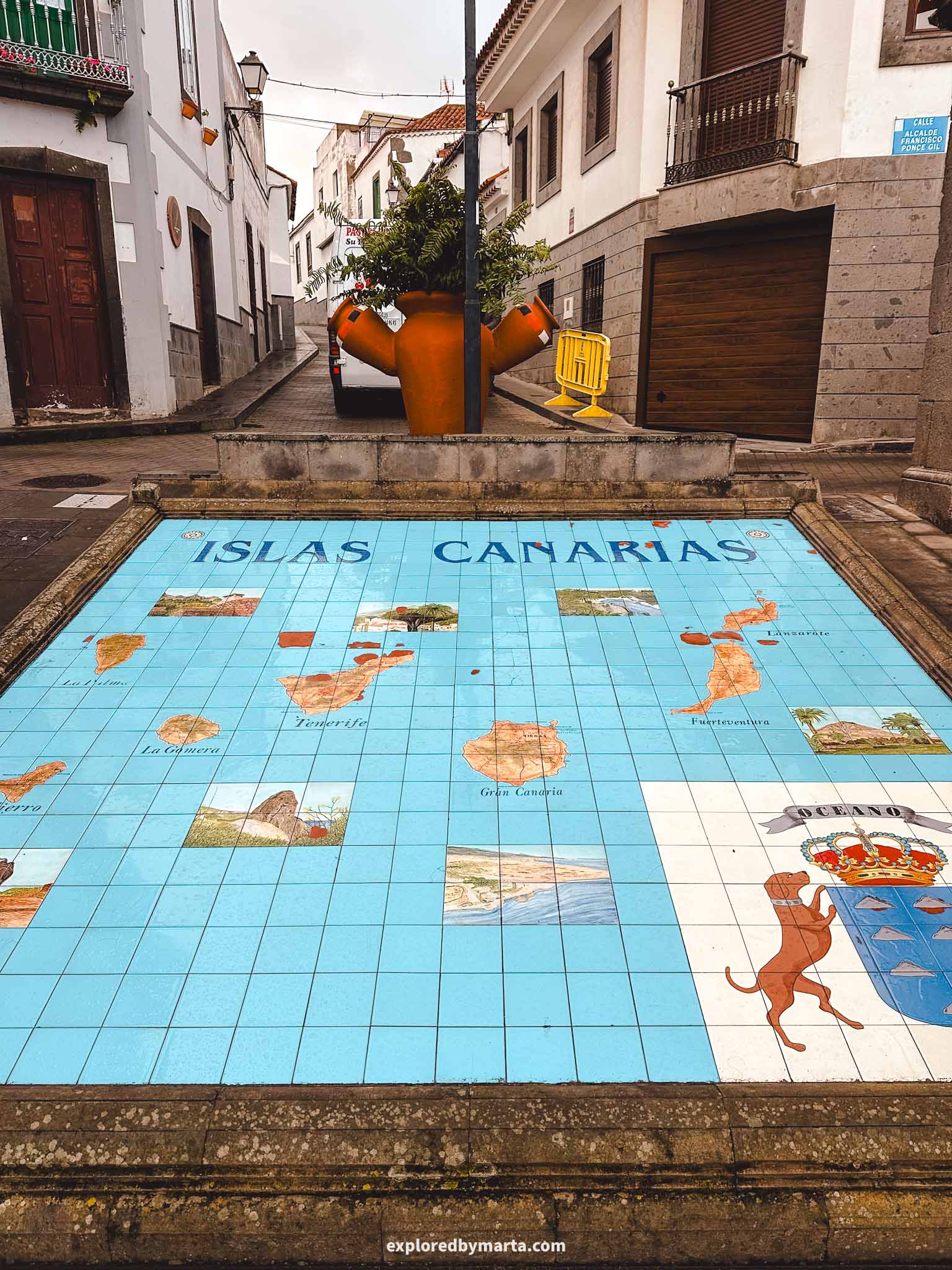
Firgas is a charming village in northern Gran Canaria more widely known for its bottled mineral water with the same name as the village. That’s why it is often referred to as the Village of Water.
Firgas is also home to one of the most beautiful places in Gran Canaria – Paseo de Canarias. It is a gorgeous pedestrian promenade in the heart of the village that is a must-see for every visitor to Gran Canaria.


The Paseo de Canarias promenade leads uphill and has two parts. The bottom part features a 30-meter-long waterfall and ceramic benches along the side of the street each bench displaying one of Gran Canaria’s municipalities.
The upper part of the Paseo de Canarias features large ceramic maps with 3D models of the seven Canary Islands – Tenerife, Gran Canaria, Fuerteventura, Lanzarote, La Palma, La Gomera, and El Hierro.
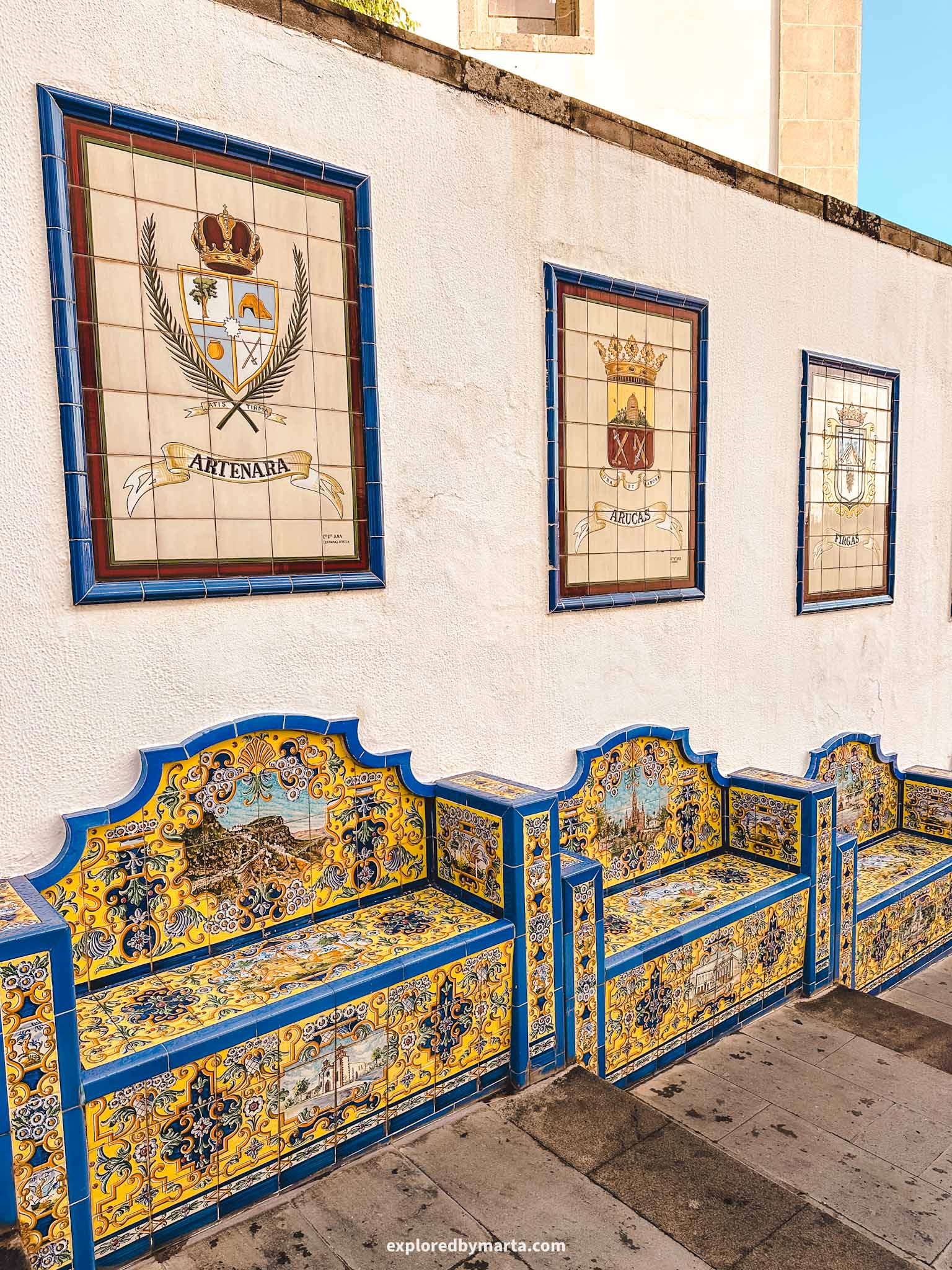
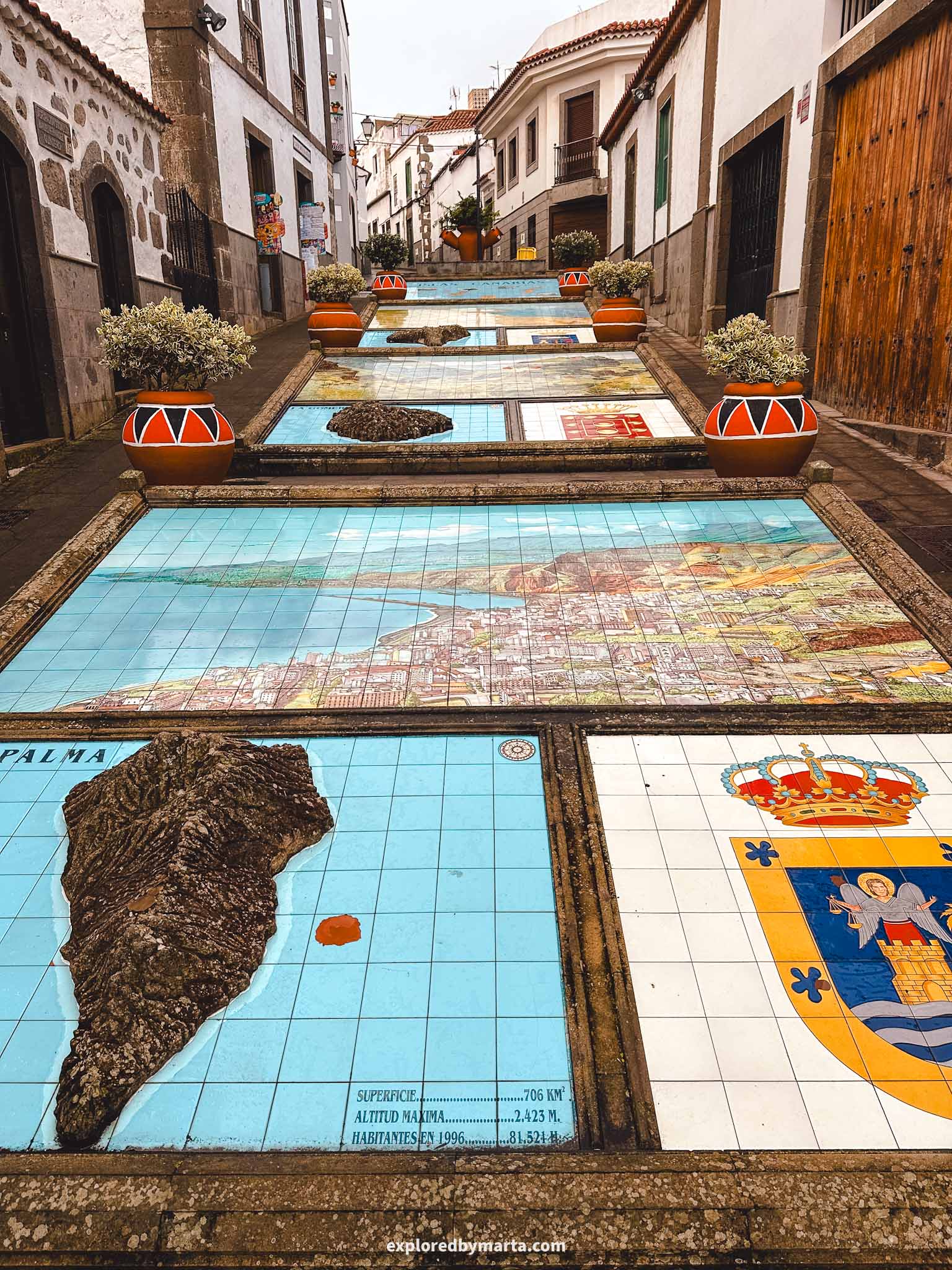
I’ve visited all of the Canary Islands, so I was really excited to check out the maps and relive the places we explored on each island. The maps are pretty detailed—you can actually spot some of the most iconic landmarks!
With its colorful tiles and waterfall, Paseo de Canarias is super photogenic. It definitely has some of the best photo spots in Gran Canaria, so I highly recommend stopping by this charming village if you’re doing a road trip to the north.
Location: Paseo de Canarias
10. Mountain village of Tejeda
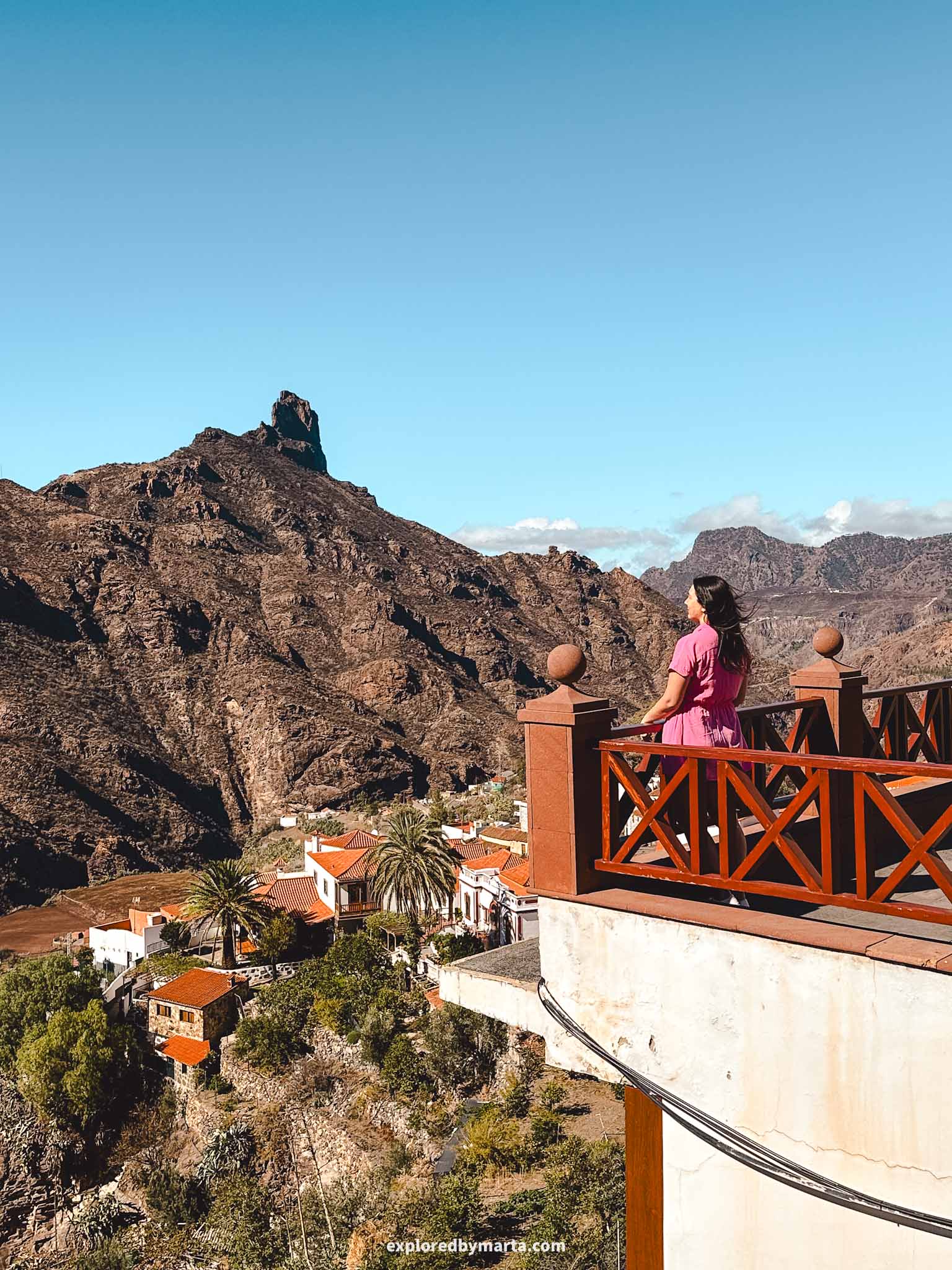
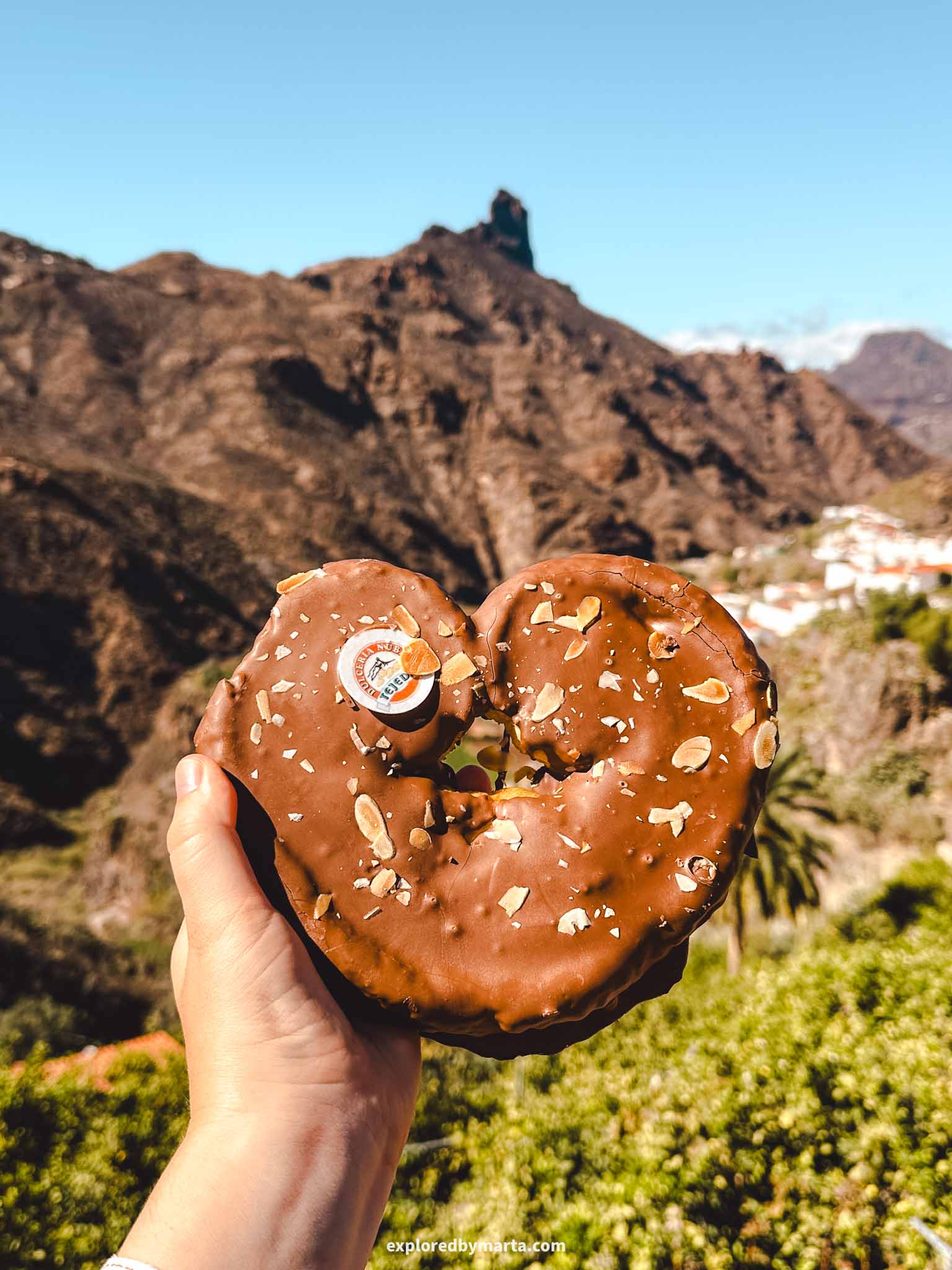
Oh, Tejeda! Nothing comes close to this charming oasis in the mountains! In my opinion, Tejeda is the most beautiful village in Gran Canaria!
Hidden in the mountains in the heart of the island, this village charms everyone with its serene surrounding landscapes, scenic views, and peaceful atmosphere—if you manage to avoid the midday crowds!


Visiting Tejeda is one of the top things to do in Gran Canaria, and I mean it for many reasons. First of all, it is part of a vast network of popular hiking trails in the mountains, so many hikers start hikes, finish hikes, or just pass through here during their hikes.
Second, it is a convenient stop to make during the head-turning road trip around the mountains of Gran Canaria. Third, Tejeda is famous for its pastries—trying one of the delicious palmeras and almond pastries from Dulcería Nublo is a must!
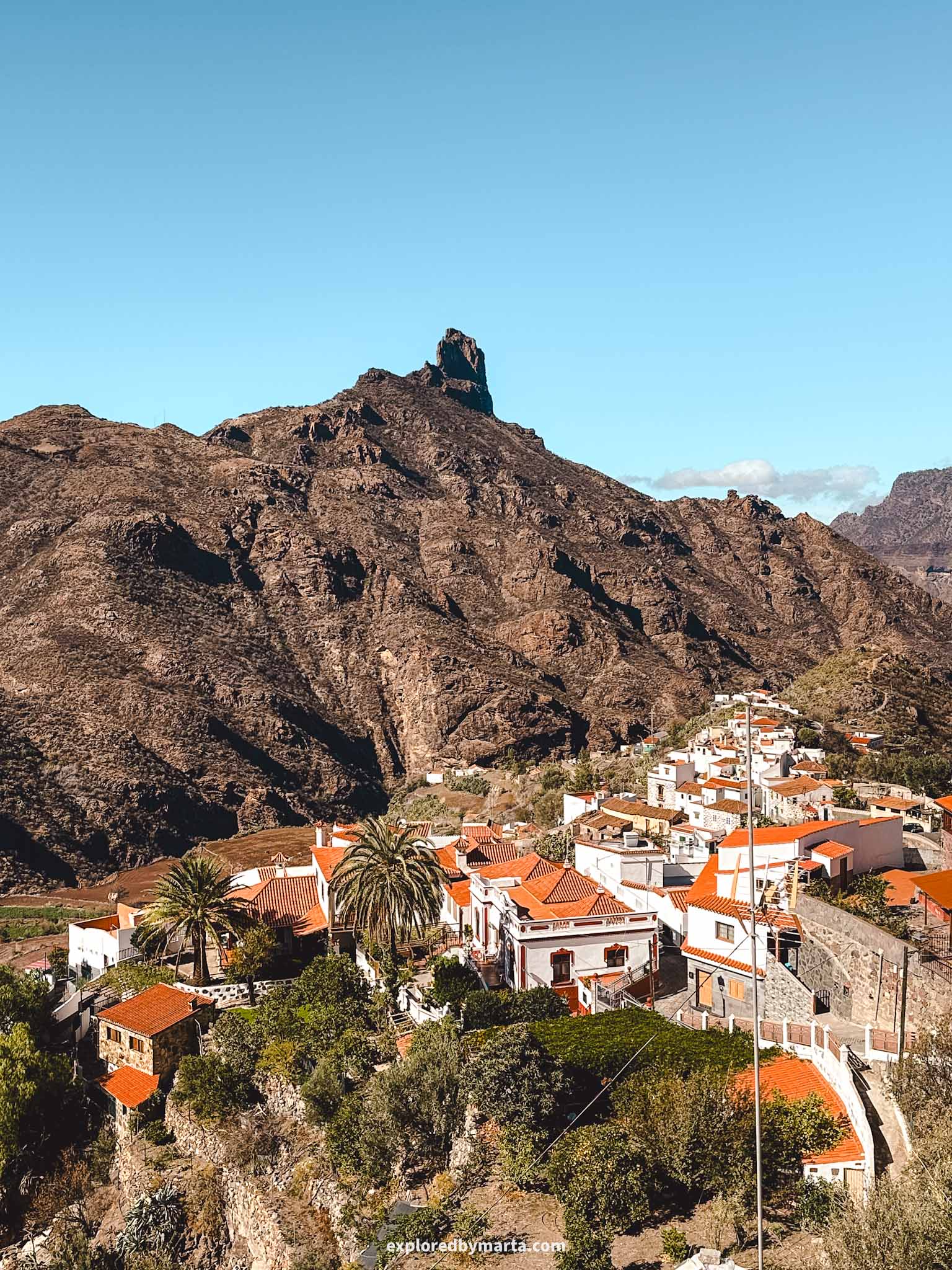
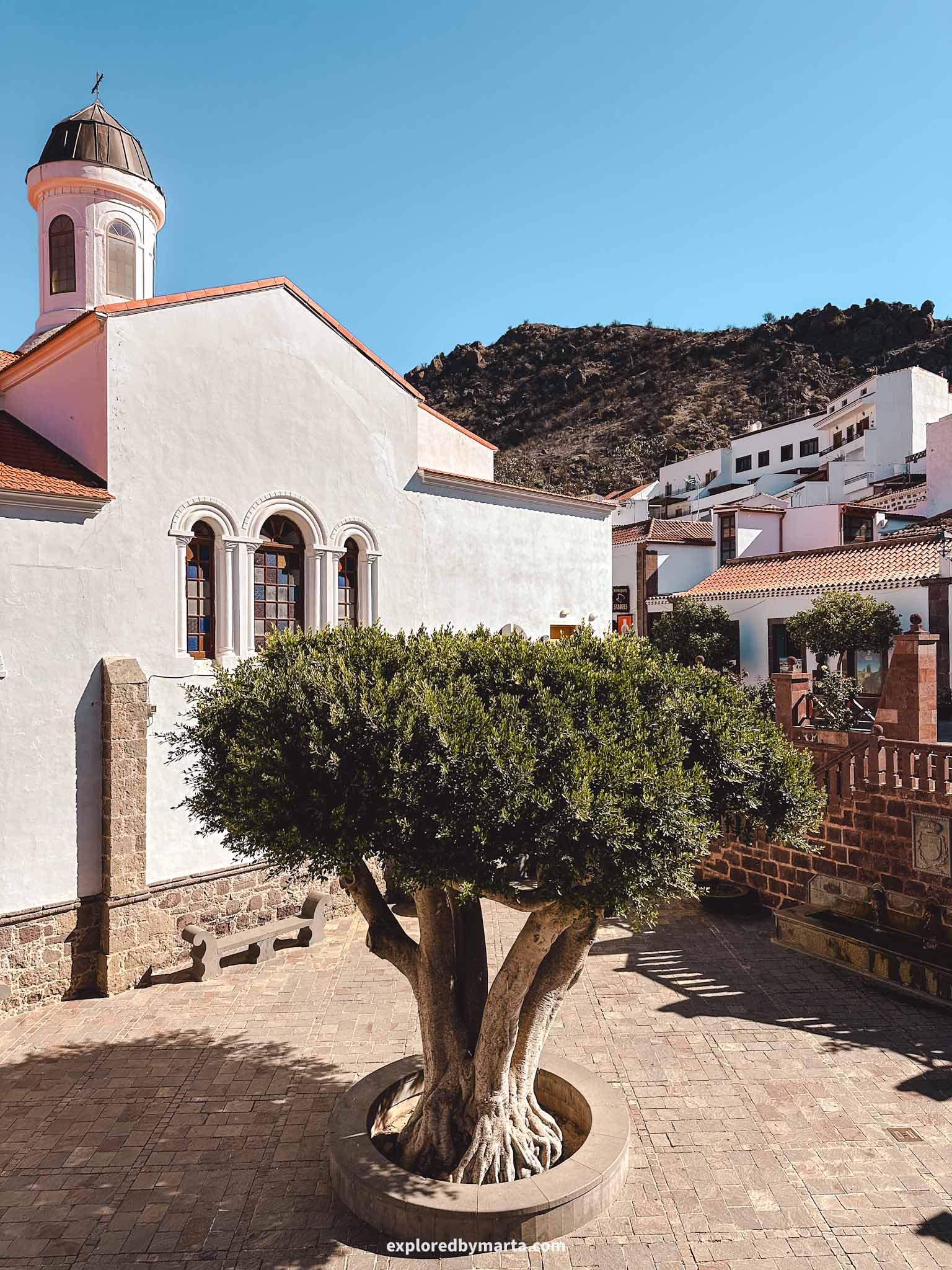
And lastly, the village offers some of the best views in Gran Canaria! Walk down Calle Dr. Domingo Hernández Guerra Street in Tejeda, and you’ll see exactly what I mean.
At the end of the street, you’ll find a small square with benches and a statue right next to the church. This is Mirador de Tejeda offering a front-row view of the iconic Roque Bentayga rock formation.
If you have more time to spend in Tejeda, I recommend finding a restaurant with a mountain view and having lunch here. There’s just something special about this village!
Location: Tejeda
11. Mirador Degollada de Becerra
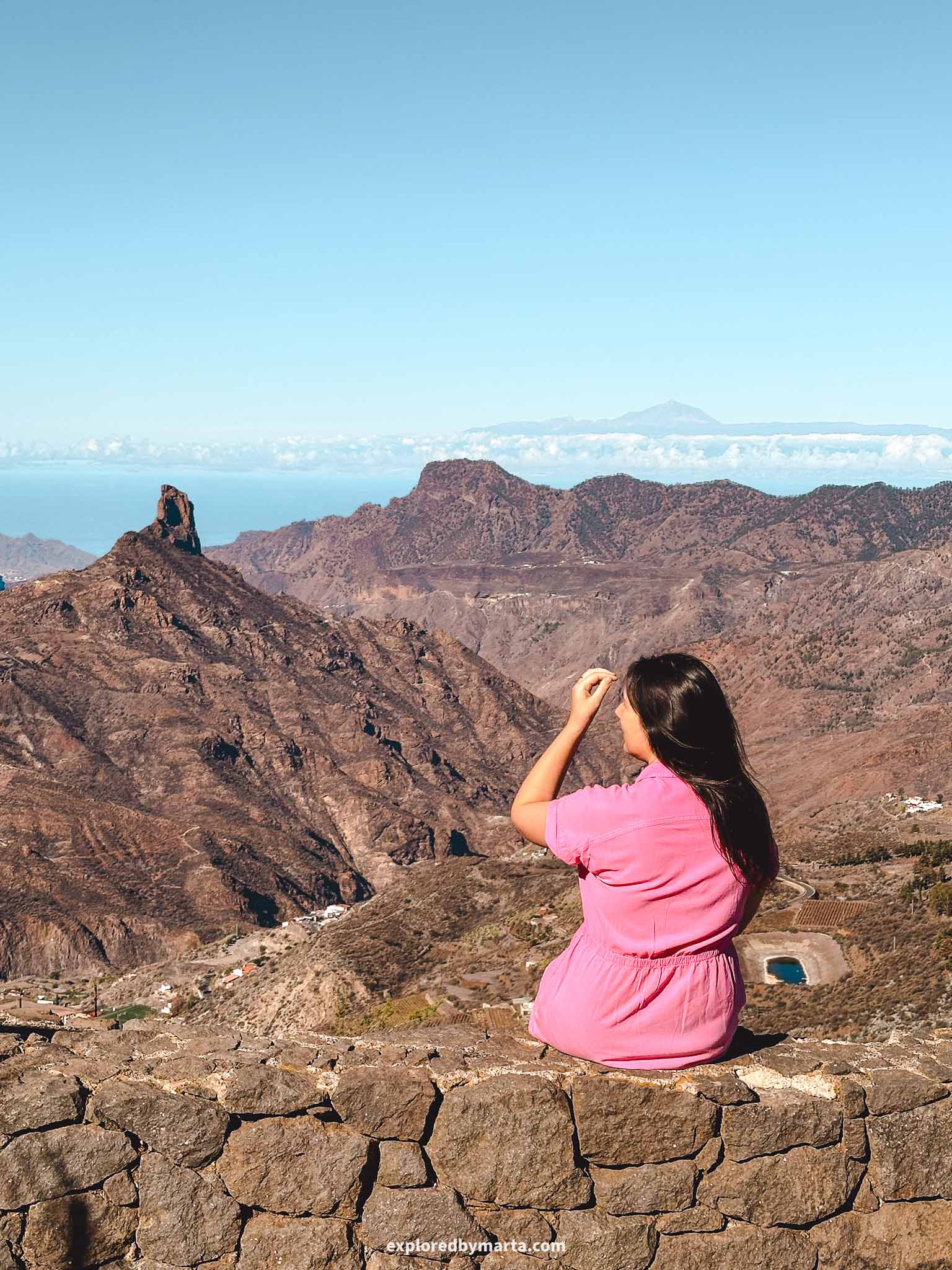
As you drive around the mountains of Gran Canaria, there are many stops along the way to enjoy fantastic views of the island. But which exactly are the best places to stop and enjoy? One of my favorite such viewpoints is Mirador Degollada de Becerra.
This viewpoint offers panoramic views of the impressive Caldera de Tejeda crater and Gran Canaria’s rugged mountains, including the island’s two most prominent rock formations—Roque Nublo and Roque Bentayga.
On a clear day, you can even spot Teide volcano in Tenerife!
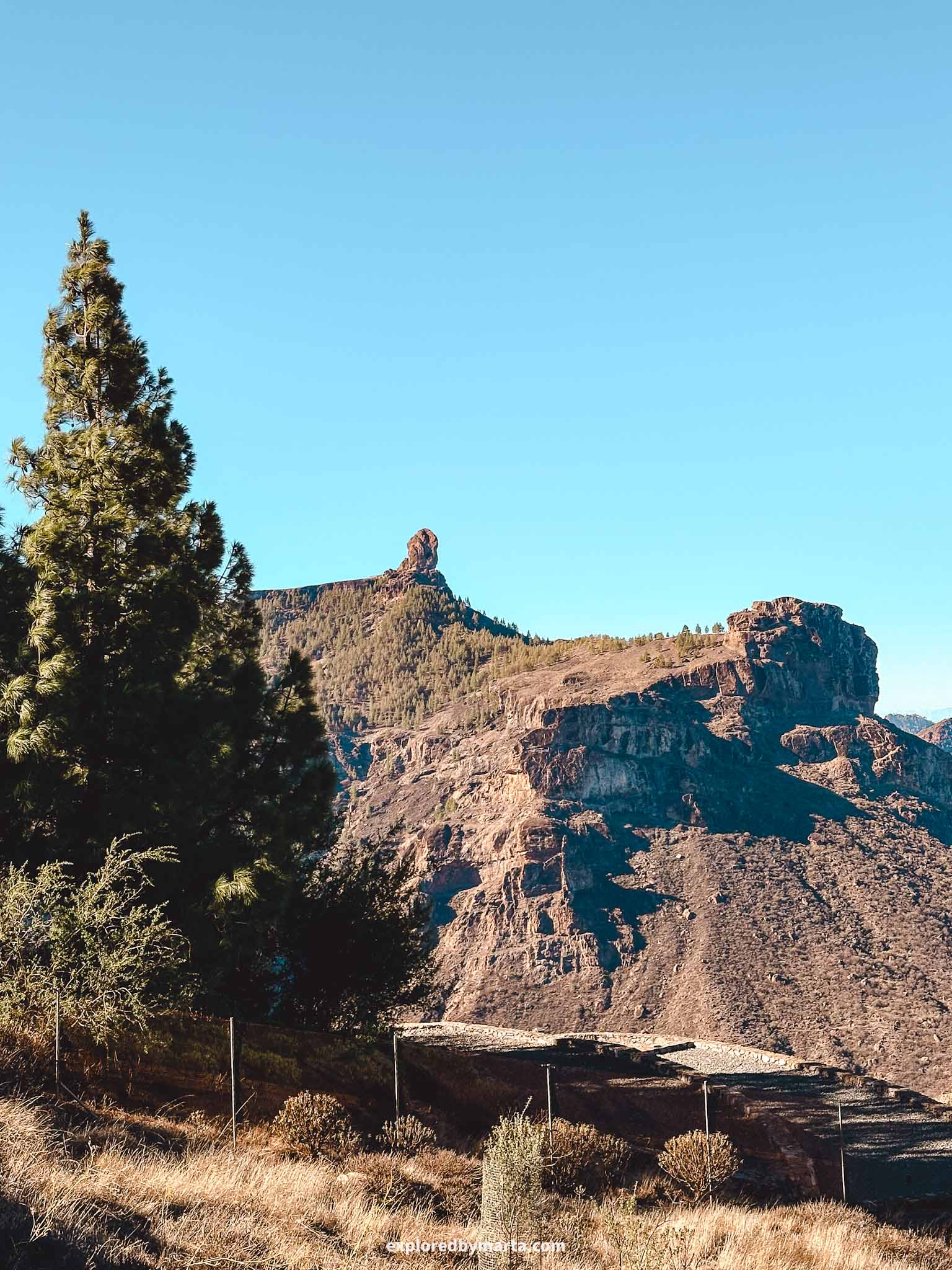

If you’ve come to Gran Canaria for the mountains and the views, this is the perfect place to soak it all in. If I hadn’t been freezing in that minidress, I probably would have stayed for an hour just gazing at all the beauty, haha!
This is also a fantastic spot to watch the sunset over the mountains, but I personally loved it during the day when you can see Teide and the stunning landscapes of Gran Canaria. If you’re up for a walk, there are also many hiking trails that pass through this viewpoint. Enjoy!
Location: Mirador Degollada de Becerra
12. Teror
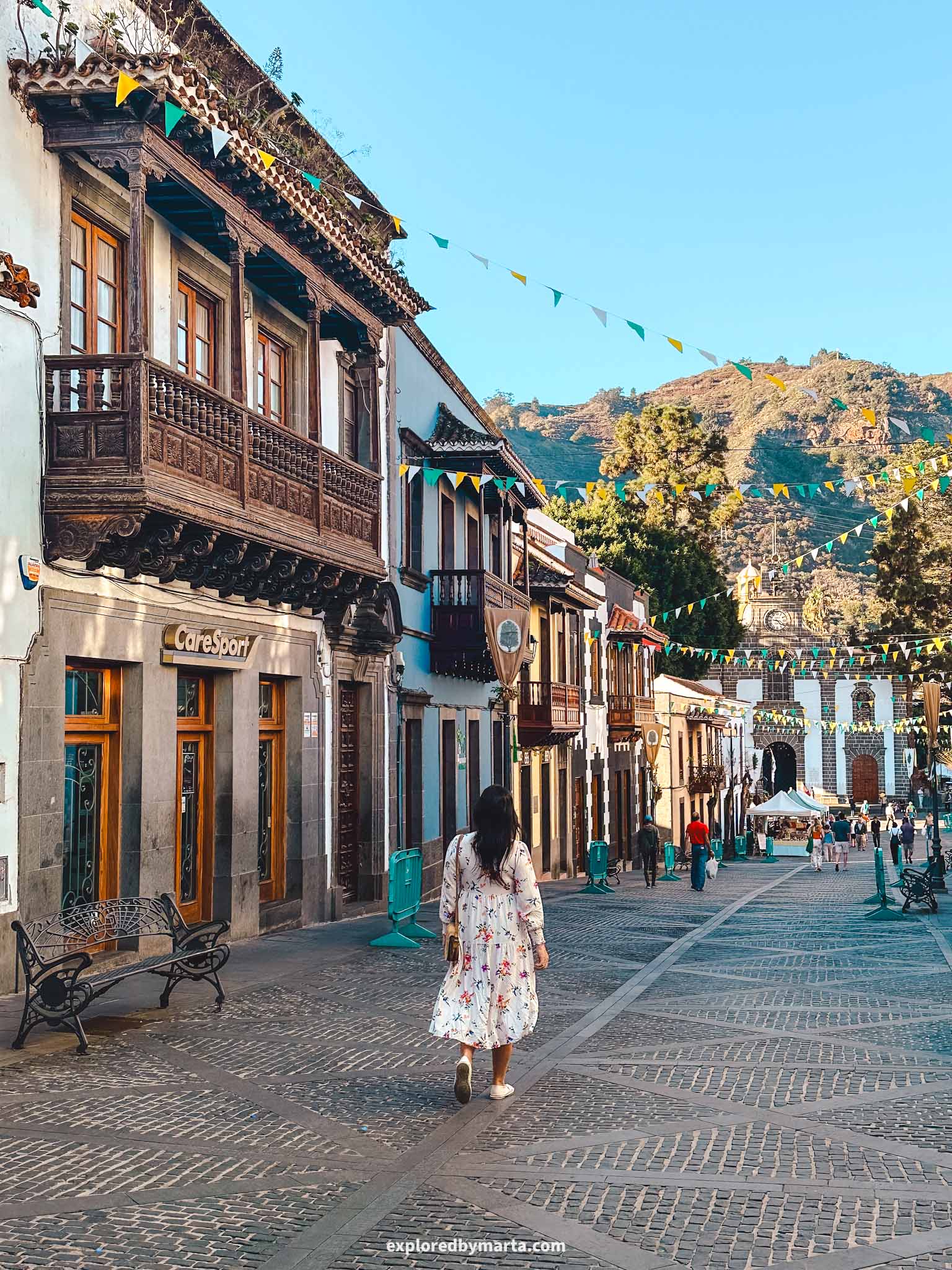

Trust me, this place was nothing but absolutely charming and peaceful, haha! Don’t let the name intimidate you—Teror is a lovely town!
There’s so much to love about Teror, and I highly recommend visiting. It’s home to a small but beautiful basilica, the Basilica de Nuestra Señora del Pino, dedicated to Gran Canaria’s patron saint—the Virgin of the Pine (notice the pine trees next to the church?).
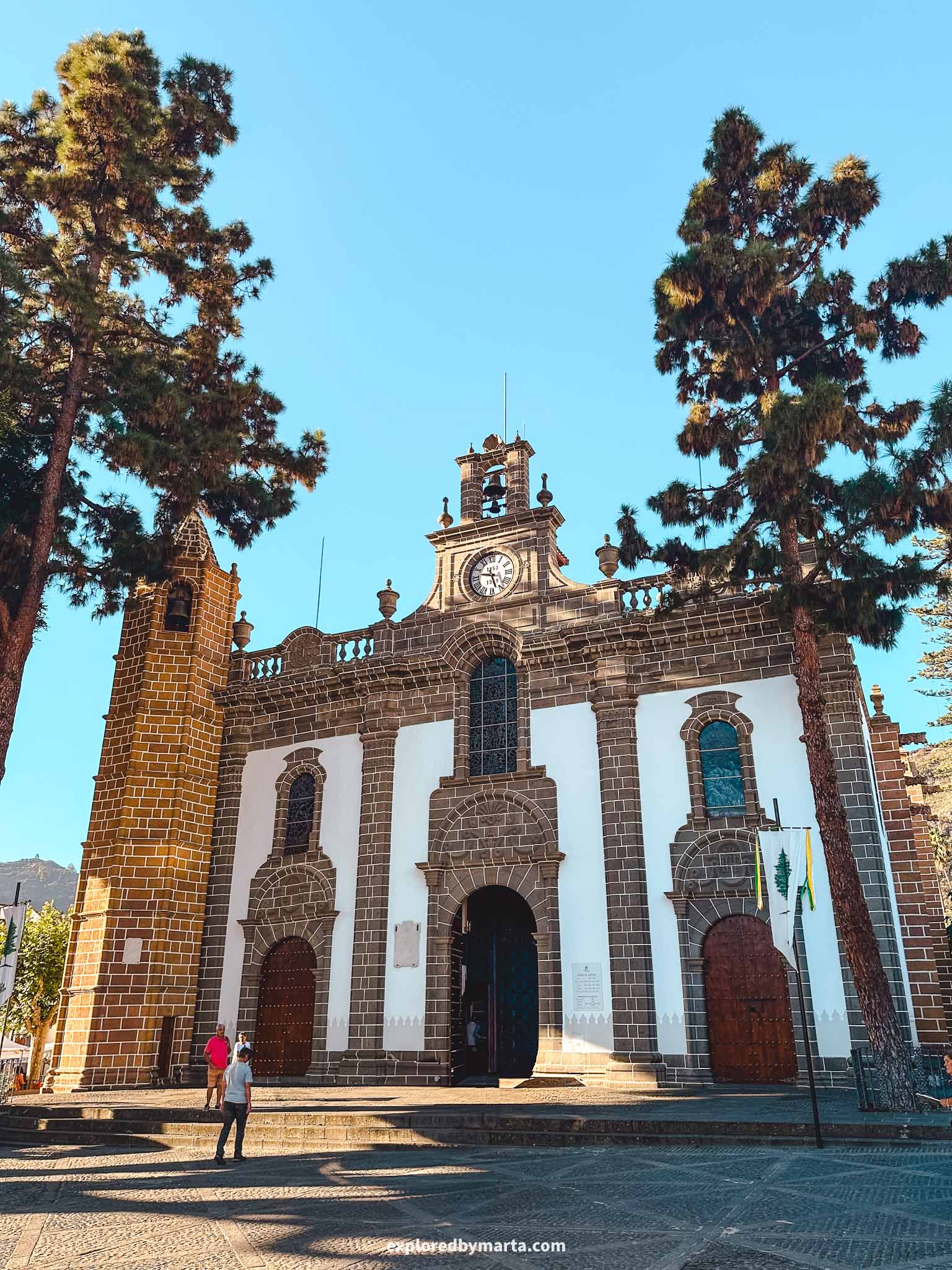
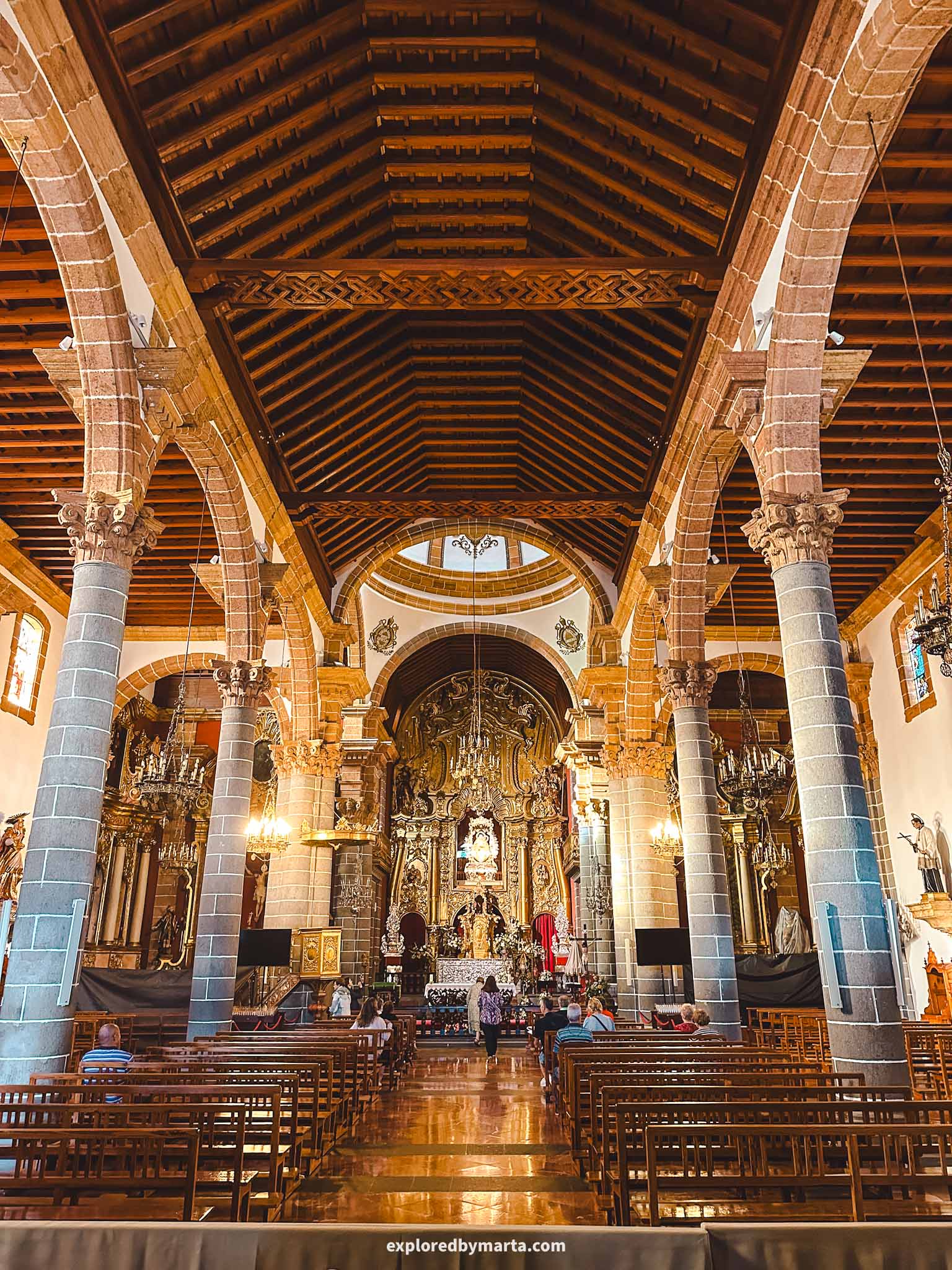
Every year, thousands of pilgrims walk to Teror to celebrate the patron saint. We visited on a Sunday and saw crowds of people walking along the road toward the town. You visit the inside of this stunning 18th-century basilica for a small entrance fee.
Teror is also known as one of the most beautiful colonial towns in Gran Canaria. The typical colorful houses with intricate wooden balconies are on display throughout the town but are especially prominent on Calle Real de la Plaza.
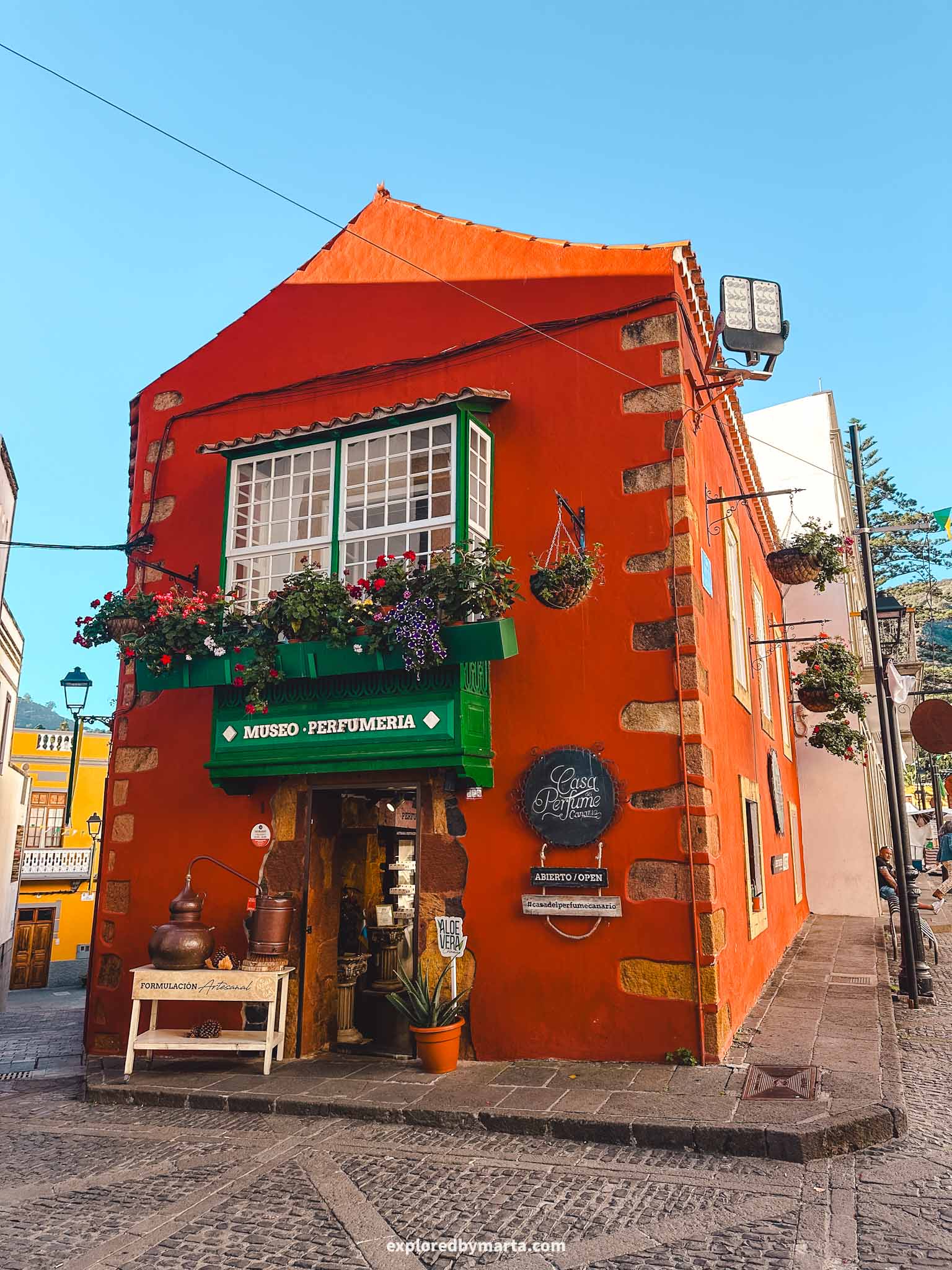
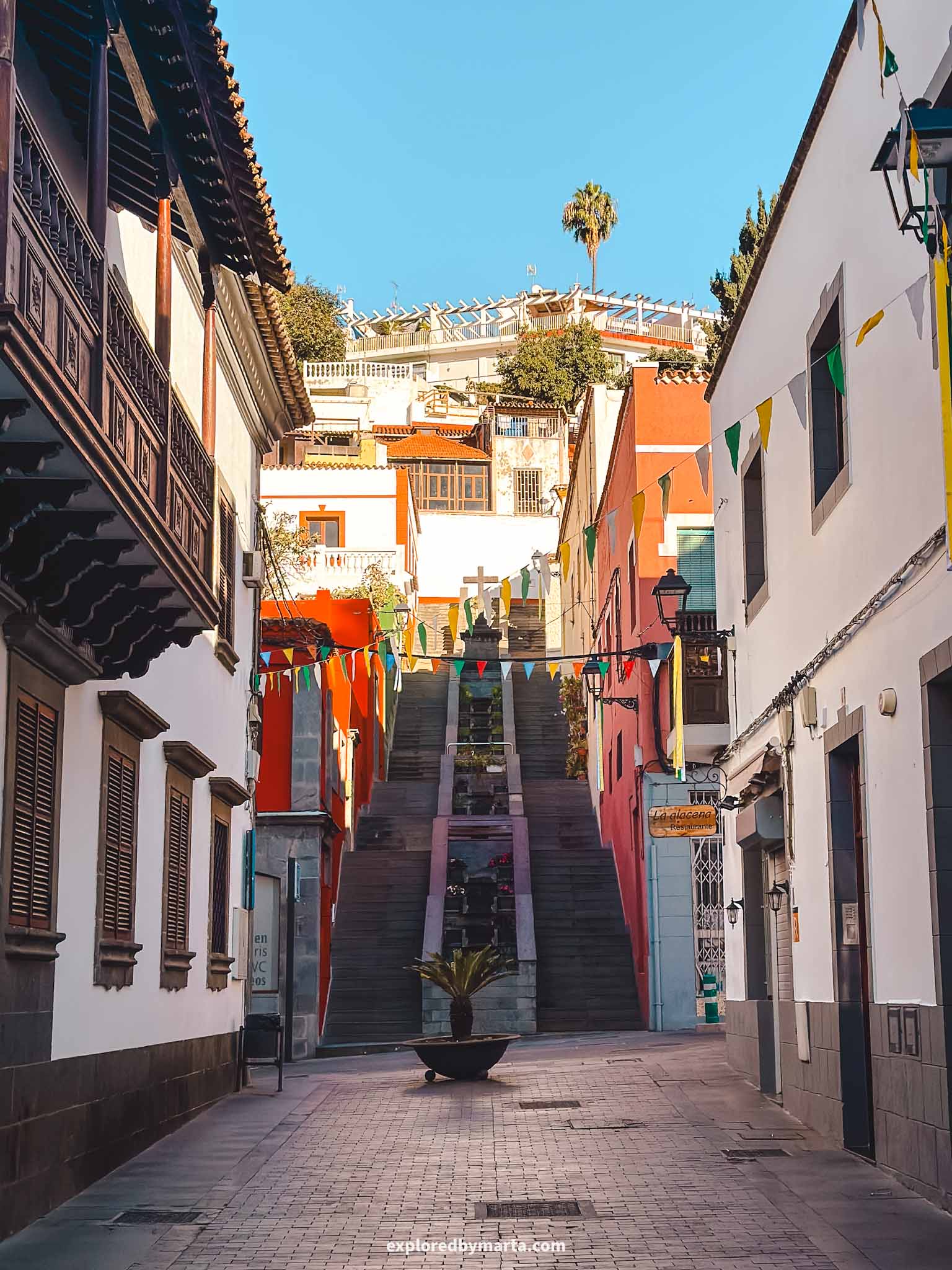
But honestly, we came to Teror for a different reason—to eat! Teror hosts one of the most popular Sunday markets on the island, where local artisans and farmers sell all kinds of goodies like volcanic jewelry, goat cheese, smoked meats and sausages, pastries, and more.
But there’s one special thing you have to try when visiting Gran Canaria: chorizo de Teror. It’s not a regular sausage but a chorizo spread that you can put on bread or in a sandwich. We got a couple of sandwiches to eat on the spot and even took an extra box of chorizo home.
Chorizo is, of course, famous worldwide, but every country and region has its own unique version. That’s why I highly recommend giving Teror chorizo a try when visiting Gran Canaria.
Location: Teror
13. Agaete Valley / Puerto de las Nieves
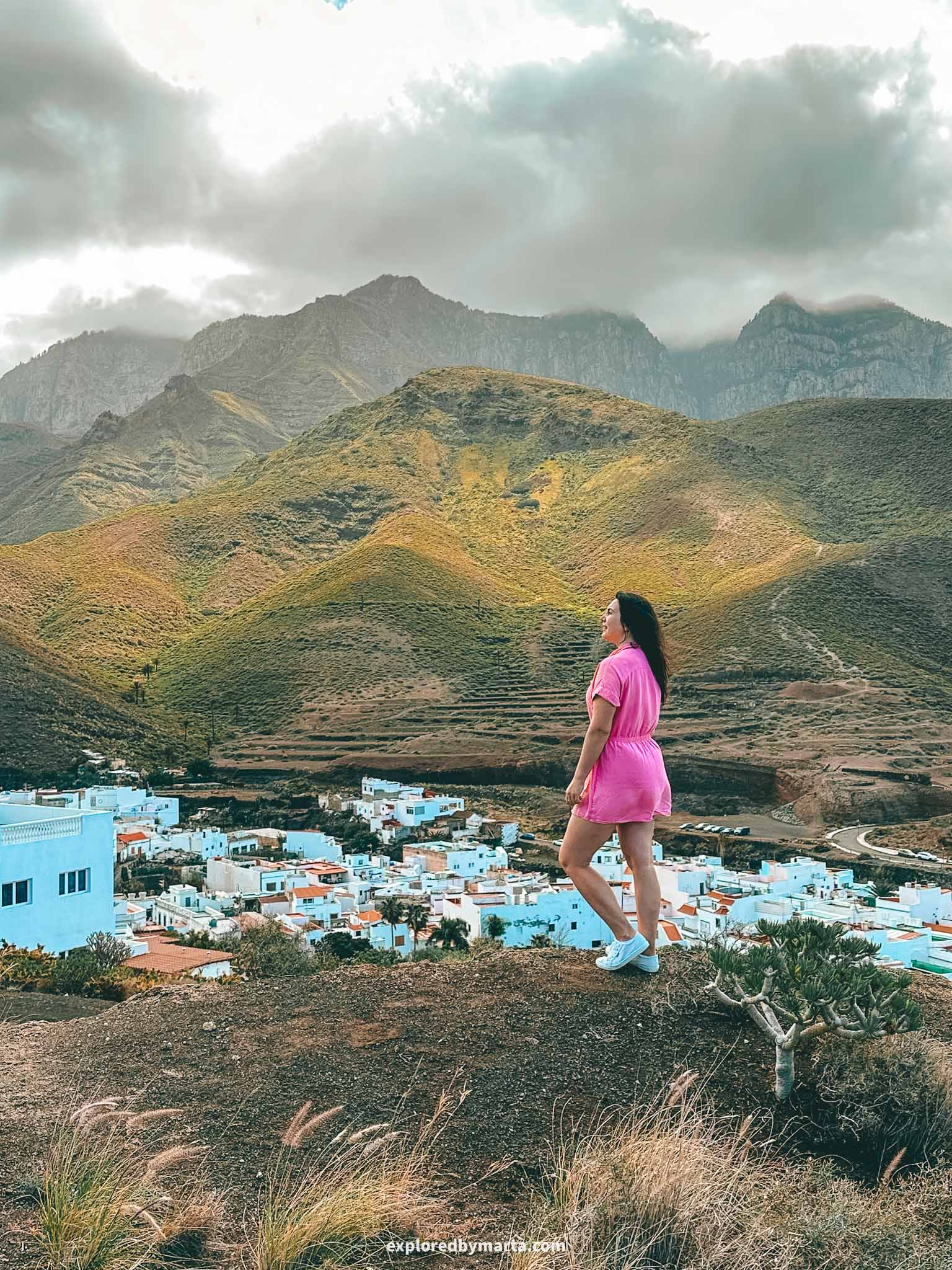

Oh, the beautiful Agaete Valley! Located in the northwest of Gran Canaria at the feet of the mountains of the Tamadaba Natural Park, this unique place absolutely captivated my heart.
A visit to Agaete Valley should be on every Gran Canaria bucket list, as it’s packed with unique sights and experiences. The village of Agaete sits deep in the valley, surrounded by lush vegetation and green mountains—a popular spot for hiking.
Thanks to its favorable climate, the valley is perfect for growing a wide variety of tropical fruits and plants. You’ll find many fincas (countryside estates) and plantations here, including Agaete’s pride and joy—its coffee plantations!
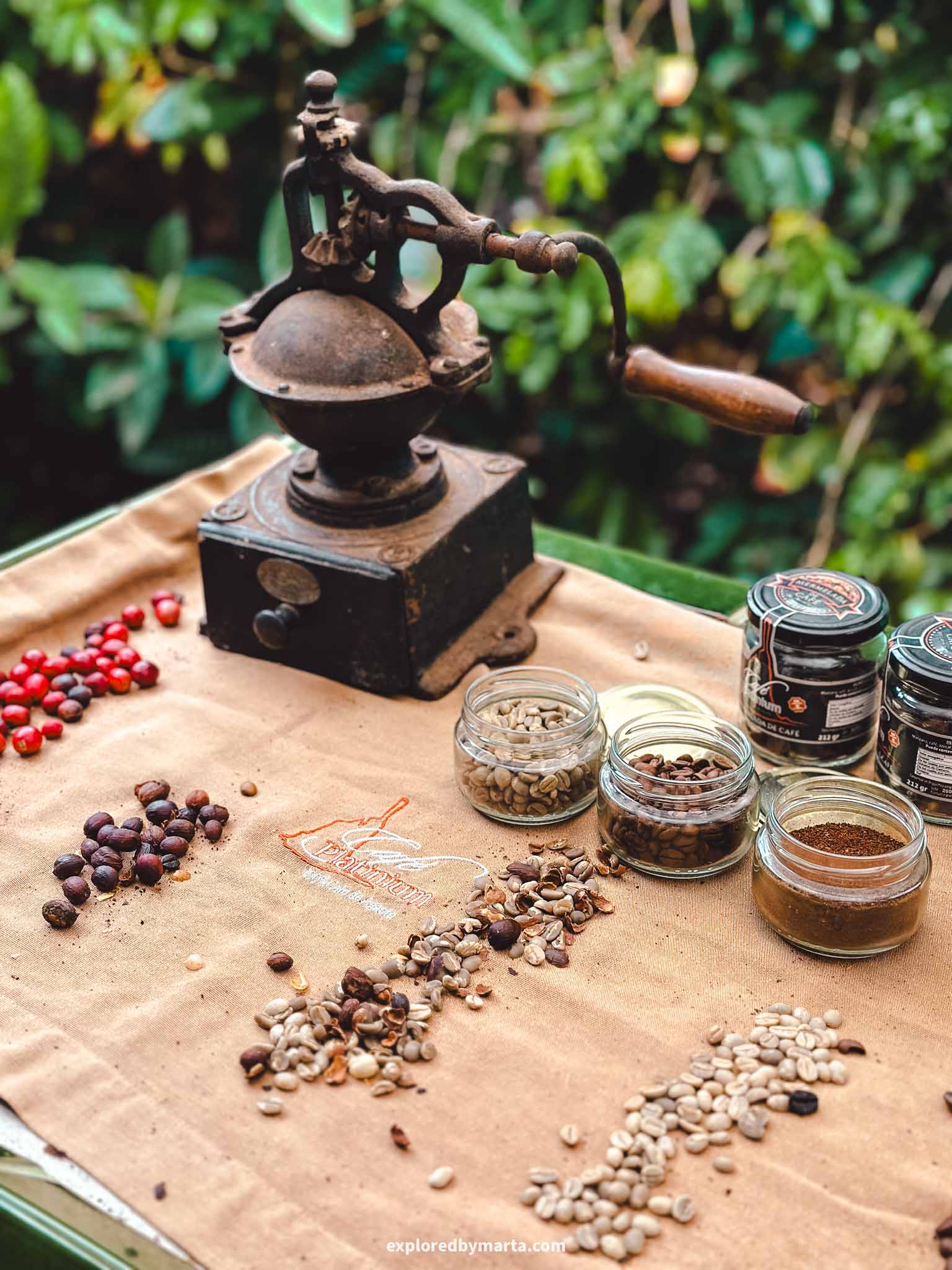
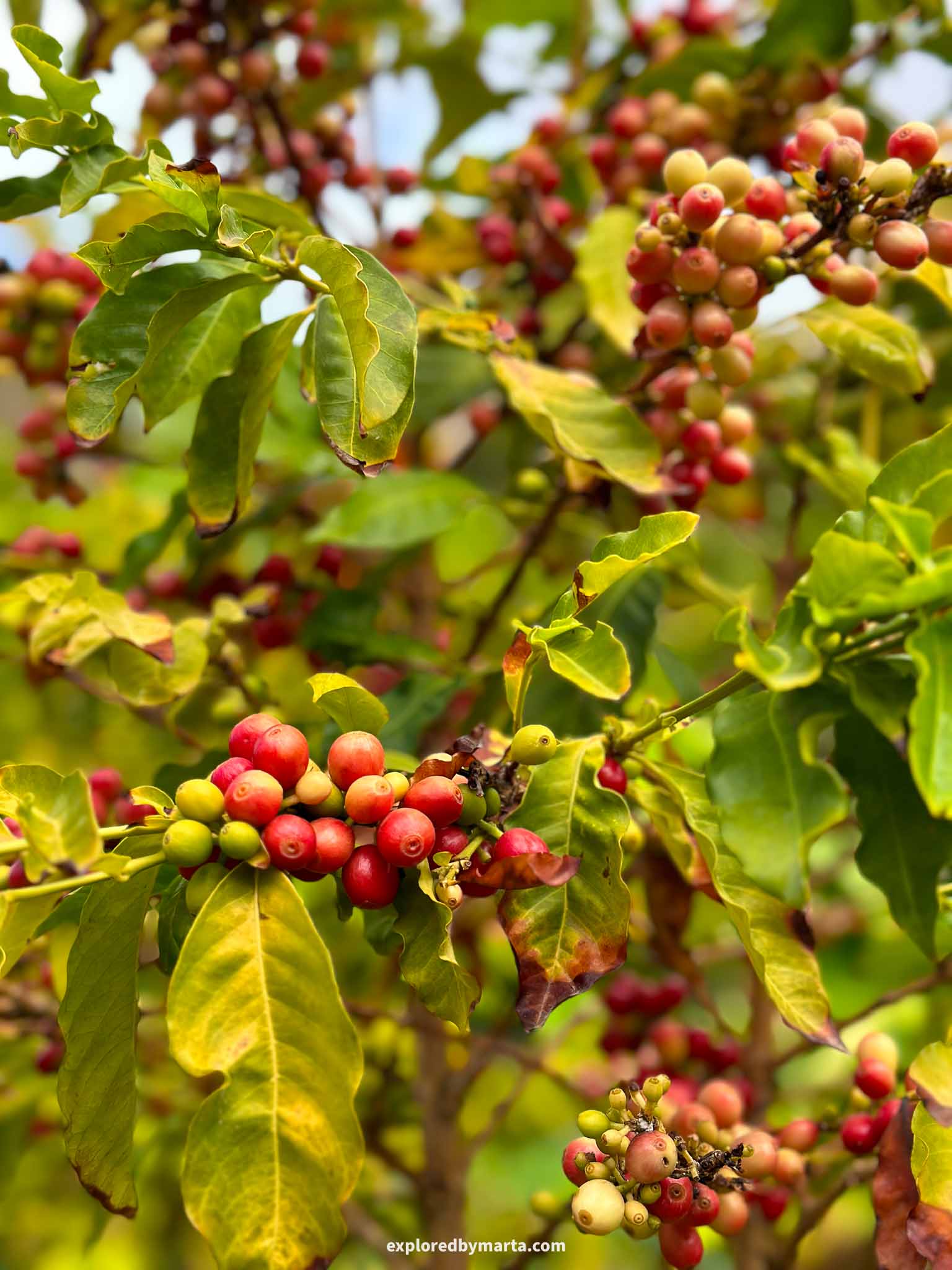
Yes, there are coffee plantations in Gran Canaria—one of the only places in Europe where you can find them! We visited one at Café Platinium deep into the valley, where we got a private tour, a coffee tasting, and a coffee roasting demonstration.
However, if you travel to the coast, you will arrive at Agaete’s port town—Puerto de las Nieves, or simply Puerto de Agaete. This charming seaside village is known for its whitewashed houses and stunning coastal views.
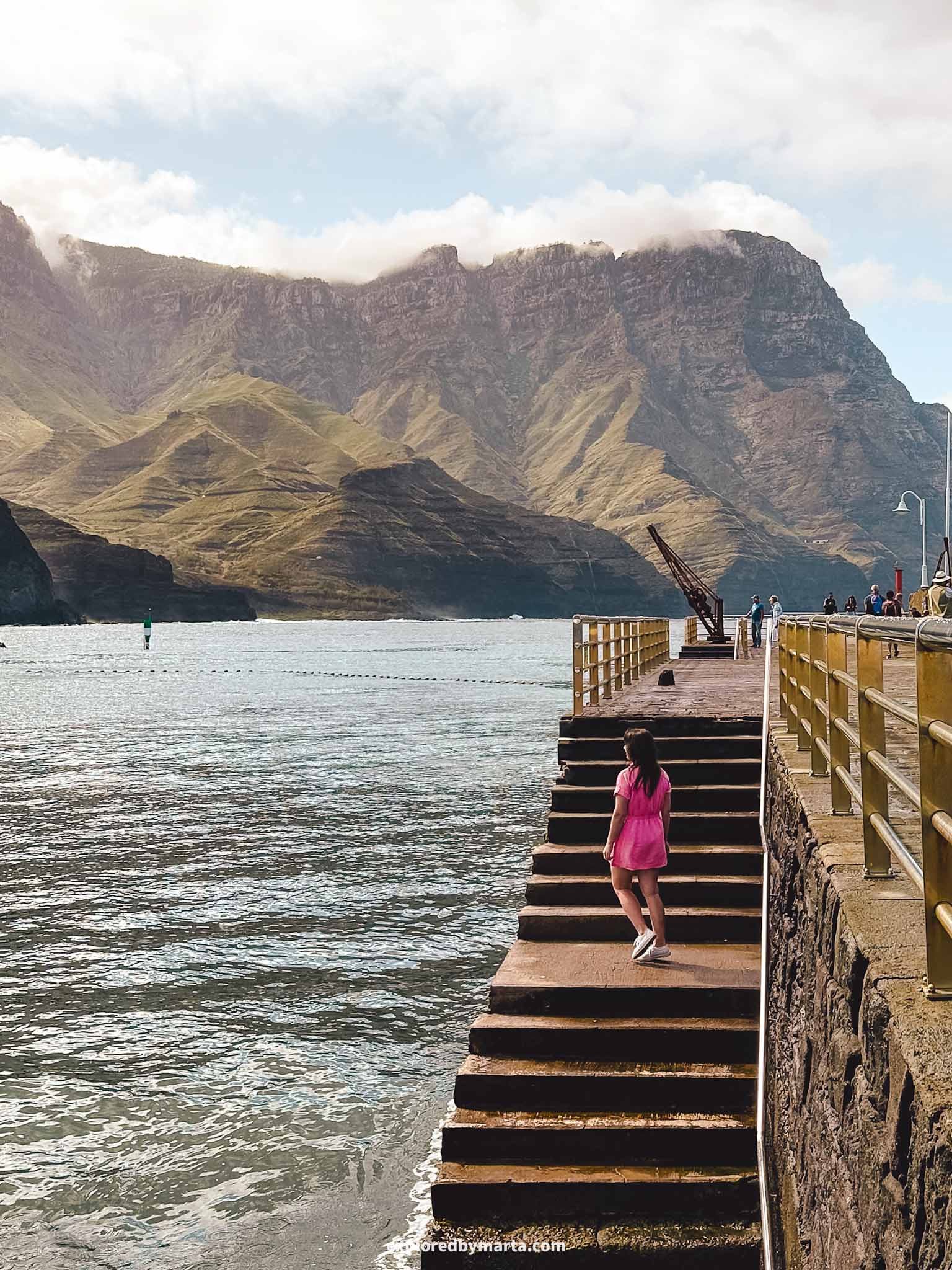
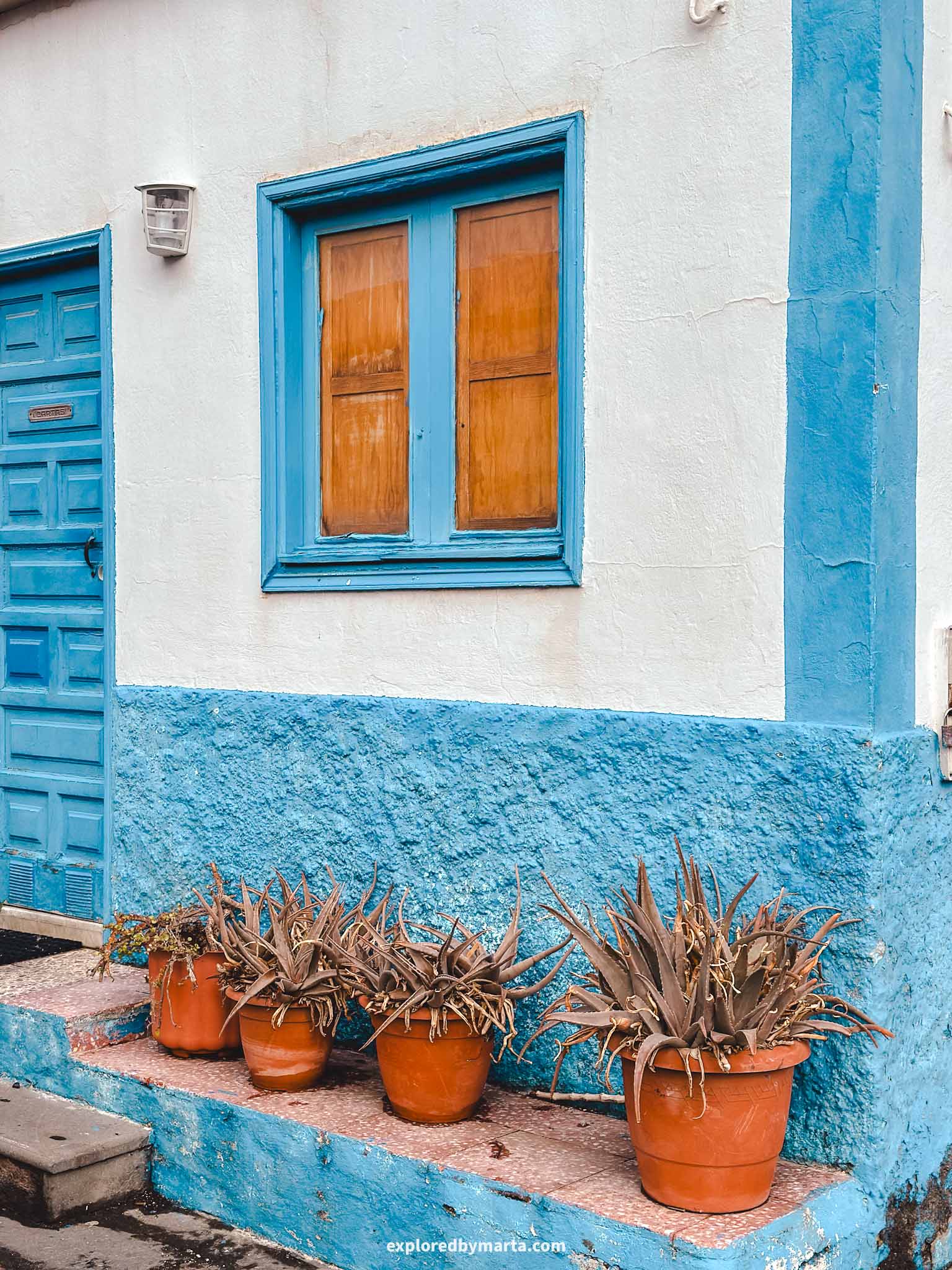
It is one of my favorite places to visit in Gran Canaria!
Puerto de las Nieves features a black sand beach with the backdrop of sharp and steep mountains creating a spectacular view you can observe from anywhere along the beachside, especially from the beach itself or the fishing pier right next to it.
We have visited Puerto de las Nieves and Agaete many times and I would gladly return to this special place again!
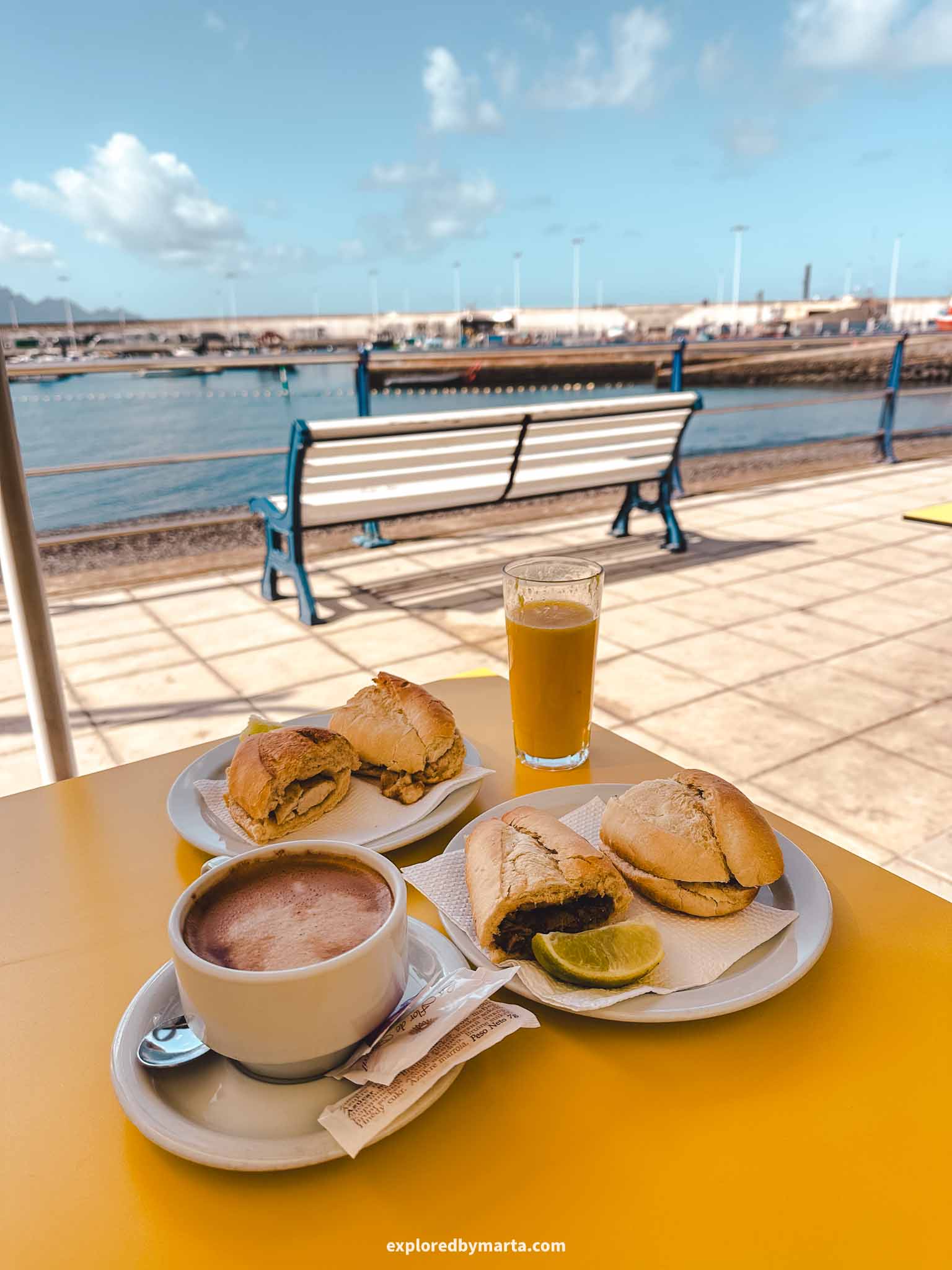
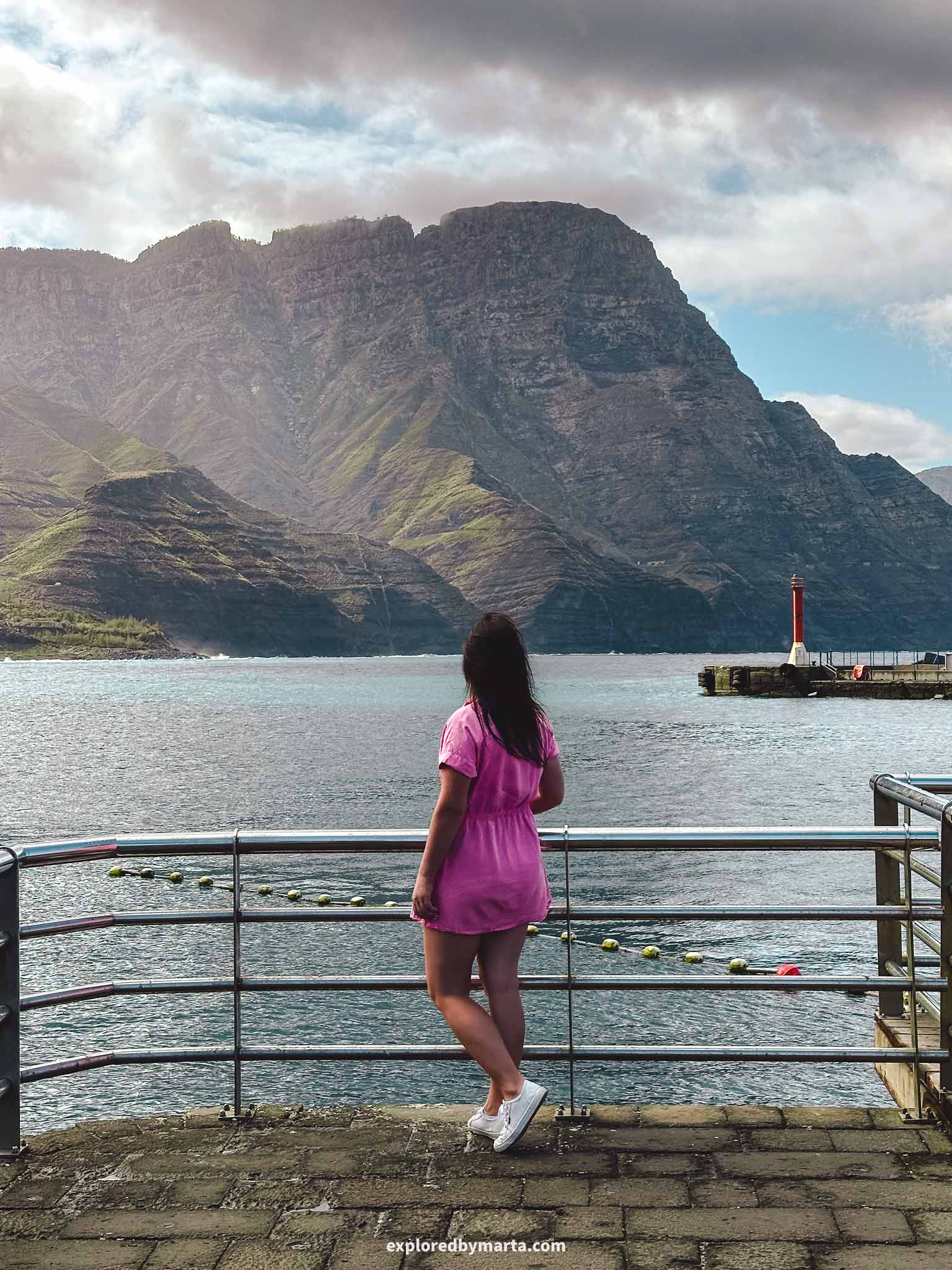
If you come here, I highly recommend picking a waterfront restaurant for late breakfast or lunch right by the port so you can enjoy the scenery with a cup of coffee or a glass of sangria.
Puerto de las Nieves is the perfect place to get away from the usual crowds in the southern part of the island. If you are up for a road trip to the northwest, you’ll be rewarded with something truly special here!
Location: Puerto de las Nieves – Café Platinium
14. Artenara, the highest village in Gran Canaria
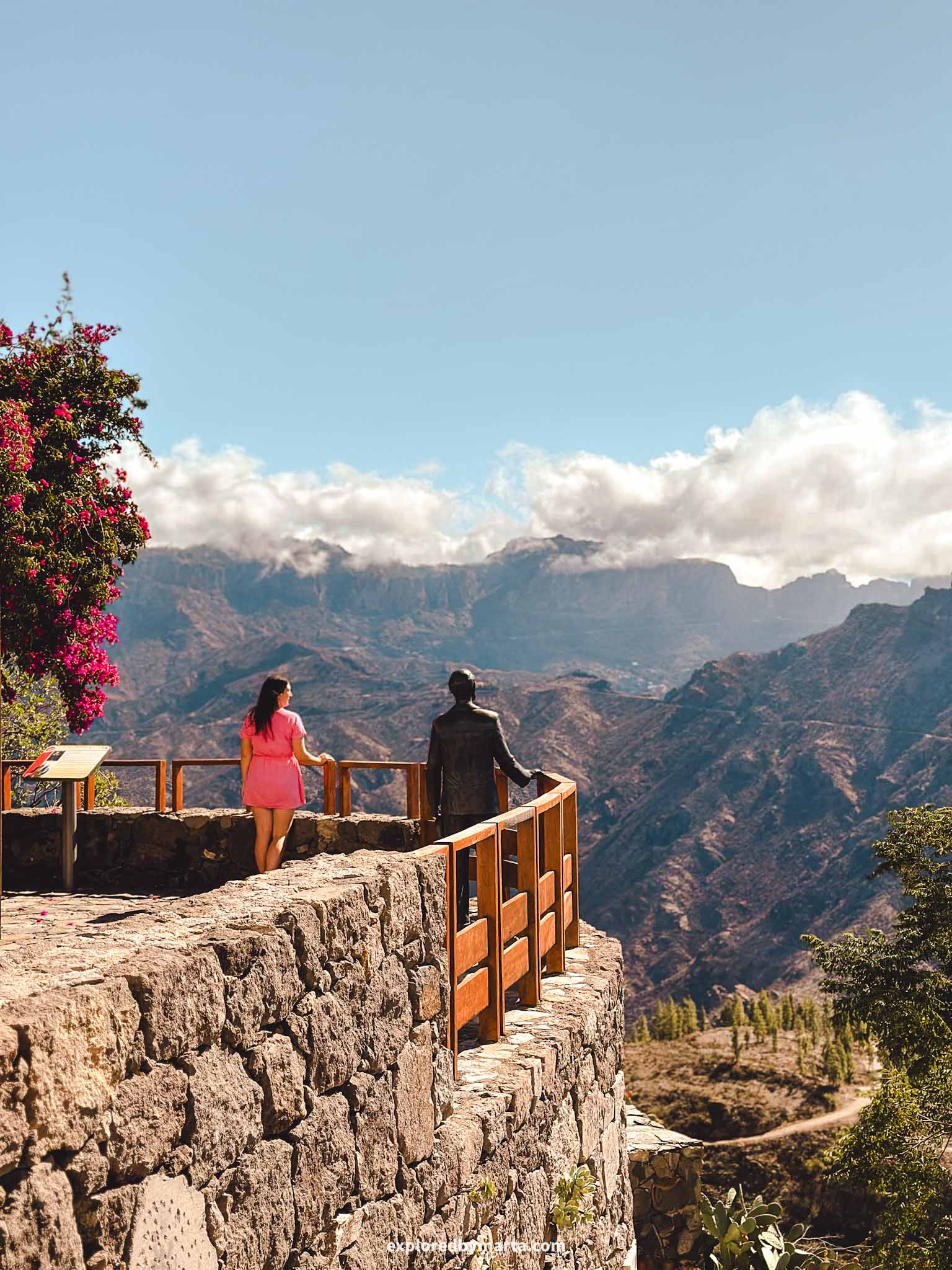
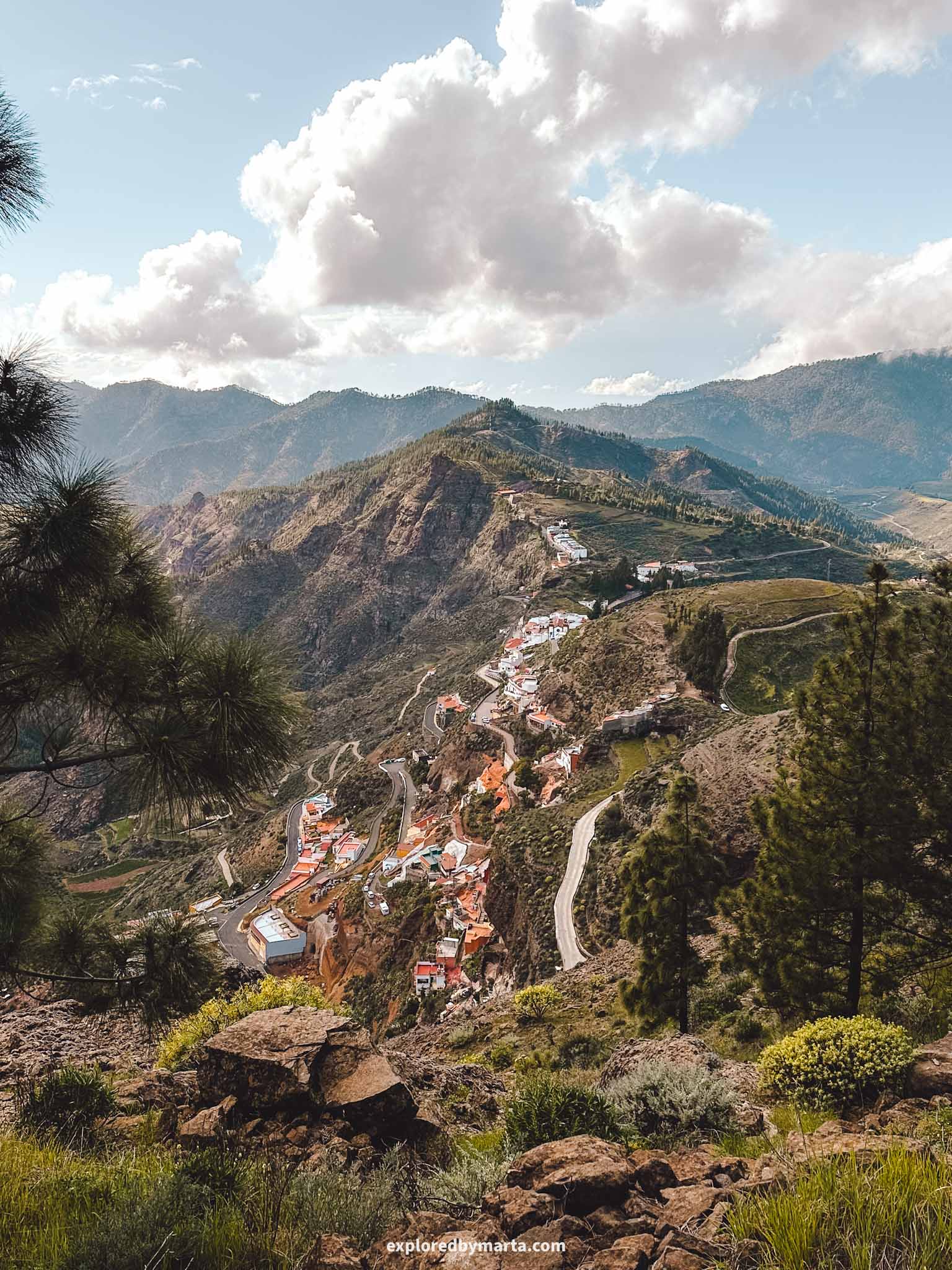
Located on a cliffside 1,270 meters above sea level, Artenara is the highest village in Gran Canaria, known for its cave houses, breathtaking views of the mountains, and a network of hiking trails passing through the village.
In my opinion, there are two places you must stop by in the mountains – one is Tejeda, and the other is Artenara. I might have loved Tejeda more, but only because it has better views of the Roque Bentayga rock formation (because it is closer).
However, Artenara has better panoramic views of the mountains and is a must-visit place in Gran Canaria!
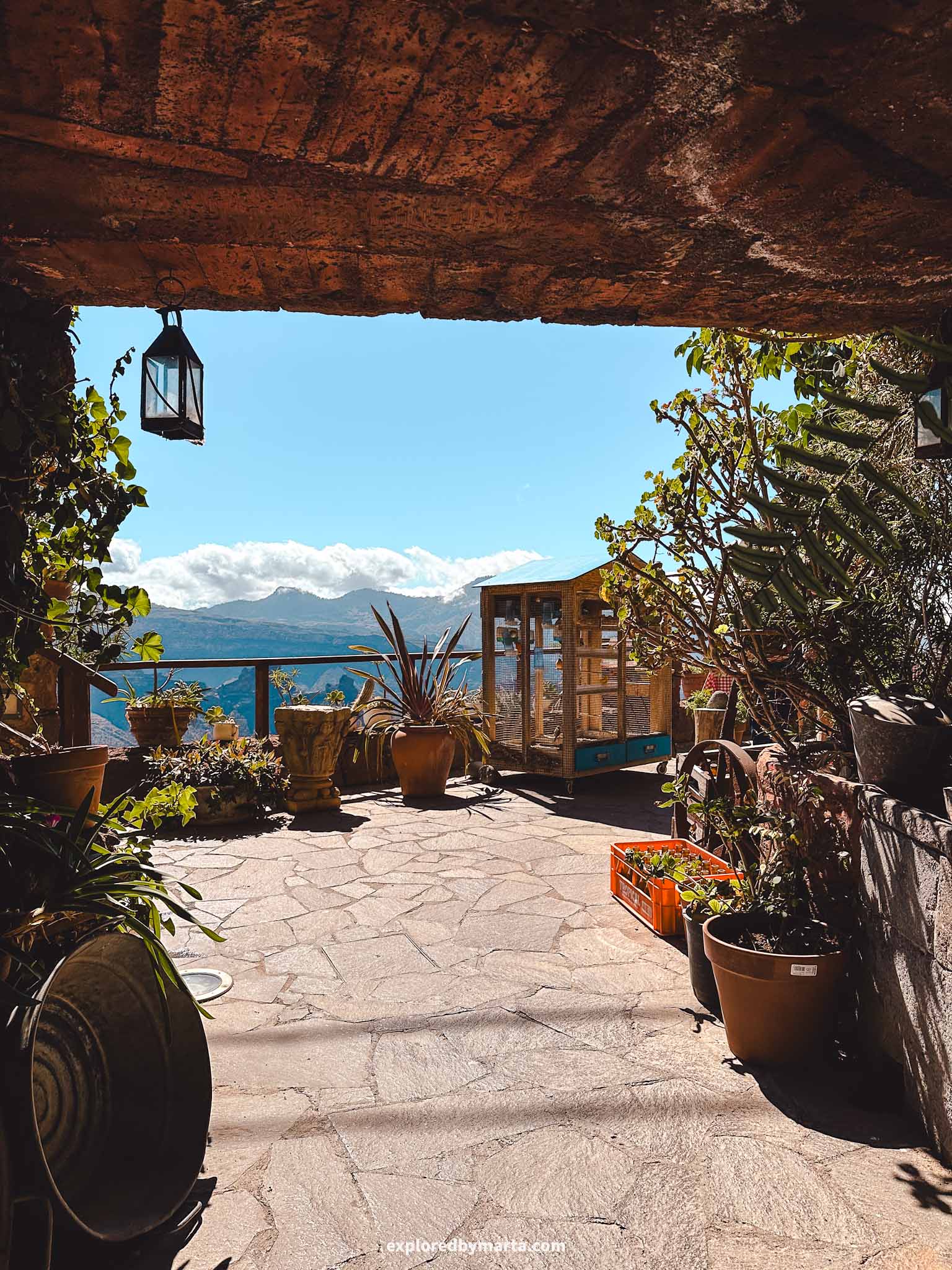
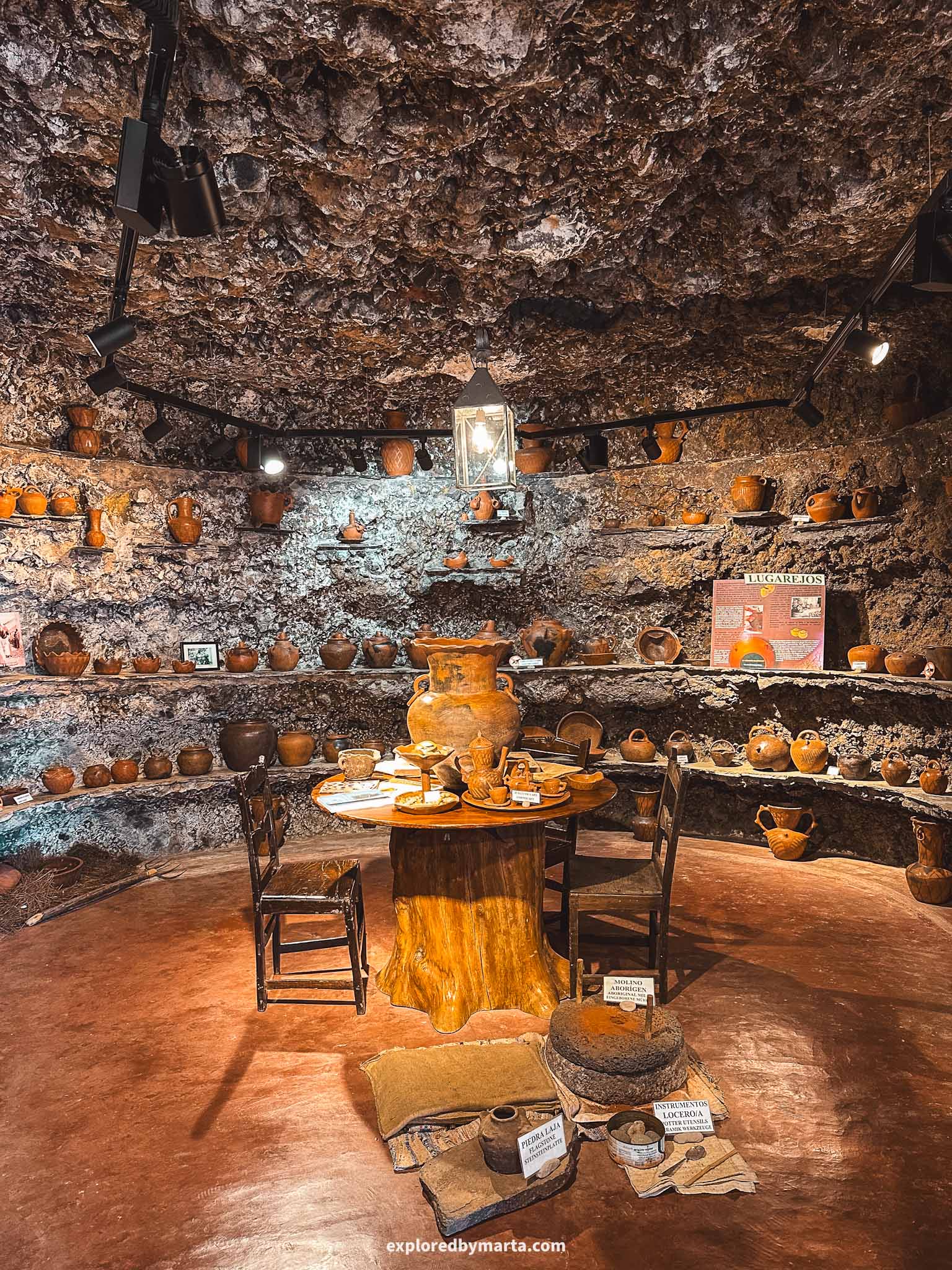
We visited Artenara many times during our stay in Gran Canaria. Some of the best places to visit in Artenara include the famous Mirador de Unamuno, the Ethnographic Museum of Cave Houses, La Cuevita Chapel inside a cave, and Iglesia de San Matías church.
The beautiful Mirador de Unamuno viewpoint is dedicated to Spanish philosopher and writer Miguel de Unamuno in honor of his visit to the island. It features a bronze statue of the man himself admiring the beauty of the mountains of Gran Canaria.
But the museum of cave houses was, probably, my favorite place in Artenara. The museum consists of several cave houses, each serving a different purpose—the kitchen cave, the bedroom cave, the workshop cave, and more. Together, they form a complete home for a family.
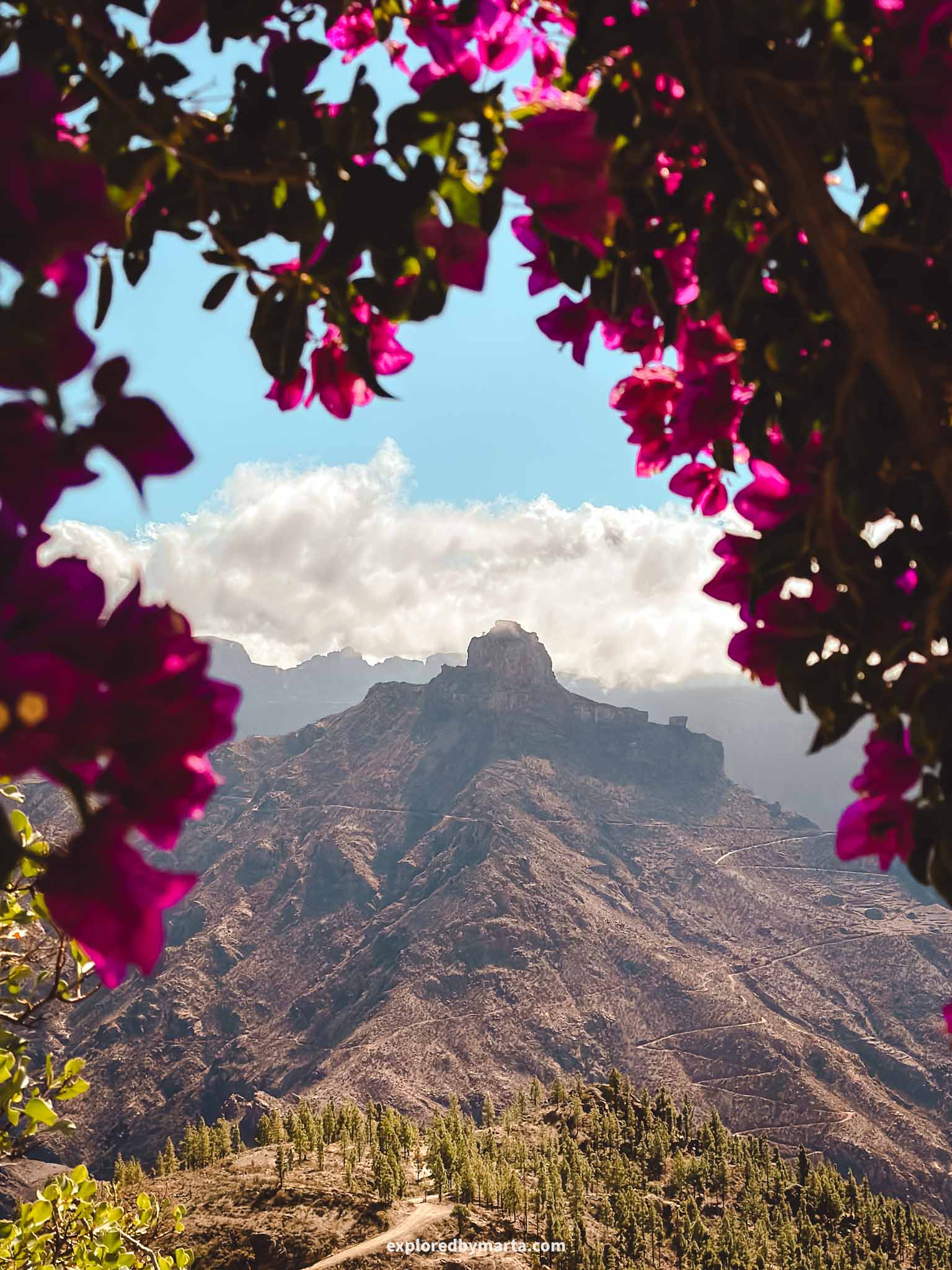
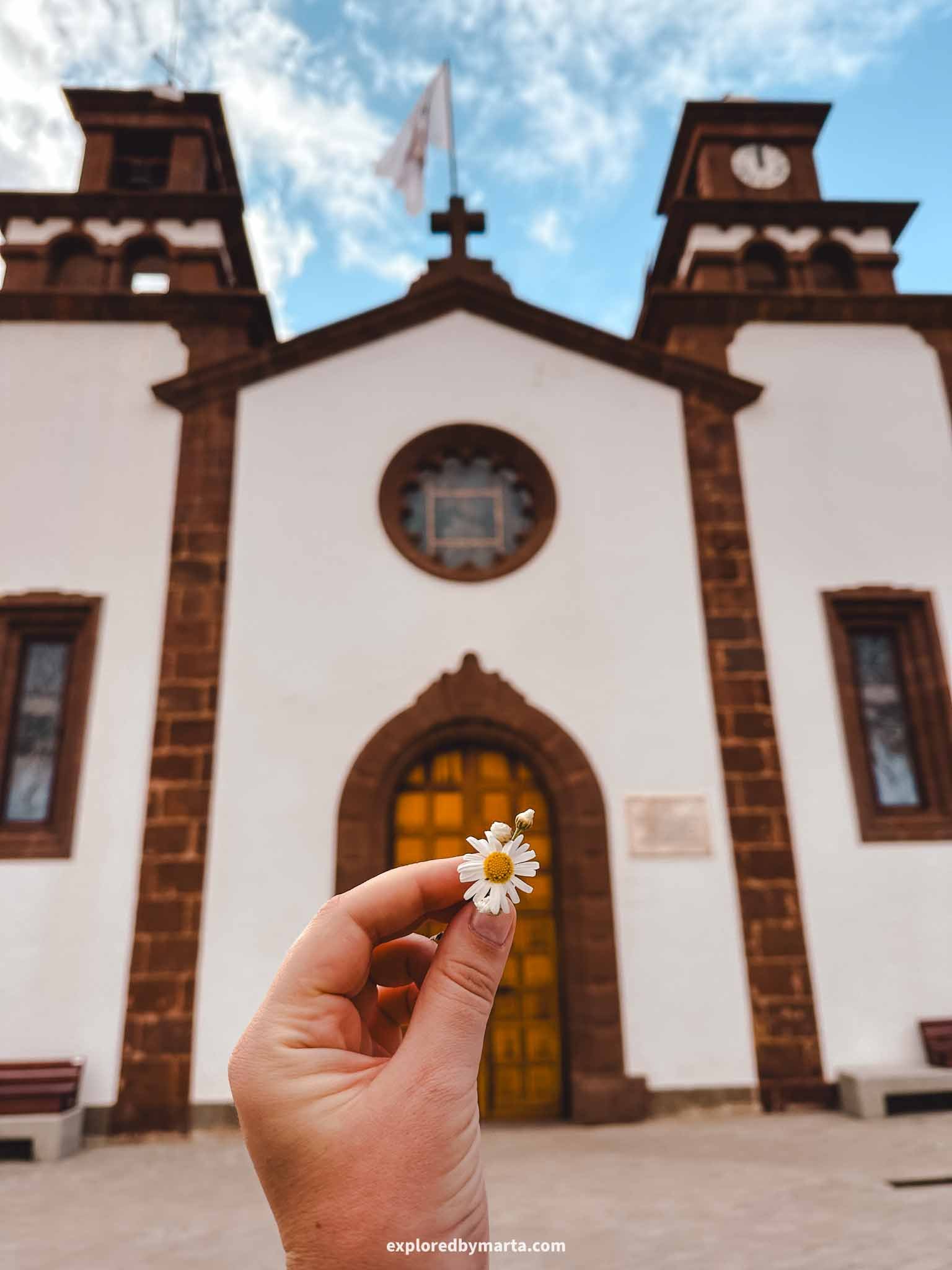
The cave houses showcase how early settlers adapted to life in Gran Canaria because living in caves was practical and affordable, as the rock naturally provided walls, a ceiling, and a floor—the only thing missing was a door!
By the way, there are many ‘Casa Cueva’ cave houses turned into rental properties in Artenara if you ever wish to stay the night in one! Just choose your dates below and look for ‘Cave’ or ‘Casa Cueva’ in the title:
If you stay longer in Artenara, you can also check out other fantastic viewpoints in the village like Mirador de La Atalaya, Mirador de Los Poetas, and Mirador del Corazon de Jesus featuring the statue of Christ. Come here at sunset for mountain views in golden hues!
Location: Artenara – Mirador de Unamuno
15. Caves of Valeron / Cenobio de Valerón
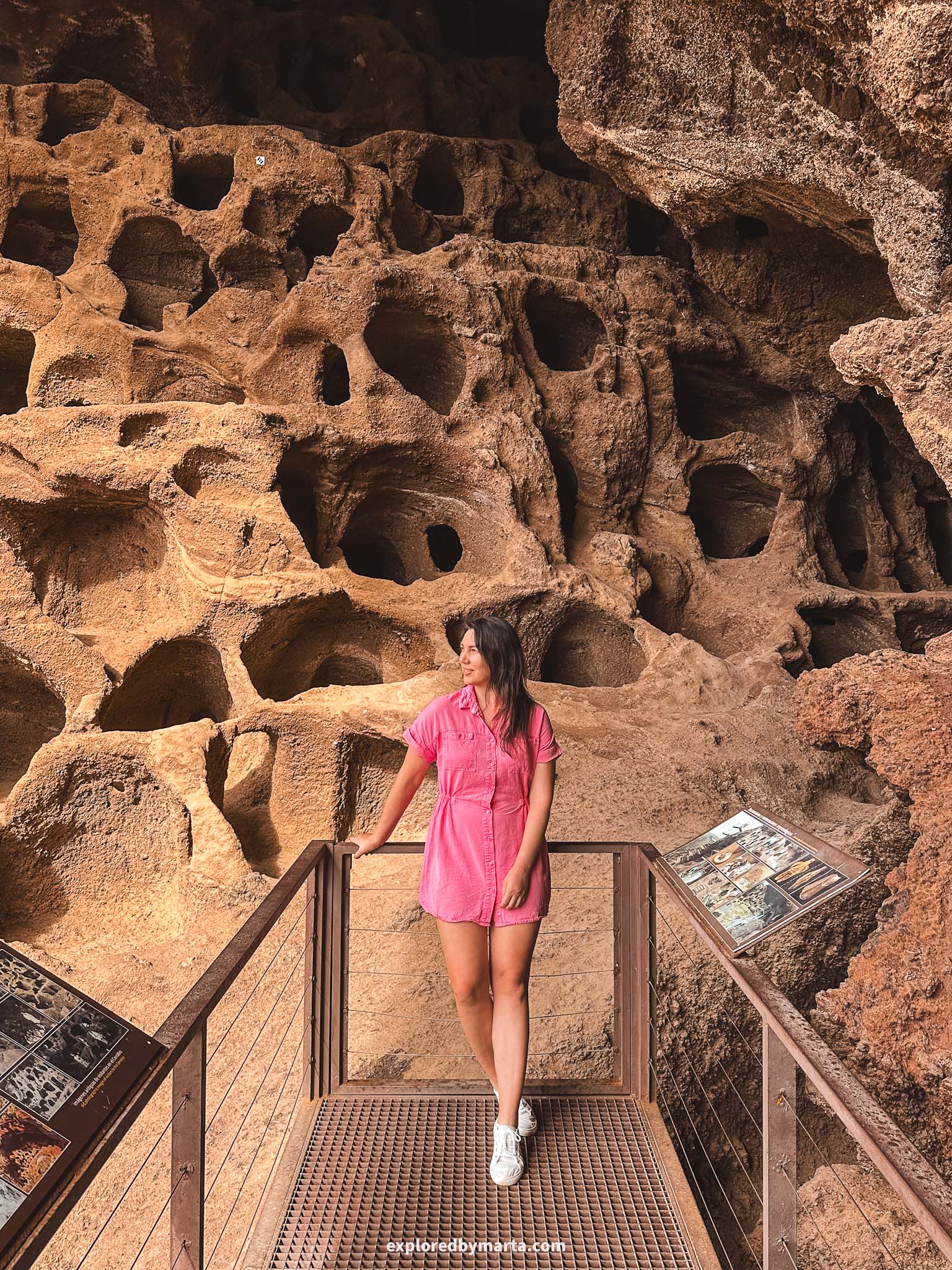
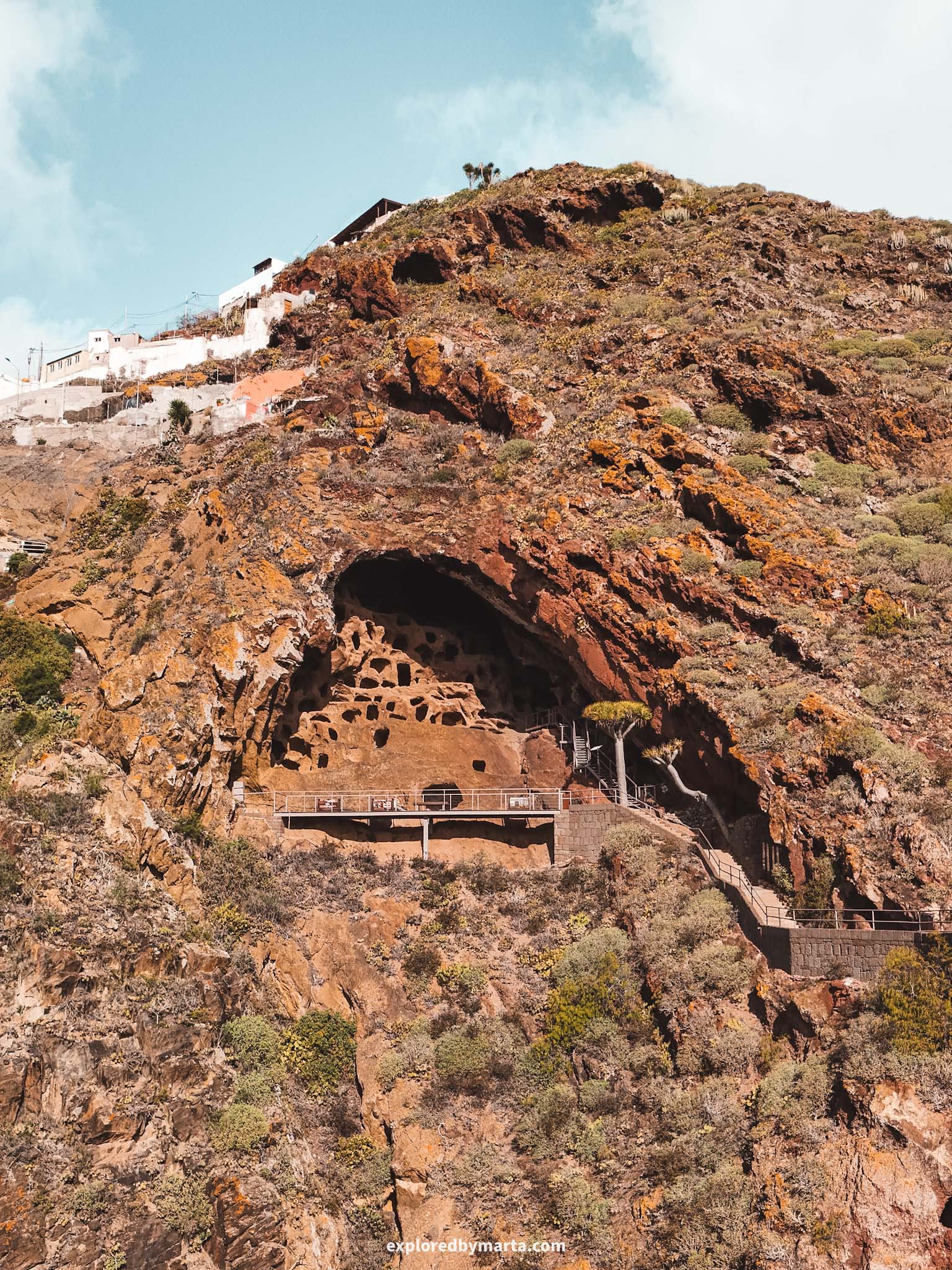
Caves of Valeron or Cenobio de Valerón is a complex of caves carved into the rock in the Northern part of Gran Canaria. It was used as a communal storage place for goods and tools for the indigenous Canarian people.
In my opinion, these were the most picturesque and most beautiful caves in Gran Canaria – not only the caves themselves but also the views over the valley! Such a scenic place!
The Valerón caves date back around 800 years and include more than 350 chambers in this cave complex. This is a popular place to visit among tourists who want to explore how the Guanches lived during the pre-Hispanic era.
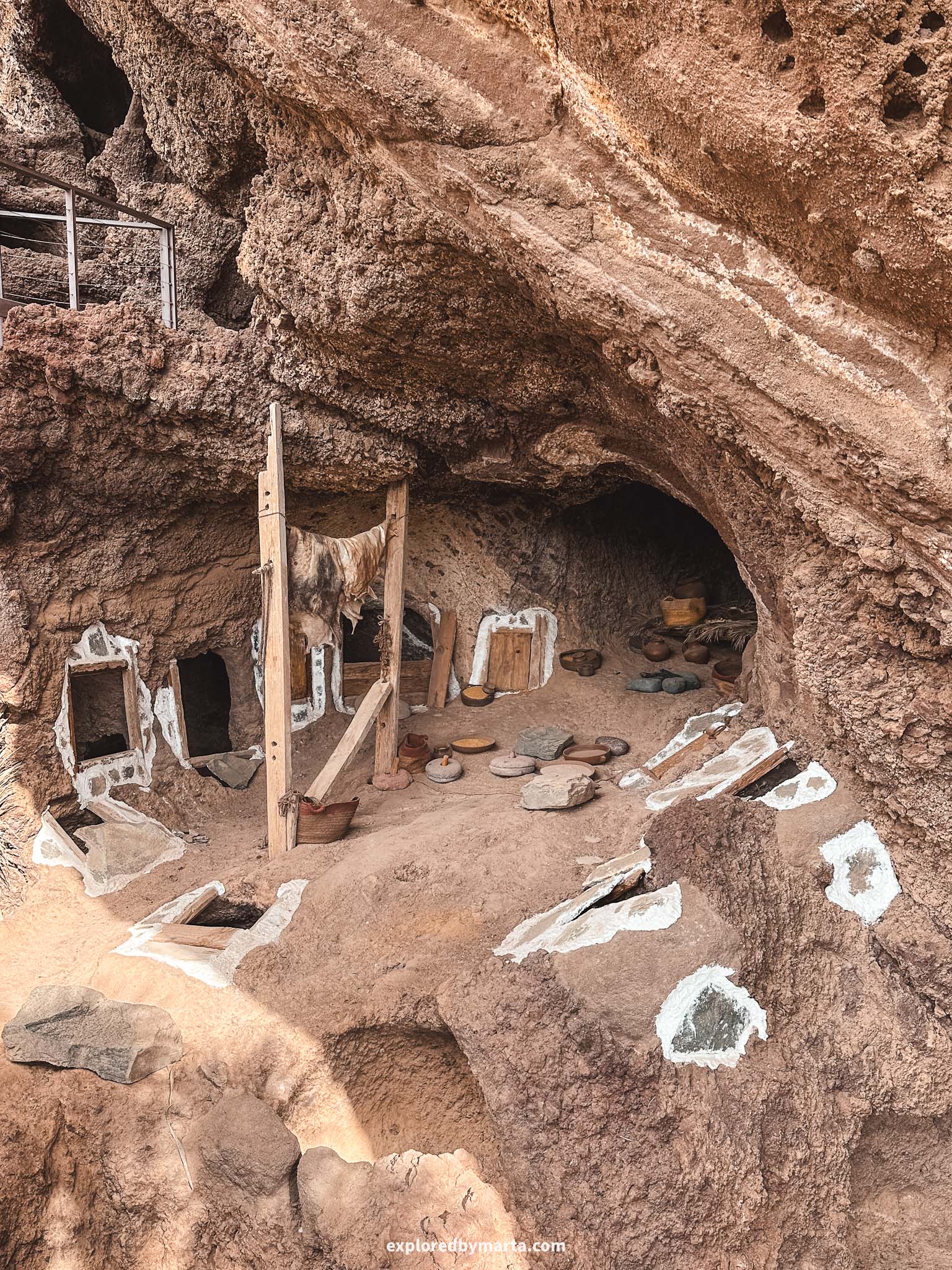
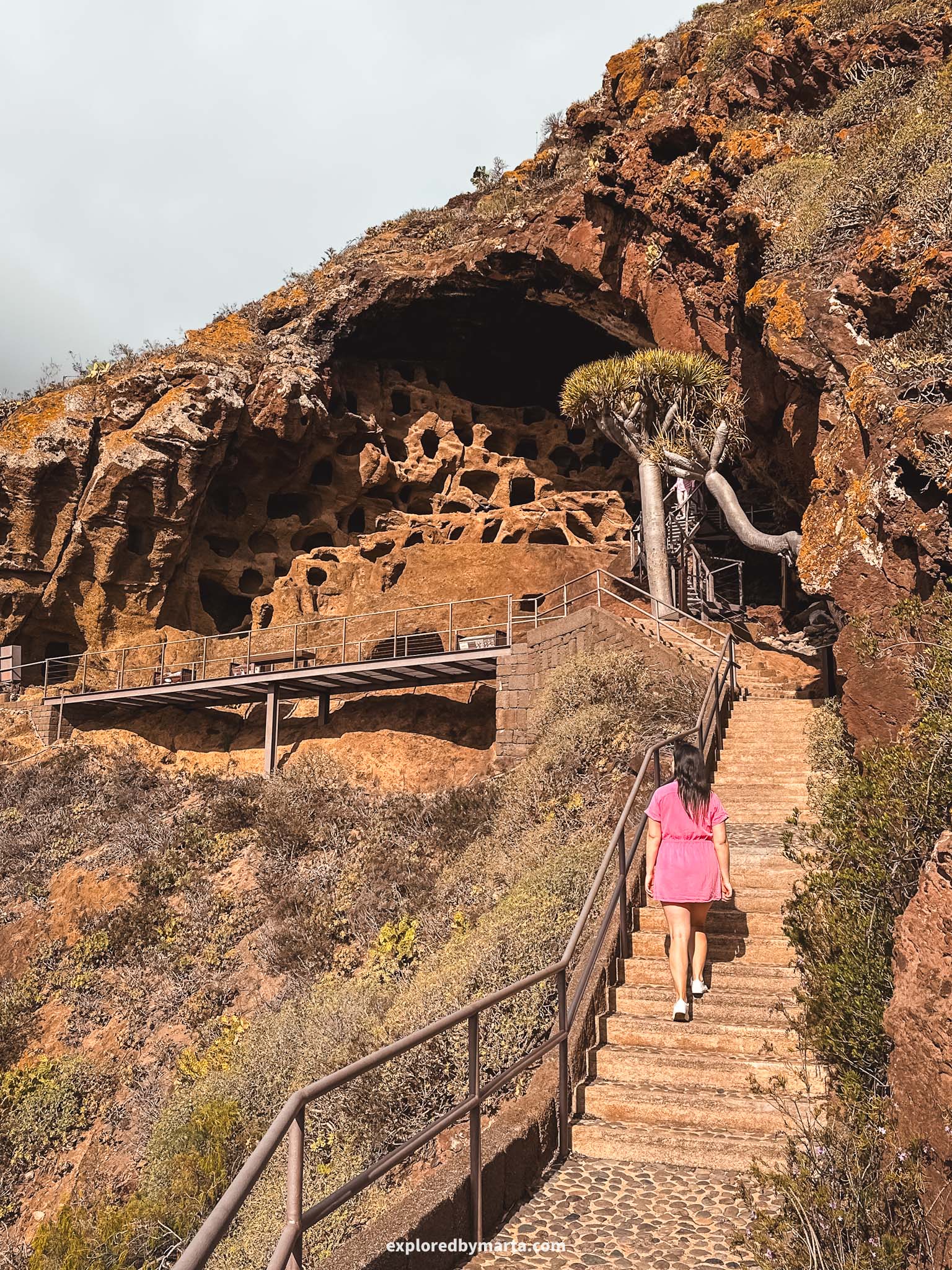
Cenobio de Valerón is perched on a cliffside next to a quiet road, offering impressive views of the valley below. We only spent one hour here exploring the caves, as there isn’t much else to see but I highly recommend including this place in your Gran Canaria itinerary.
To reach the caves, drive to the parking lot next to the road (location below), cross the road, and climb a short staircase to the entrance. From a viewing platform, you can see the cave chambers up close and learn more about them from the information board.
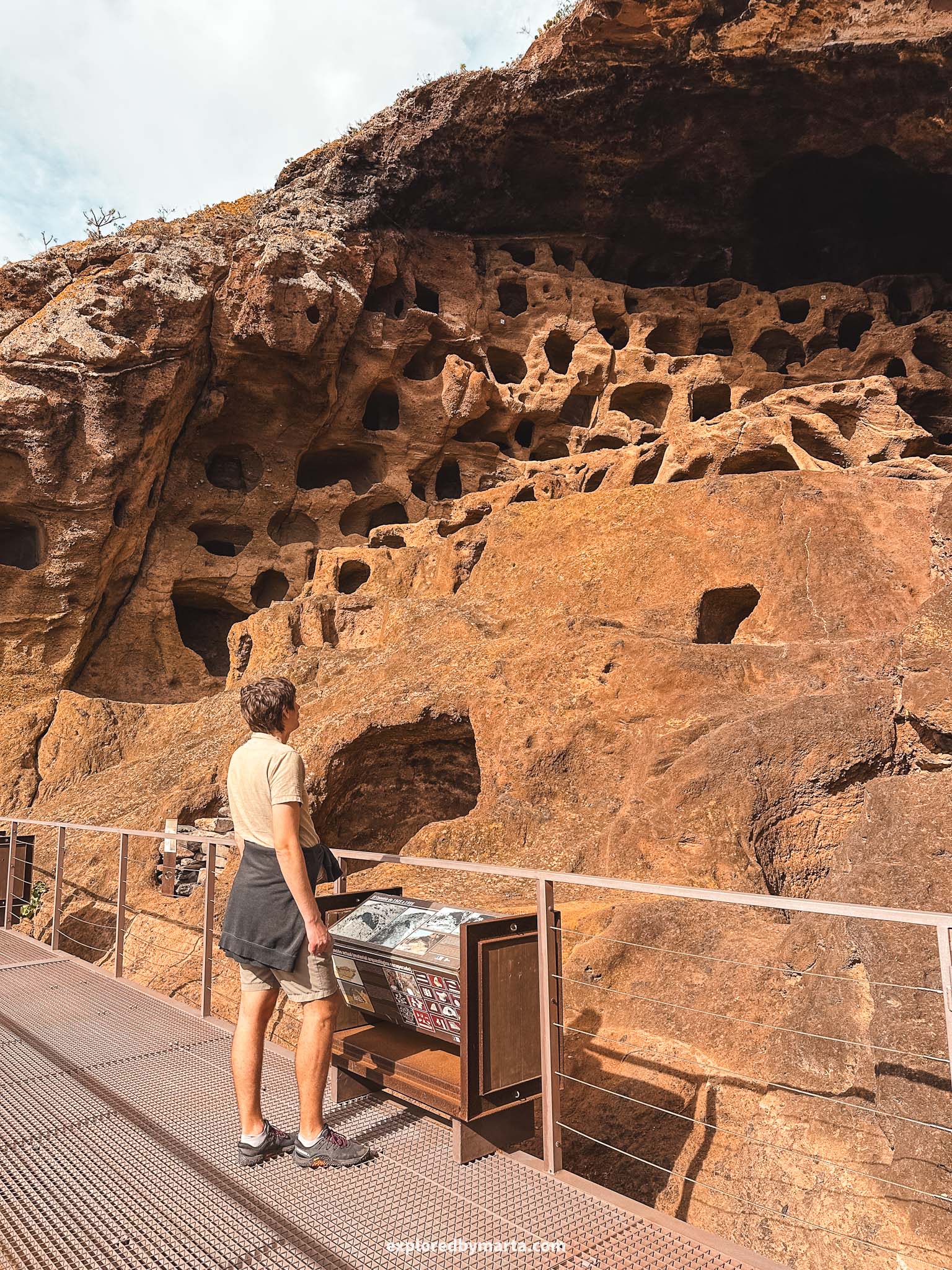
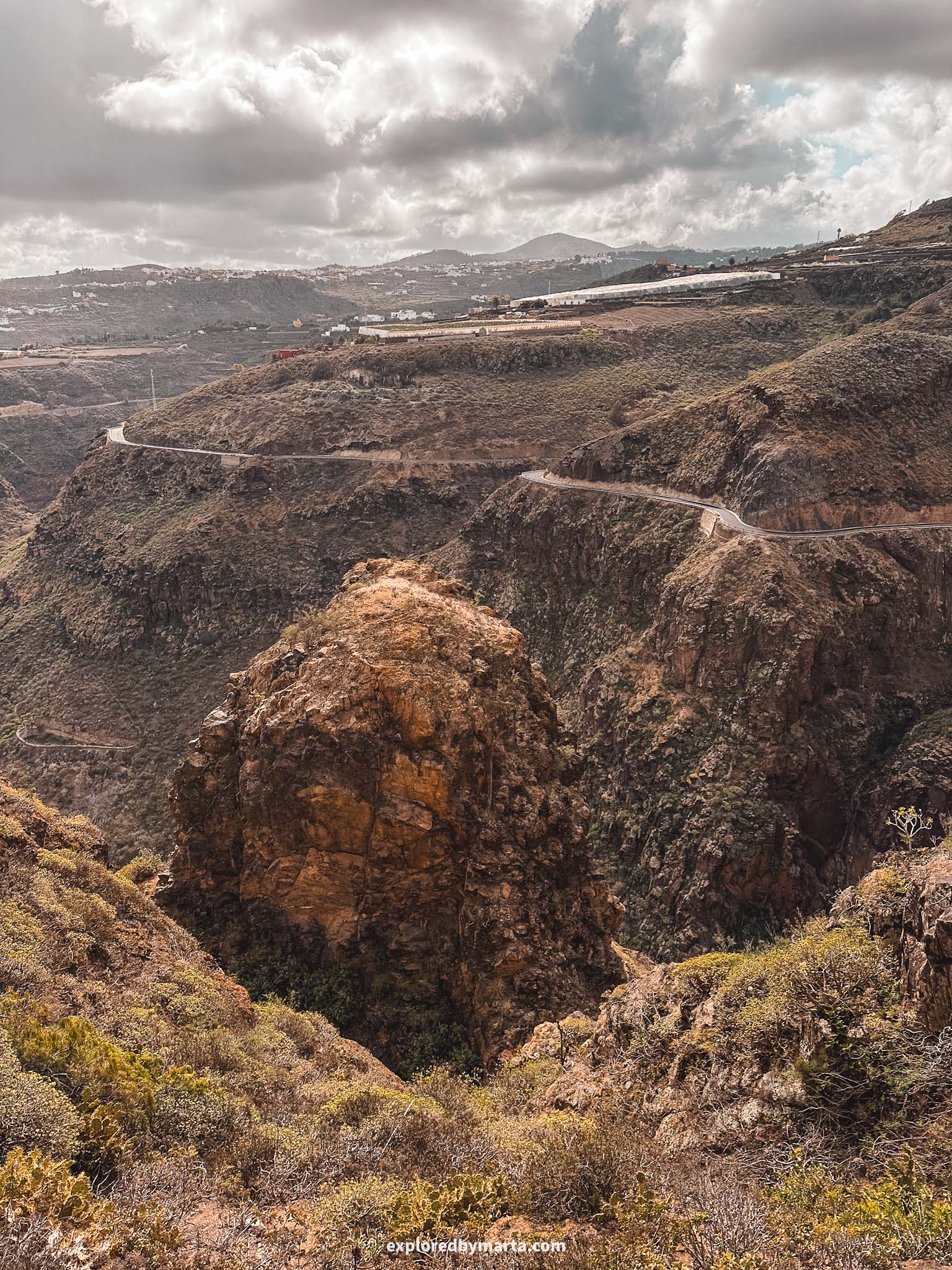
There is also a small aboriginal house along the staircase where you can enter and get a glimpse of how Guanches lived centuries ago. Nothing extraordinary but definitely quite interesting.
Overall, it’s a small but picturesque and beautiful place to visit in Gran Canaria. It’s fascinating to see so many storage caves together – I guess Guanches had a small commune living together around this area so they needed many storage units.
There is also a small entrance fee to the caves which we were able to pay with a card.
Location: Caves of Valeron
16. Vegueta, birthplace of Las Palmas de Gran Canaria
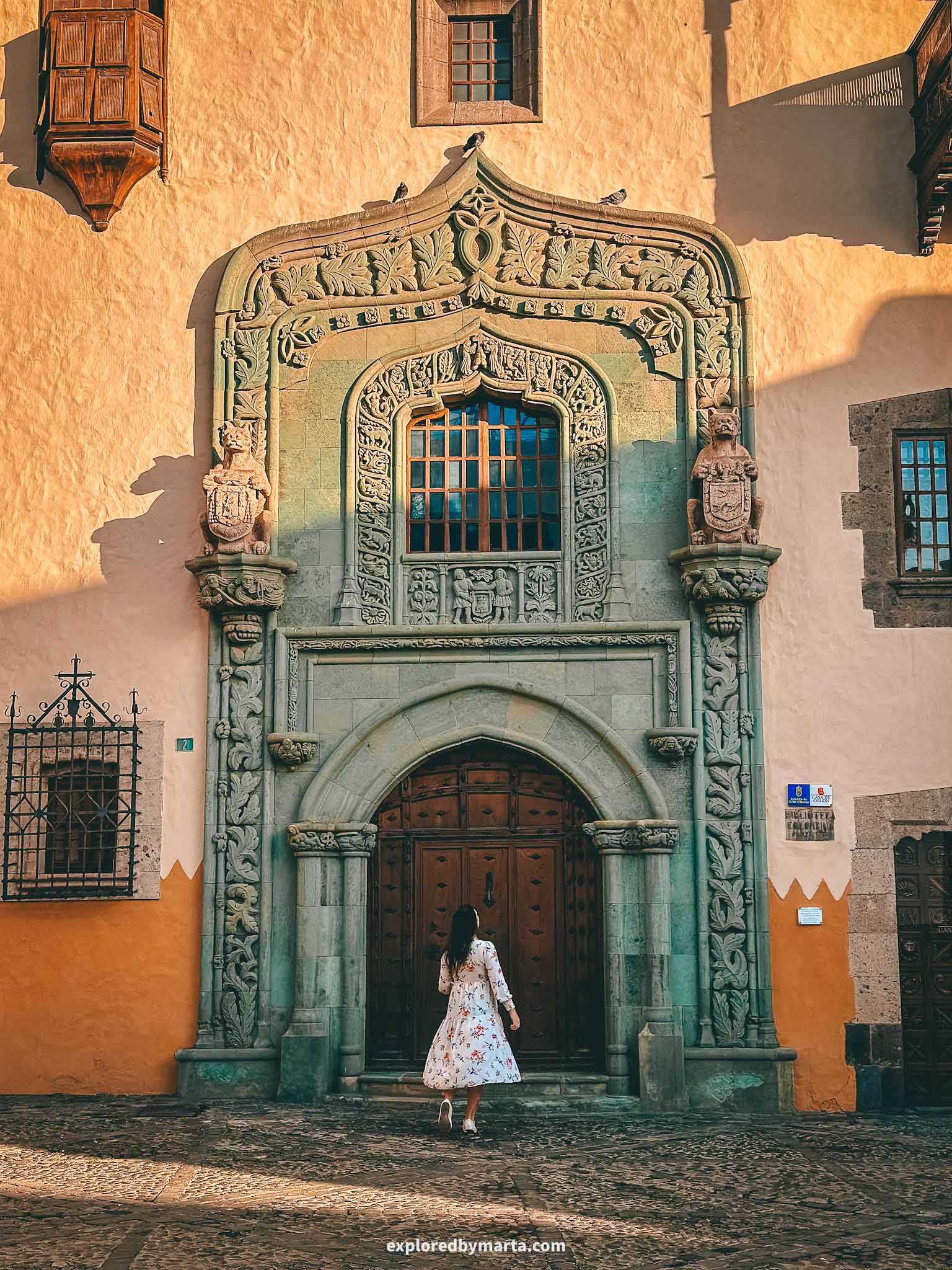

One of the most beautiful places in Gran Canaria is definitely Vegueta, the famous neighborhood in the island’s capital, Las Palmas de Gran Canaria.
Vegueta is the oldest part of the capital, also known as the Old Town. This is where the Spanish conquistadors first settled on the island in the 15th century.
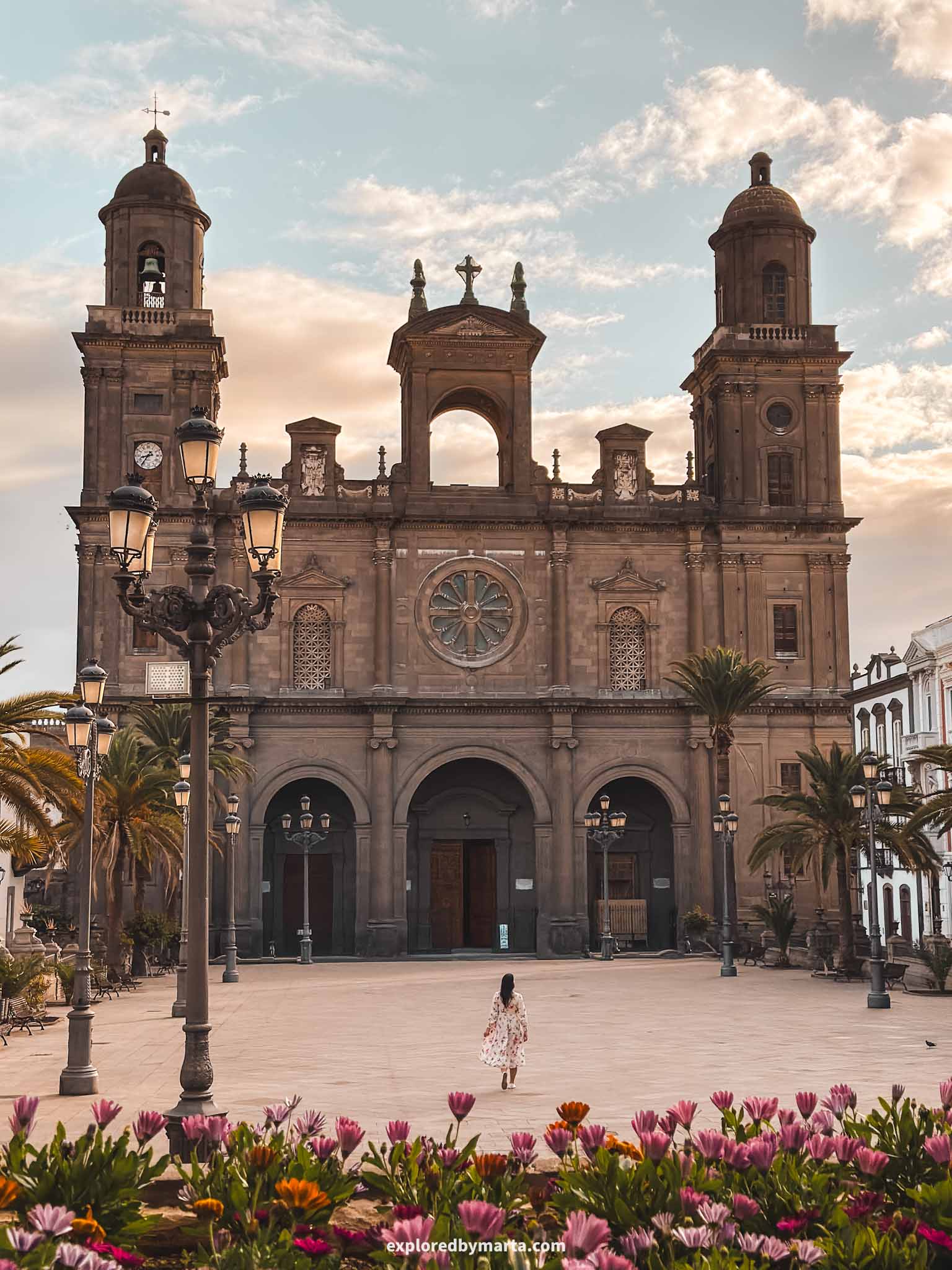

As a result, the Vegueta neighborhood is filled with centuries-old buildings, cobblestone streets, charming squares, and stunning colonial architecture.
Vegueta is rather small so you can easily walk to all the most important places on foot. We arrived here in the morning, parked our car by the Mercado de Vegueta, and started exploring.
The most important places to visit in Vegueta include the Cathedral of Canarias located in front of the beautiful Plaza de Santa Ana Square.

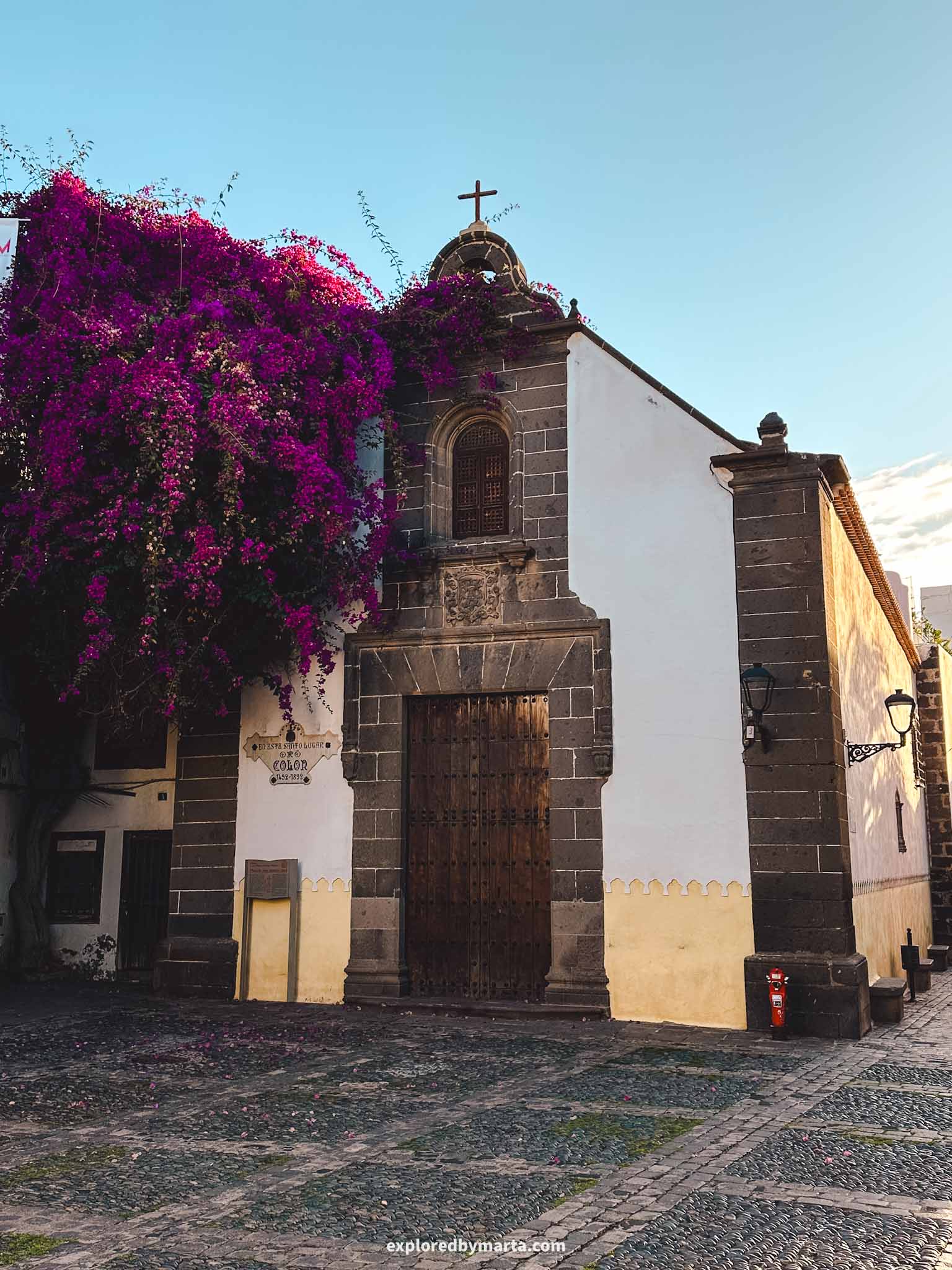
Another must-visit is Casa de Colón, a colonial mansion that Christopher Columbus visited during his stop in Gran Canaria on his transatlantic voyages. This was my favorite building in Vegueta!
Right next to it, you will find a charming street Calle de los Balcones known for its charming colonial architecture, historic houses, and their iconic wooden balconies.
I also liked the beautiful 19th-century Gabinete Literario or Literary Cabinet building right next to Alameda de Colón and the gorgeous amphitheater Teatro Pérez Galdós.
Vegueta is the perfect place to go to explore the island’s rich history, architecture, and culture. Come, drink a morning coffee in a square or a glass of wine on a terrace in the afternoon – Vegueta is definitely a place to enjoy!
Location: Vegueta
17. Pico de las Nieves

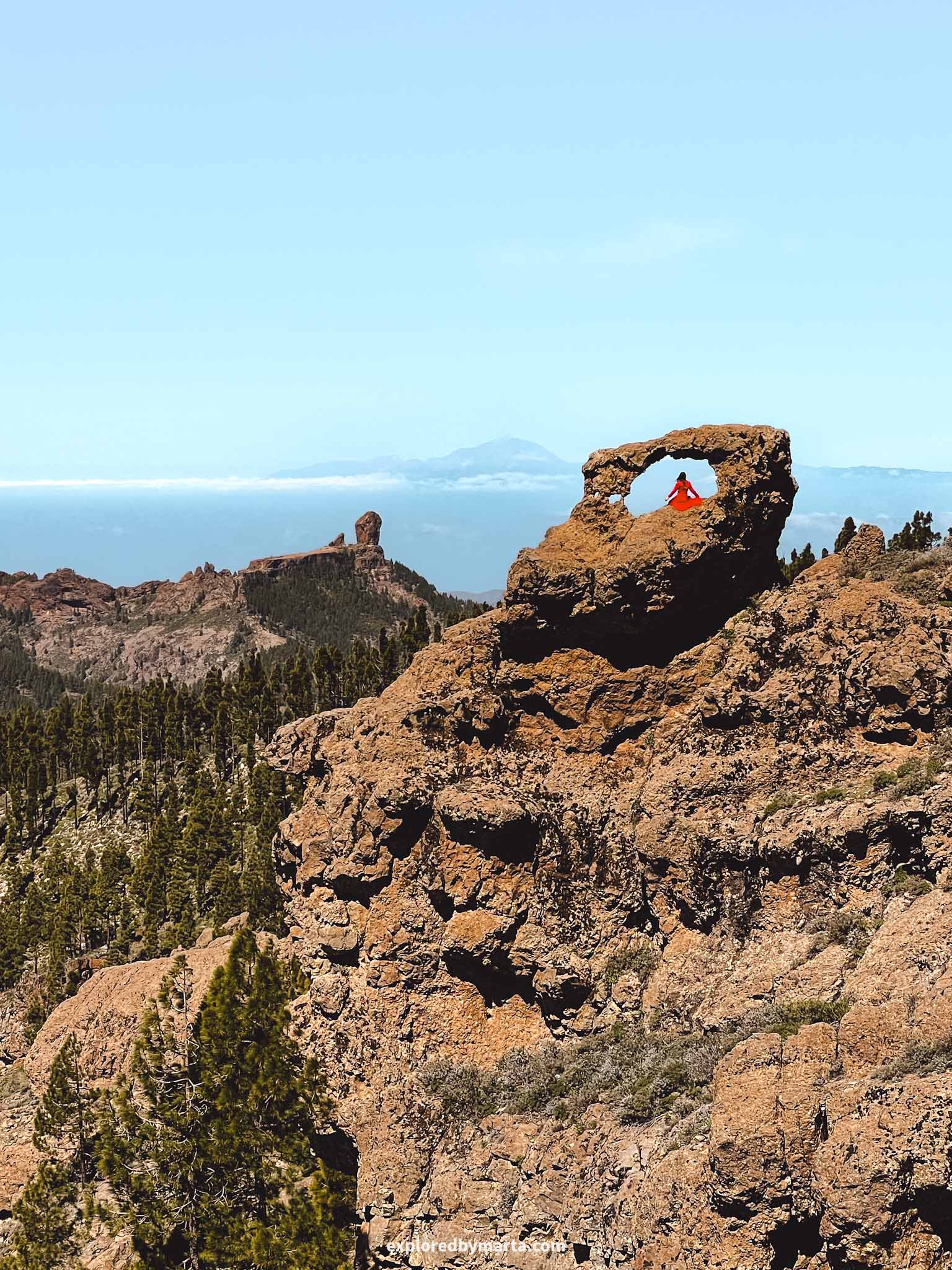
Standing at 1,949 meters, Pico de las Nieves is the highest mountain in Gran Canaria and a must-visit spot on the island, especially since you can easily reach it by car.
At the top of the mountain next to the military base, there is a parking lot where you can stop by and see the whole of Gran Canaria below your feet. It is one of the most beautiful places with the most beautiful views in Gran Canaria!
On sunny days, you can see the entire island of Gran Canaria, as well as the Teide volcano on nearby Tenerife. This place is especially beautiful at sunset when the entire island is painted in golden hues—truly magical!
If you check next to the parking lot, there is a sharp rock formation towering above the heads – this is Morro de la Agujereada rock, the highest point in Gran Canaria. However, you can’t climb it but the views from the parking lot viewpoint are equally beautiful!
Location: Pico de las Nieves
18. Caldera de Bandama
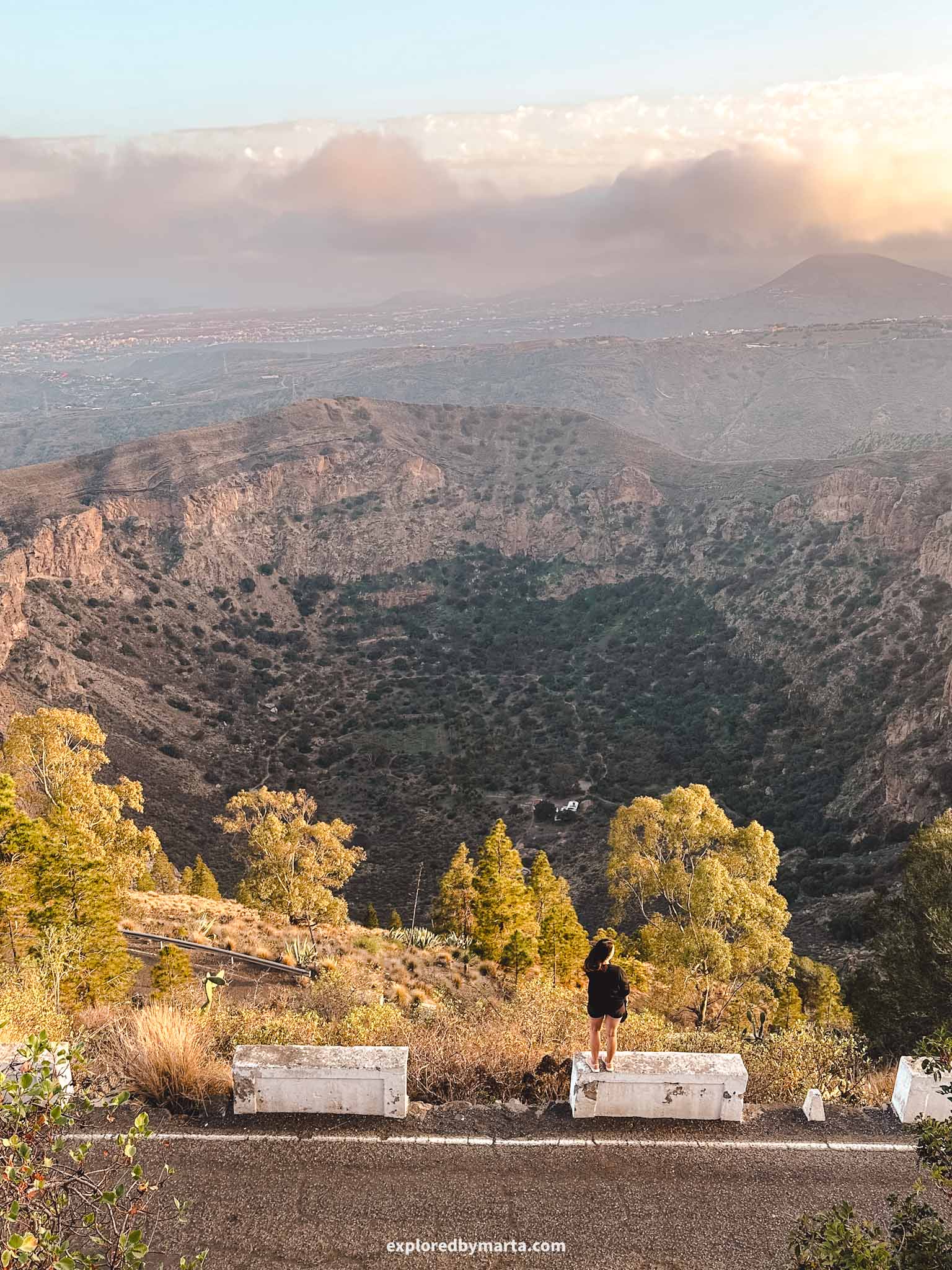
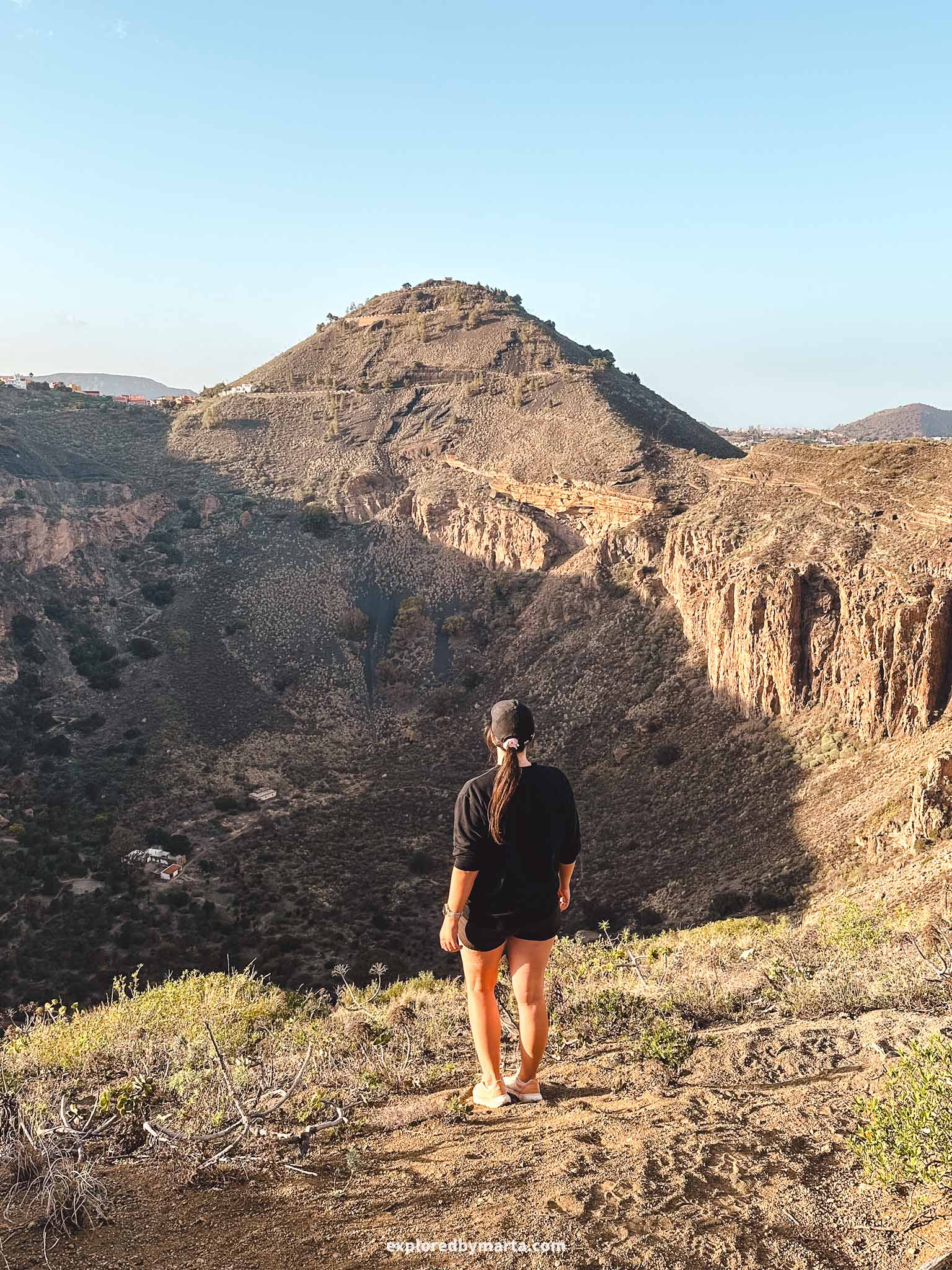
Located near Las Palmas de Gran Canaria city, Caldera de Bandama is a beautiful 1,000-meter-wide and 200-meter-deep crater of a volcano that formed during the island’s most recent volcanic activity.
Standing at 569 meters, is Pico de Bandama—the highest point on the rim of the massive Caldera de Bandama volcanic crater with stunning views of the surrounding area.
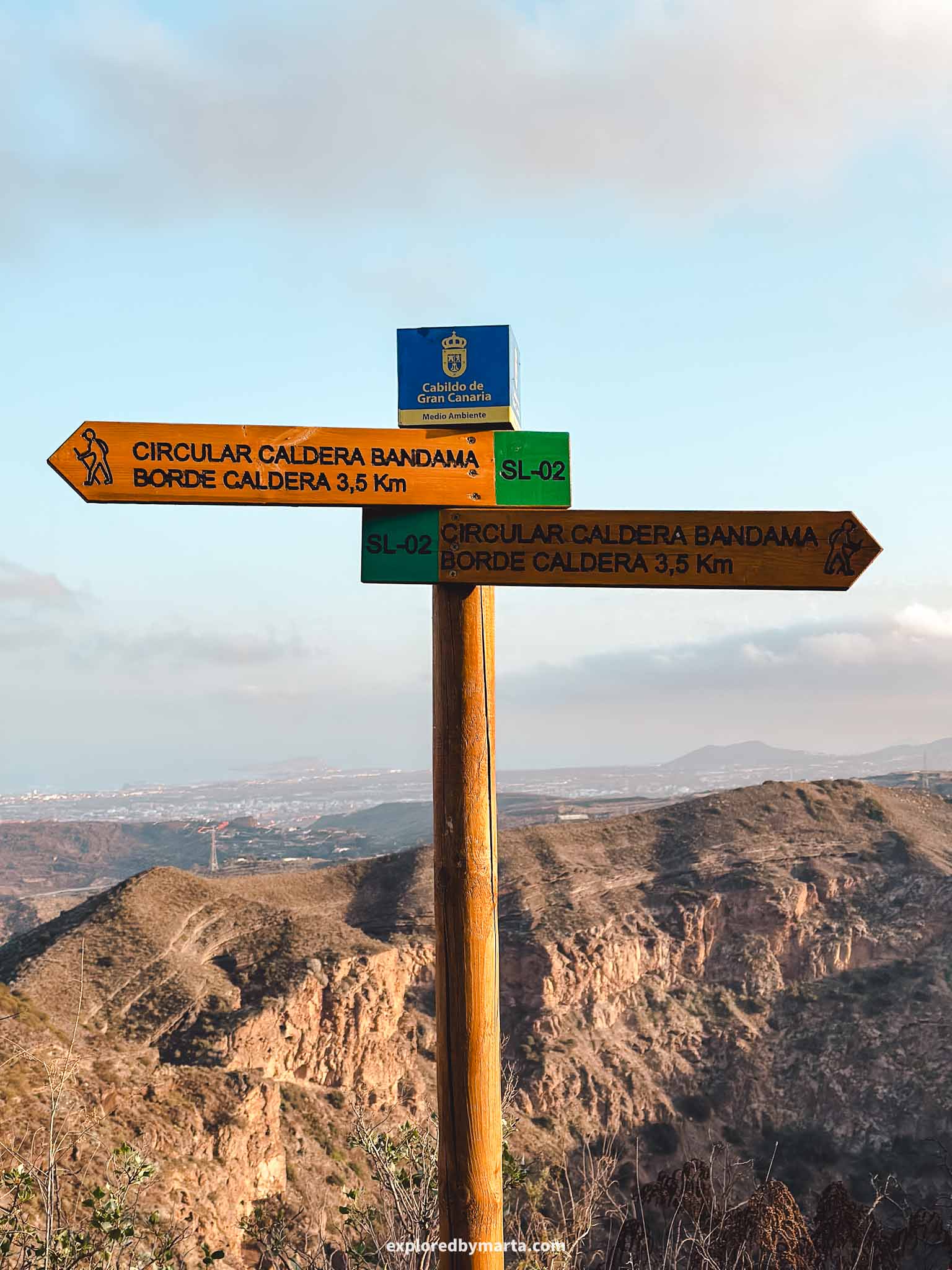
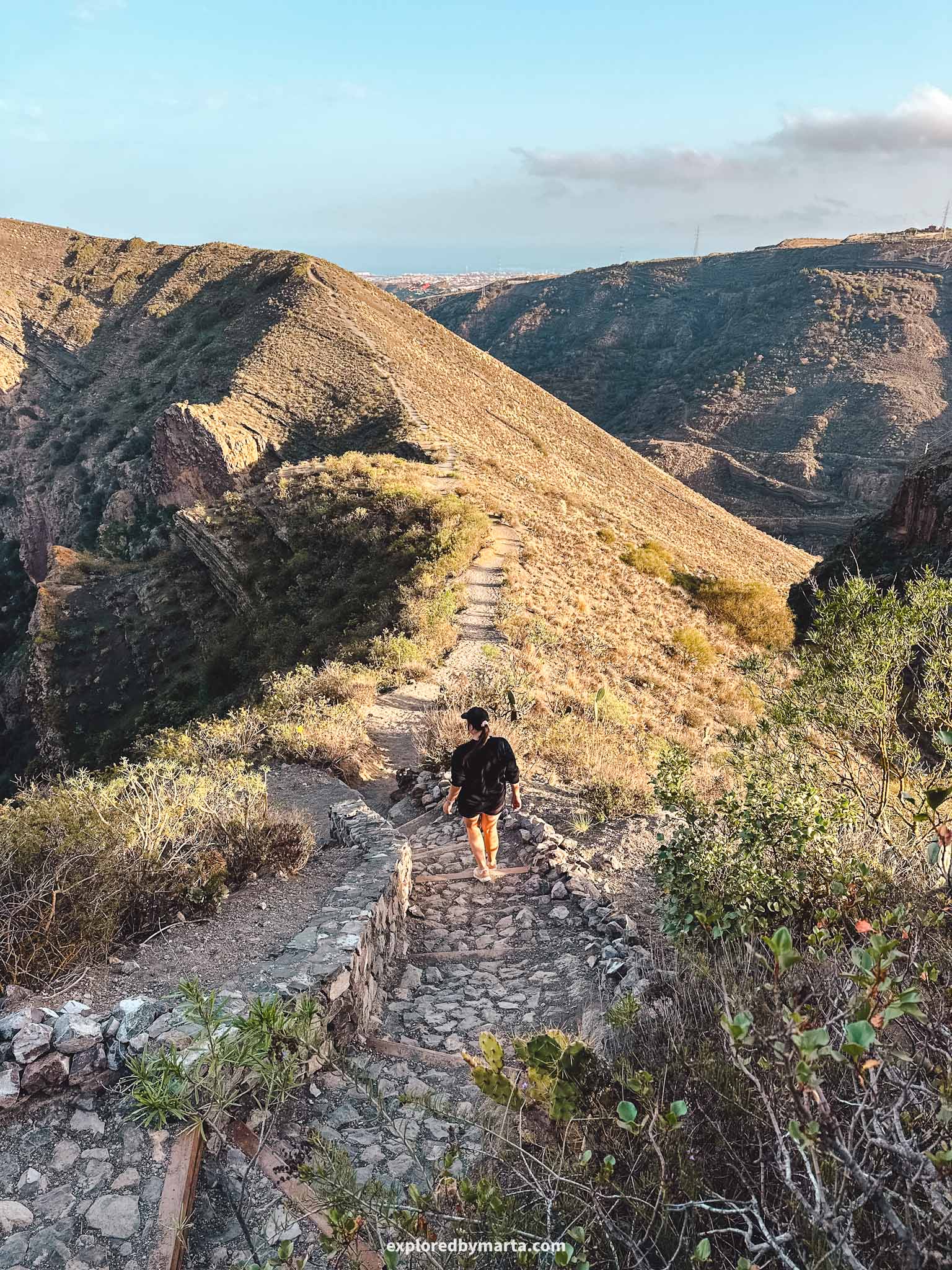
The best part? You can drive all the way to the top of the Pico de Bandama! A parking lot near the summit is just a few meters from the viewpoint.
From this viewpoint, you can see the perfectly circular shape of the Bandama Crater, as well as the views of the surrounding area, including Las Palmas de Gran Canaria, the island’s capital.
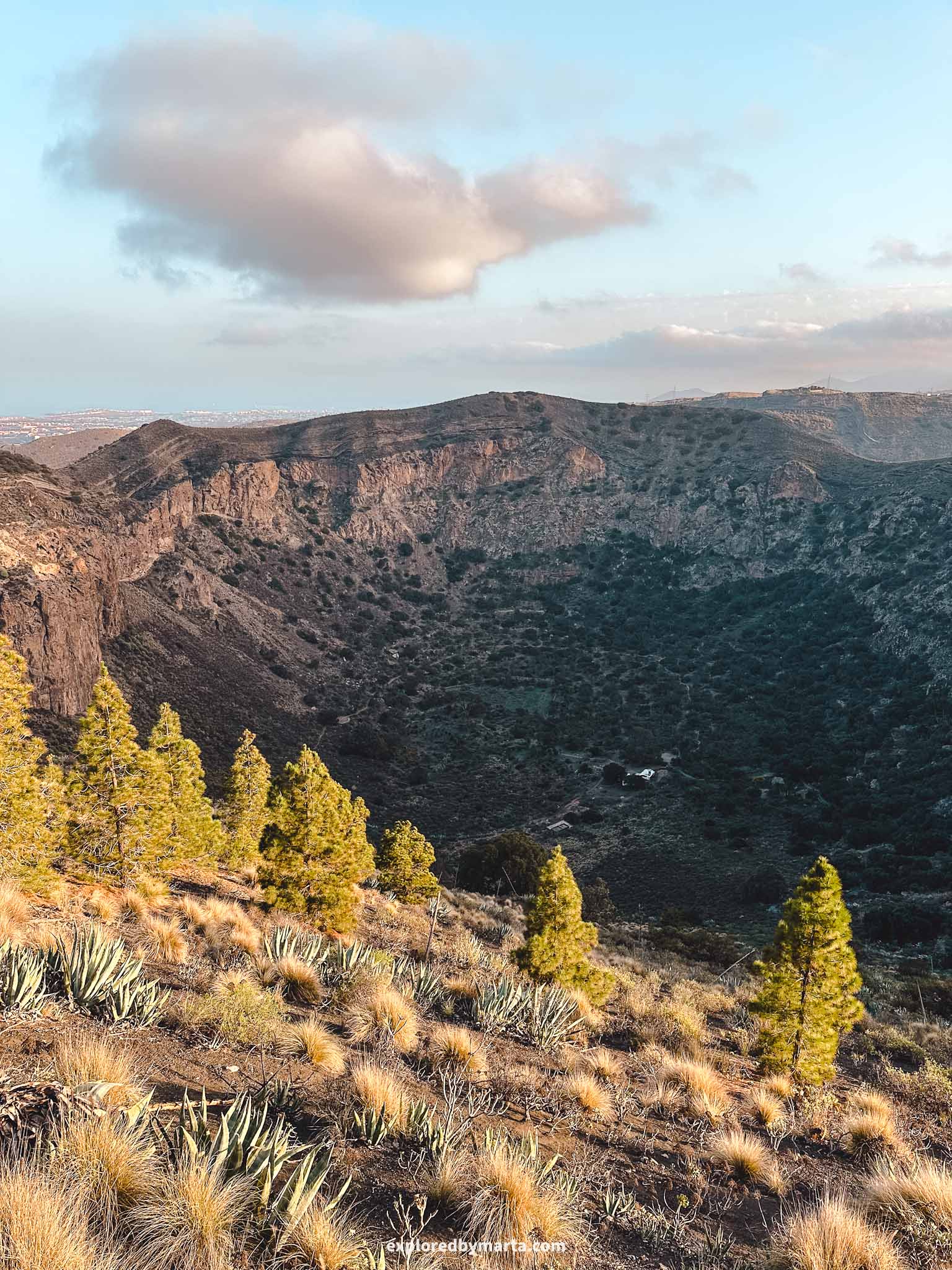

The view is absolutely beautiful, and you should include this place in your Gran Canaria itinerary. If you have more time, I highly recommend hiking around the rim of the crater—one of my favorite hikes in Gran Canaria!
To do this hike, you can park your car at the summit of Pico de Bandama (though that adds some extra elevation gain) or along the northern side of the crater. We parked our car next to the road and started the hike there.
The hike passes a golf club and follows the rim of the crater. If you only hike around it, it’s a 3.5-kilometer route, but it will be more if you hike inside the crater or climb up to the Pico de Bandama summit. We completed the circular hike in about an hour.
Location: Caldera de Bandama
19. Mirador de Cruz de Tejeda

Located in the center of the island, Mirador de Cruz de Tejeda is one of the most famous viewpoints in Gran Canaria. From what I saw, every other visitor to the island managed to stop by this famous lookout point.
However, the viewpoint is just one part of the experience. The Cruz de Tejeda area also features restaurants, hotels, a large public parking lot, and local vendors selling souvenirs and products made and grown in the Canary Islands.
Cruz de Tejeda is also a popular starting point for scenic hiking trails around the mountains. We did the Cruz de Tejeda–Artenara hike which is one of the most beautiful hikes in Gran Canaria. This place is a must-visit!
Location: Mirador de Cruz de Tejeda
20. Agüimes


Agüimes is one of my favorite hidden gems in Gran Canaria. This lovely town has one of the most beautiful old towns on the island, famous for its many bronze sculptures scattered throughout the streets.
The bronze camel statue is the most famous of them all—everyone wants a photo here, haha!
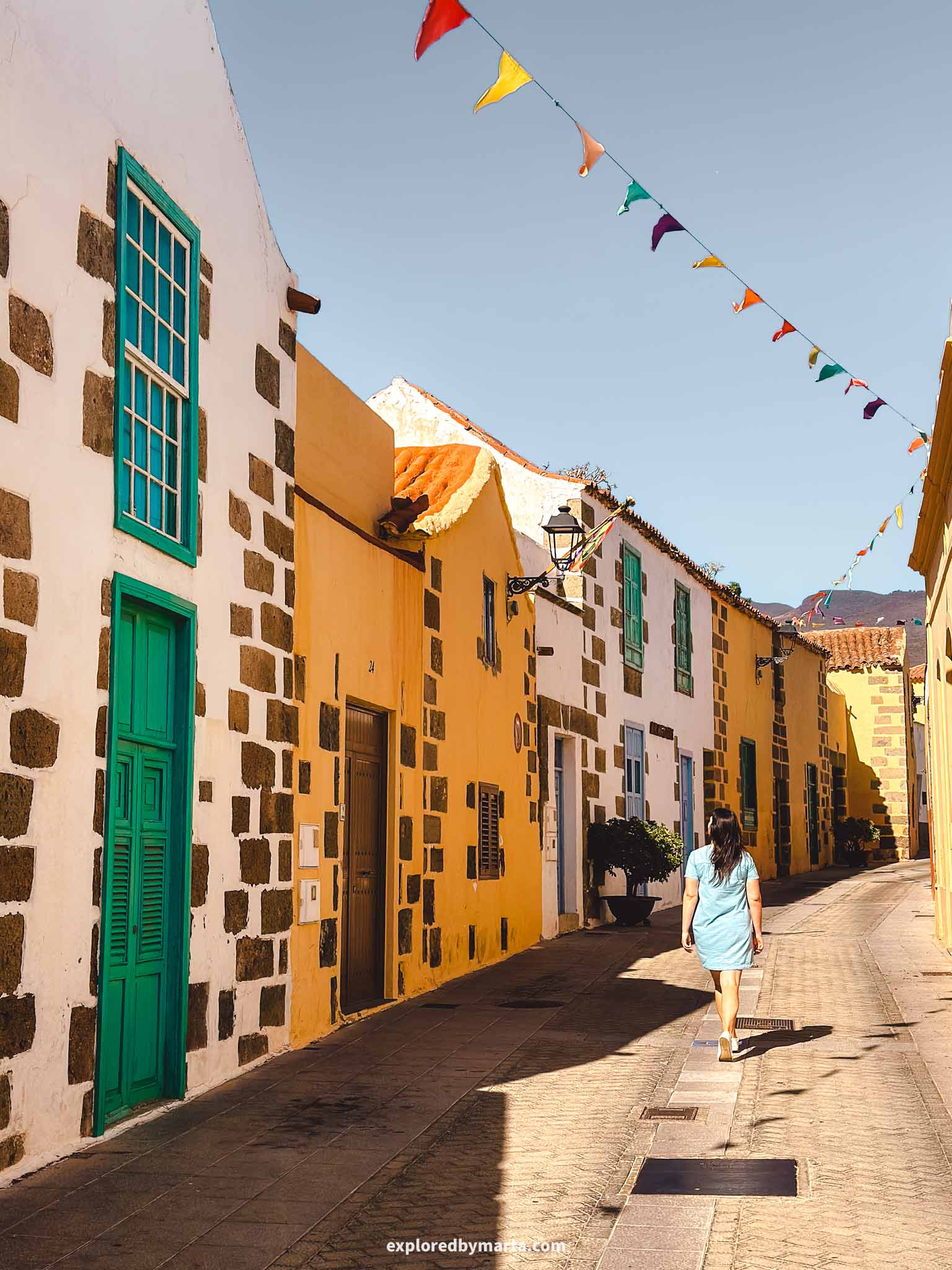

We stopped by Agüimes Old Town for a short stroll through the streets to admire its colorful colonial architecture and check out the beautiful Parroquia de San Sebastián church, which sits right next to the town’s main square, Plaza del Rosario.
The main square also hosts a number of bronze statues all around it, including a donkey, two sculptures paying tribute to the Ancient Carnival, and a sculpture of four men meeting on a bench inside the park.


Another one of my favorites was the Homage to Lovers’ Bench on Callejón del Reloj, featuring two lovers sitting together on a bench.
I absolutely loved this charming town! If you’re doing a road trip around Gran Canaria, I highly recommend stopping by Agüimes for a short stroll through the old town, saying hi to the camel and the donkey, and relaxing at a café next to the central square.
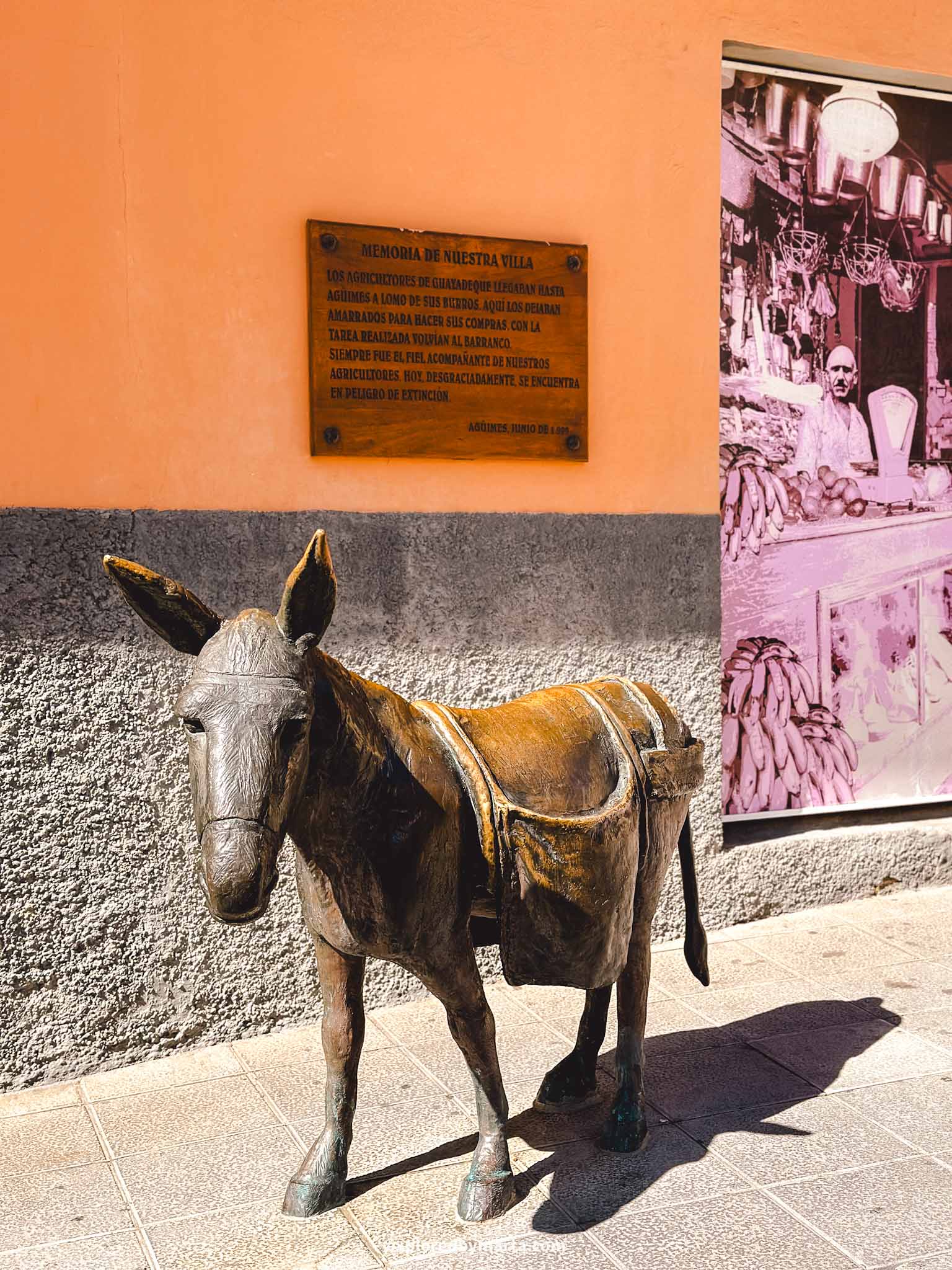
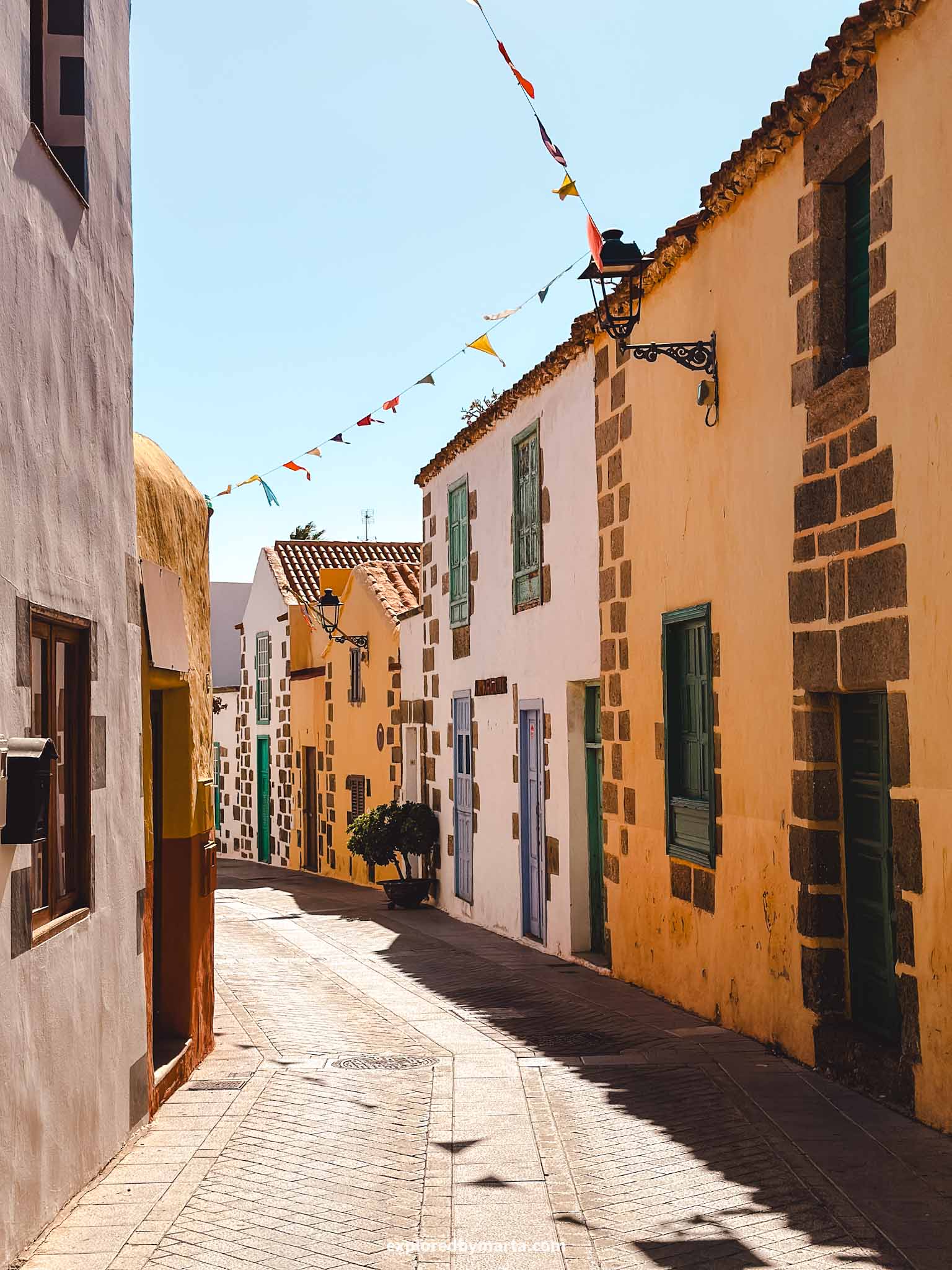
The town is located next to Barranco de Guayadeque, one of the most beautiful ravines in Gran Canaria, home to many aboriginal caves, including Gran Canaria’s famous cave restaurants.
If you can, I highly recommend having lunch at a cave restaurant – one of the bucket list things to do in Gran Canaria! We chose Restaurant Vega, and it was amazing! They serve delicious Canarian and Spanish dishes, and I’d gladly return here one day!
Location: Agüimes
21. Mirador Astronómico de la Degollada de las Yeguas
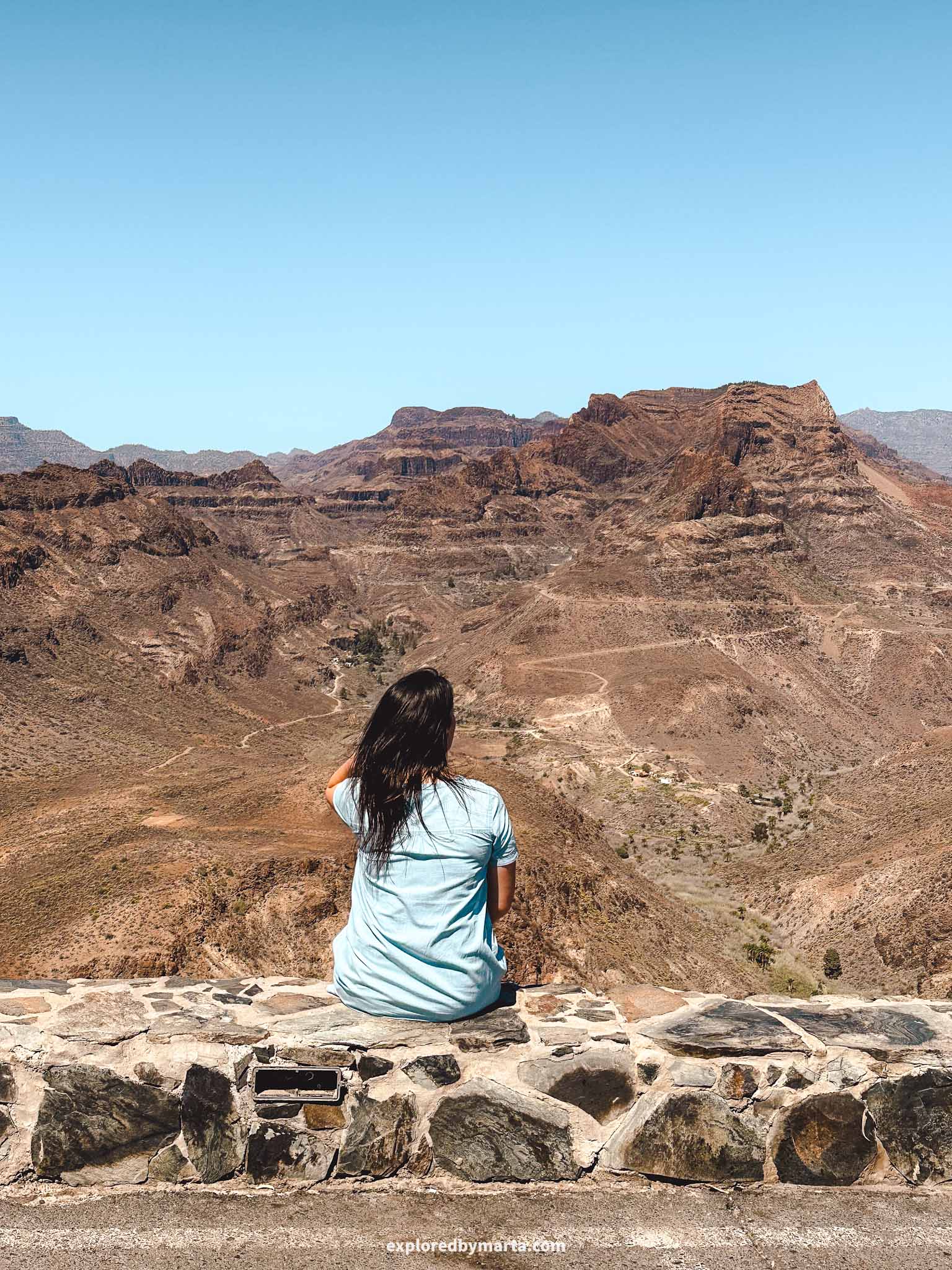
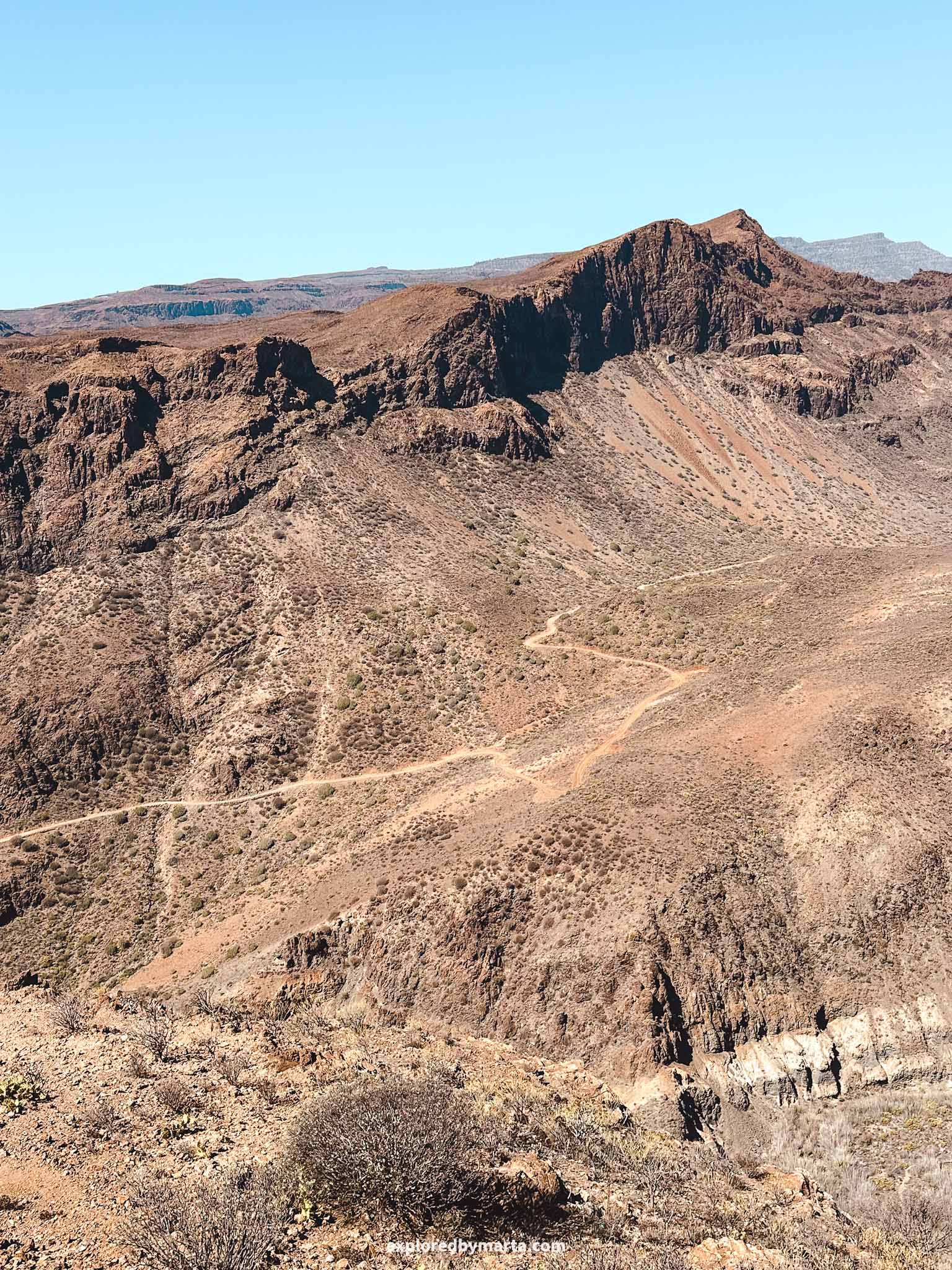
If you are staying somewhere in the south of Gran Canaria, visiting the beautiful Mirador Astronómico de la Degollada de las Yeguas is a must! The viewpoint is located just a 15-minute drive from Maspalomas.
This spot offers fantastic views of the highs and lows of the Fataga Valley, often called the Grand Canyon of Gran Canaria. I won’t be the judge of that—you’ll have to see for yourself! But I will say, it looks pretty impressive!

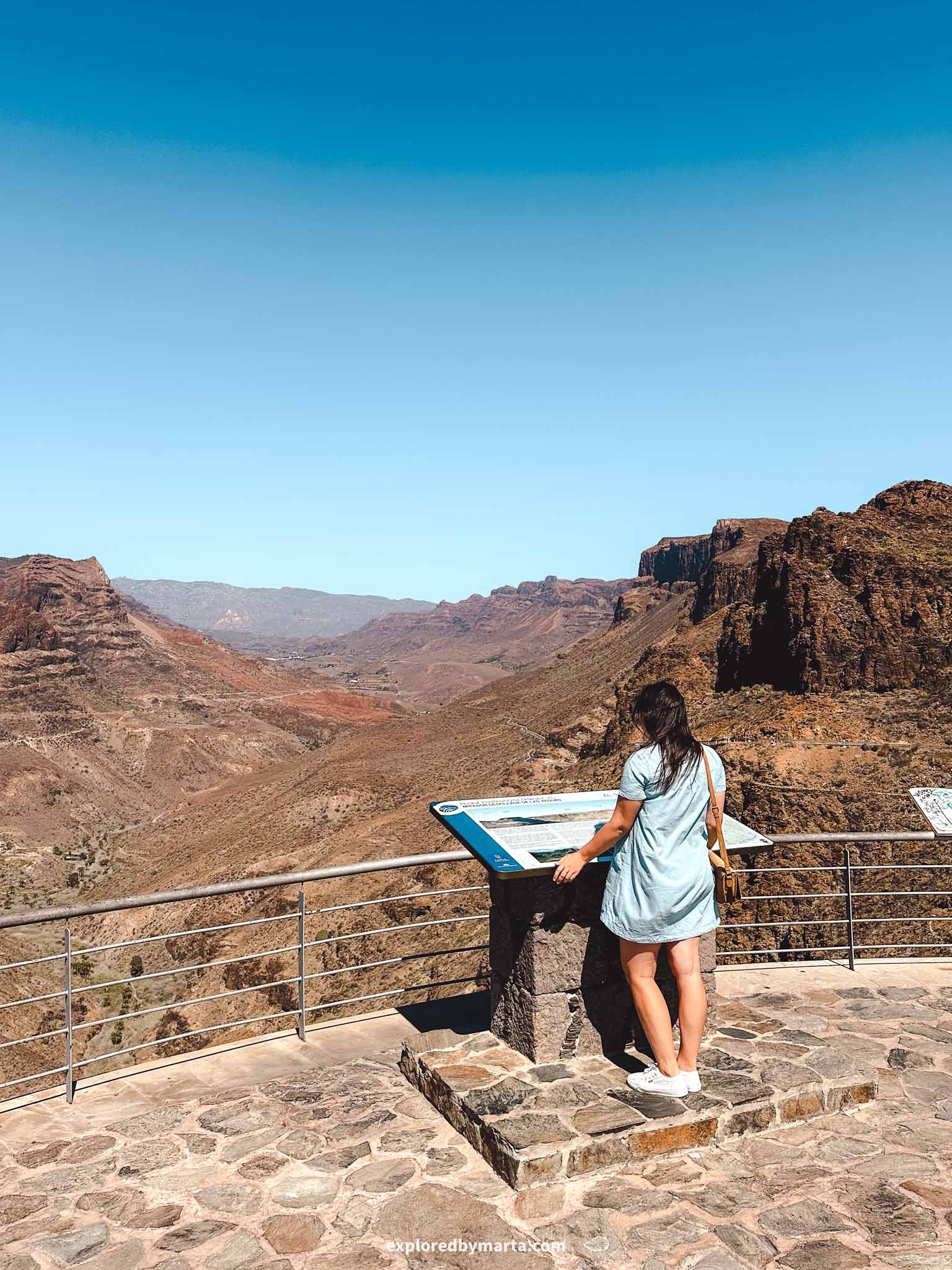
As the name suggests, during the day, it’s all about mountains and valleys, but at night, this place transforms into an astronomical viewpoint. Thanks to its remote location and lack of light pollution, it’s perfect for stargazing!
Did you know that, actually, all the Canary Islands are known as top stargazing destinations (I’ve visited all the islands!)? People travel here for events like meteor showers or to witness other celestial events. Maybe I should add this activity to my bucket list…
Location: Mirador Astronómico de la Degollada de las Yeguas
Happy exploring!
Gran Canaria, the third-largest of Spain’s Canary Islands, is often called a ‘miniature continent’ thanks to its diverse landscapes—everything from golden sand dunes and volcanic cliffs to lush forests and dramatic mountains.
We’ve visited this unforgettable island in the Atlantic Ocean numerous times, often staying for months at a time, yet there are still many more beautiful places in Gran Canaria to discover!
What I love most about Gran Canaria is that it offers exactly what your heart desires—whether it’s relaxing on sandy beaches, hiking epic mountain trails, exploring charming historic villages, or embarking on exciting road trips along the rugged coastline.
I hope you enjoy this island as much as we did!
PIN FOR LATER!
